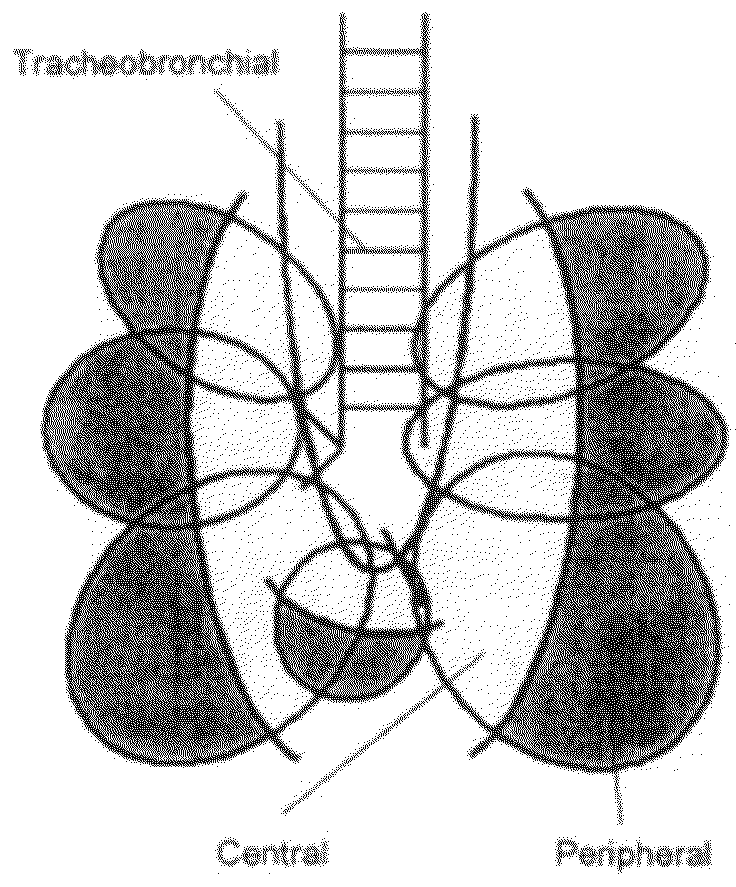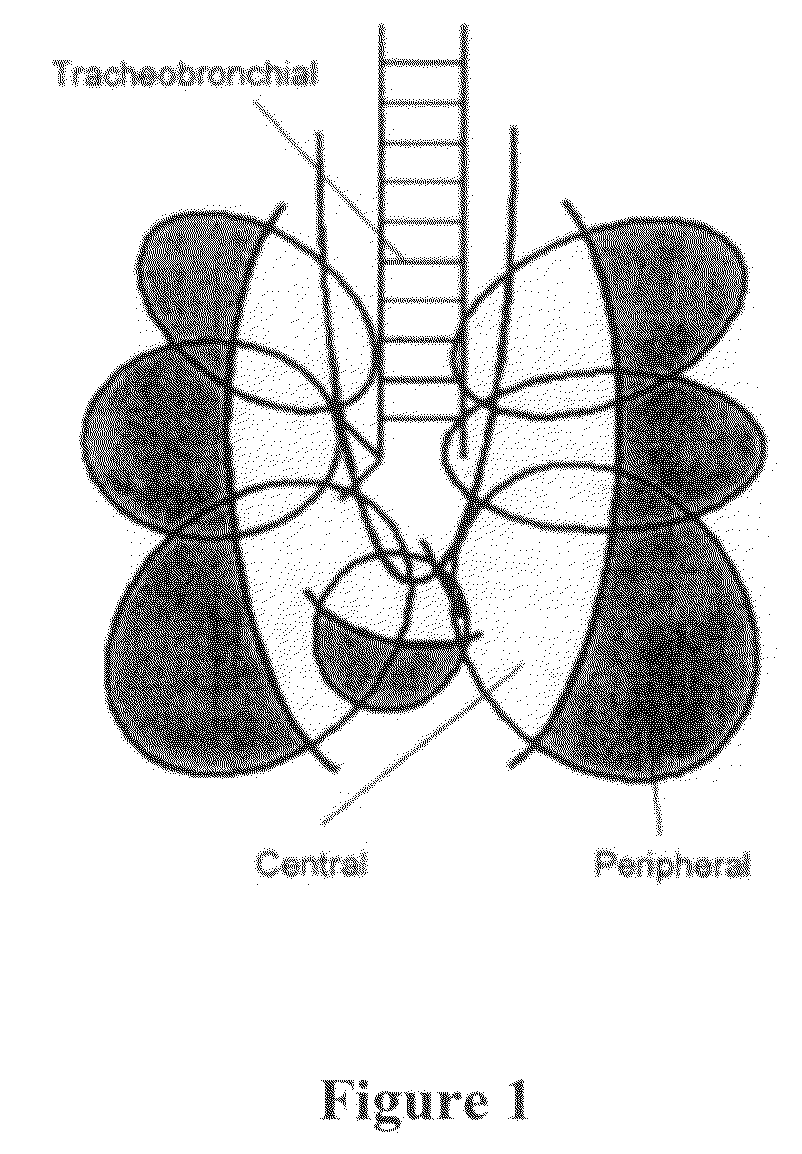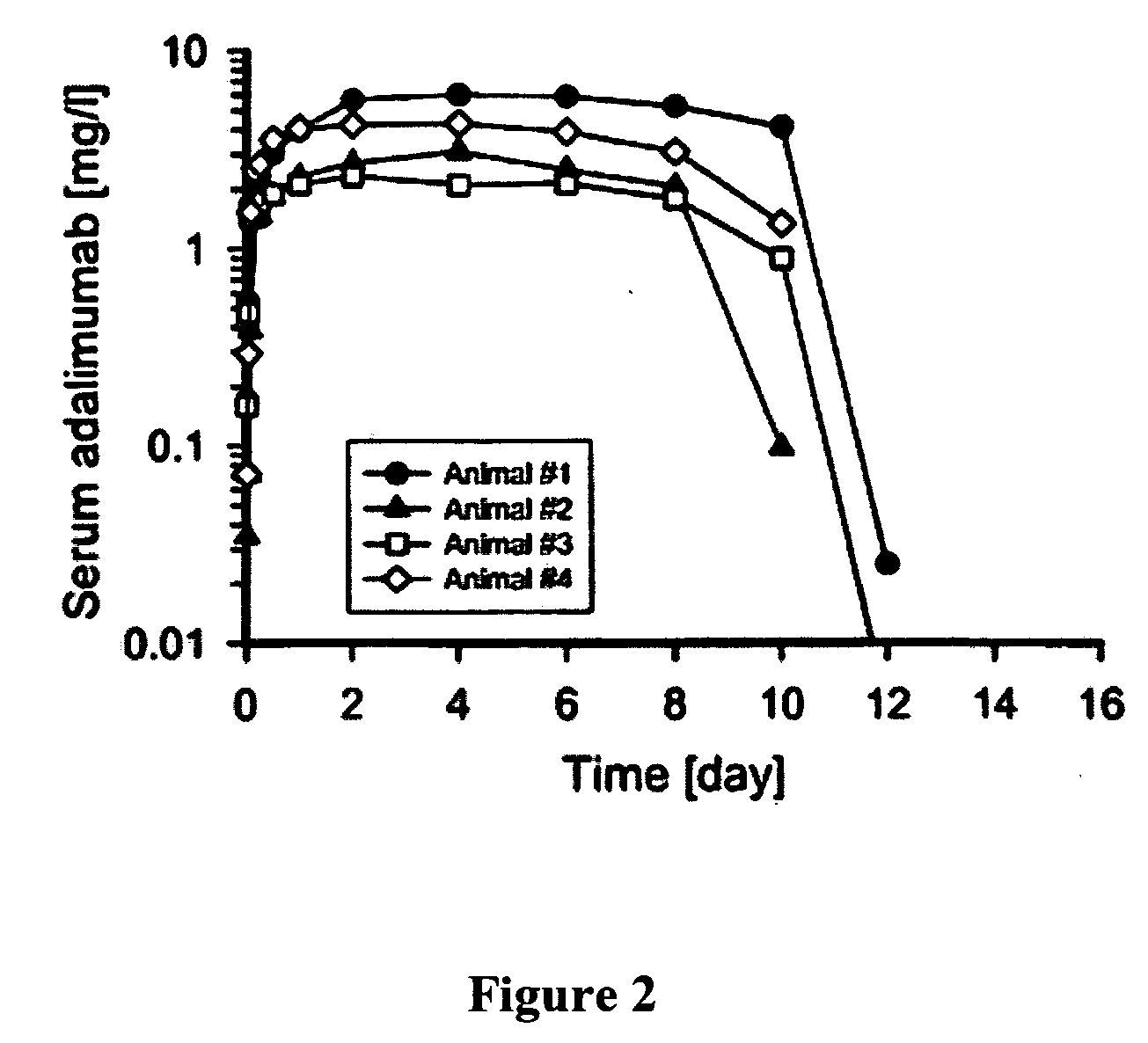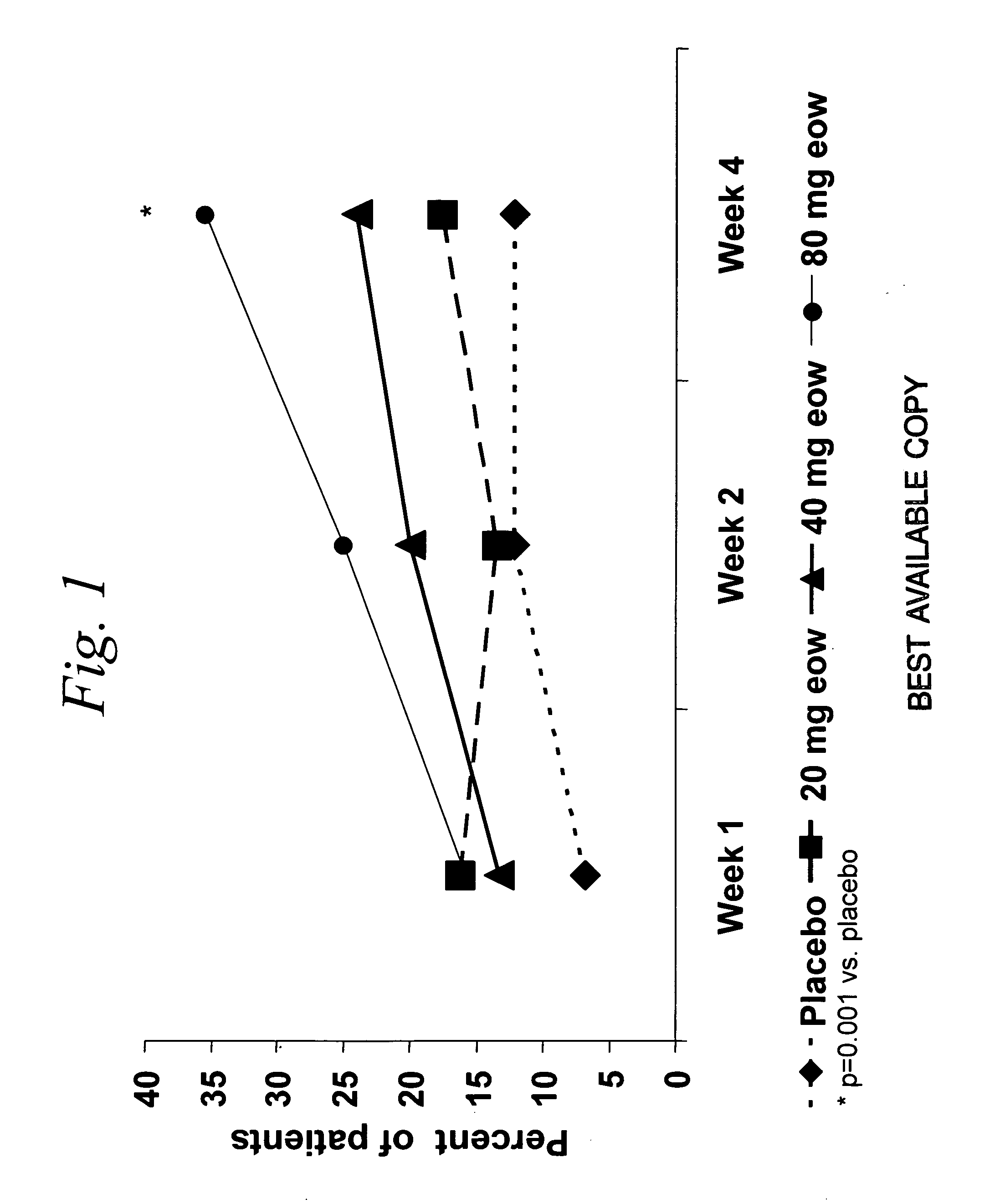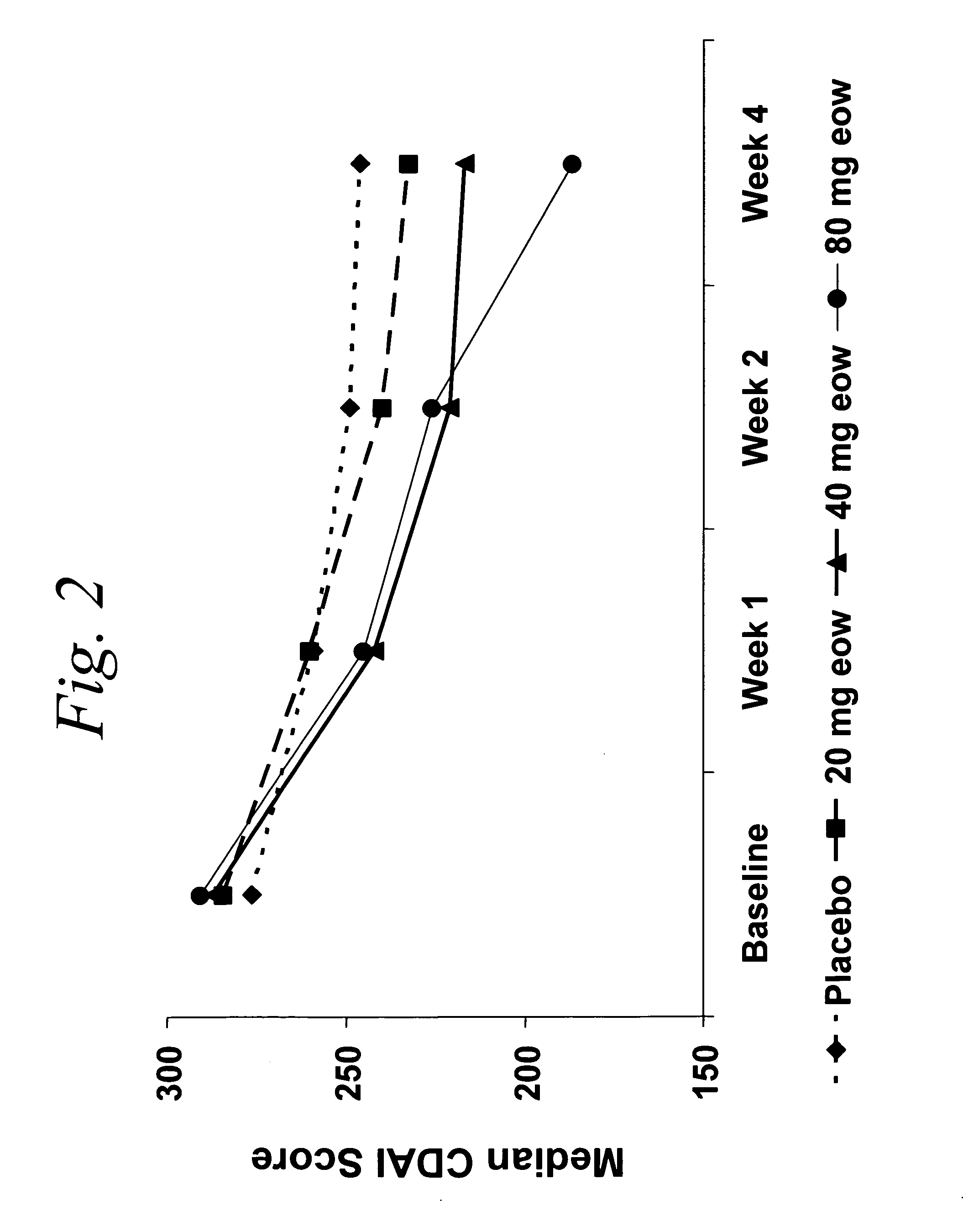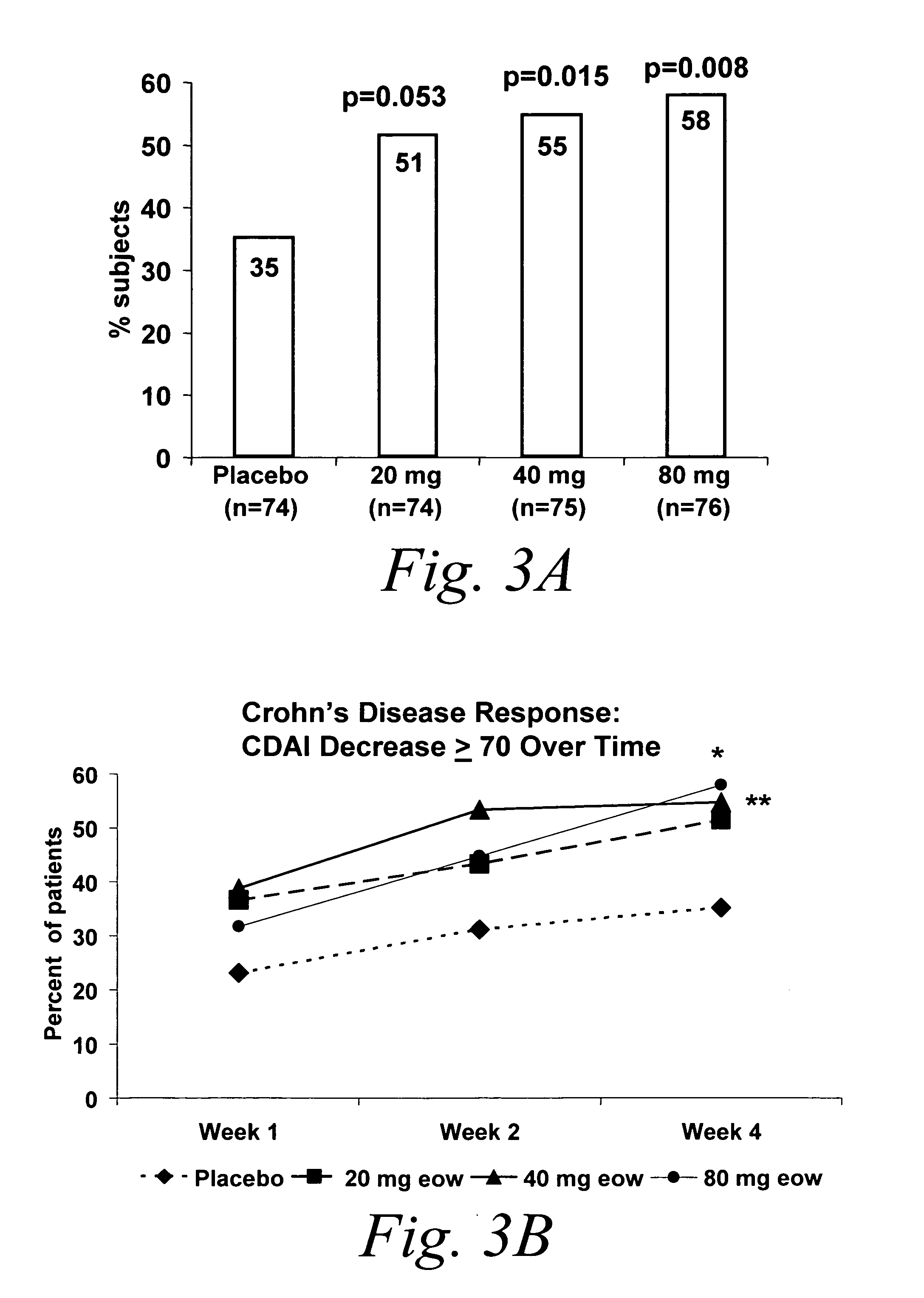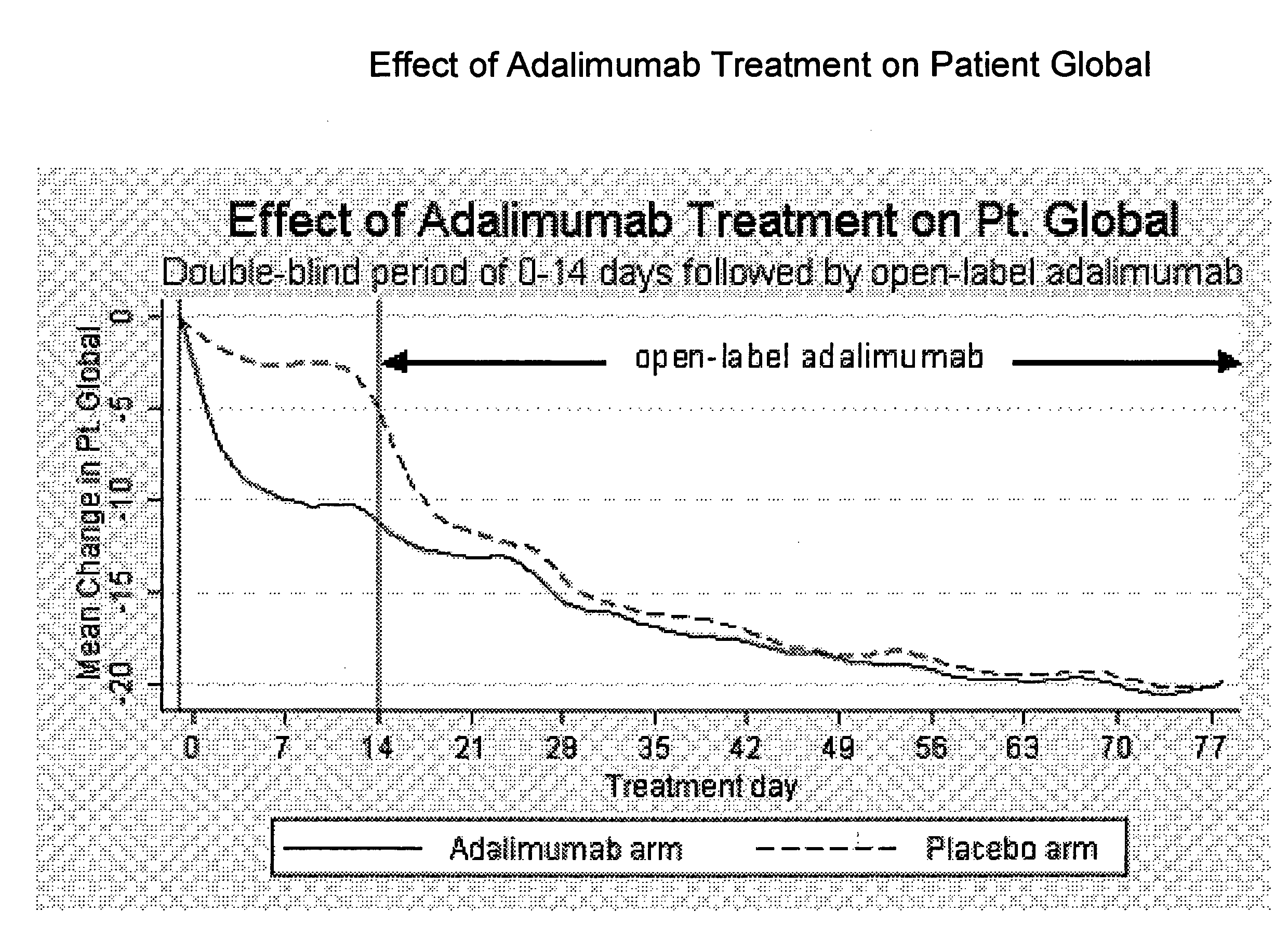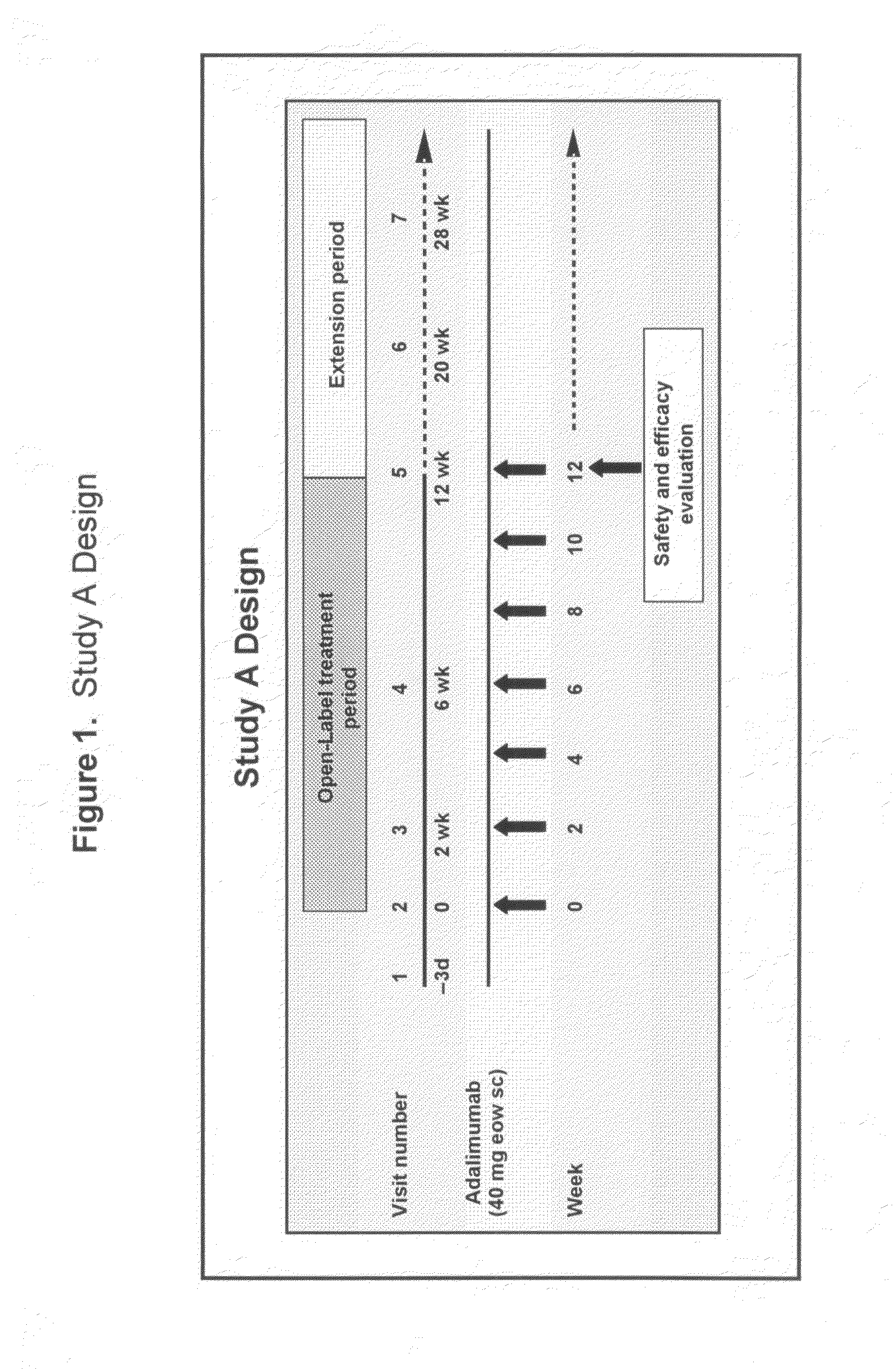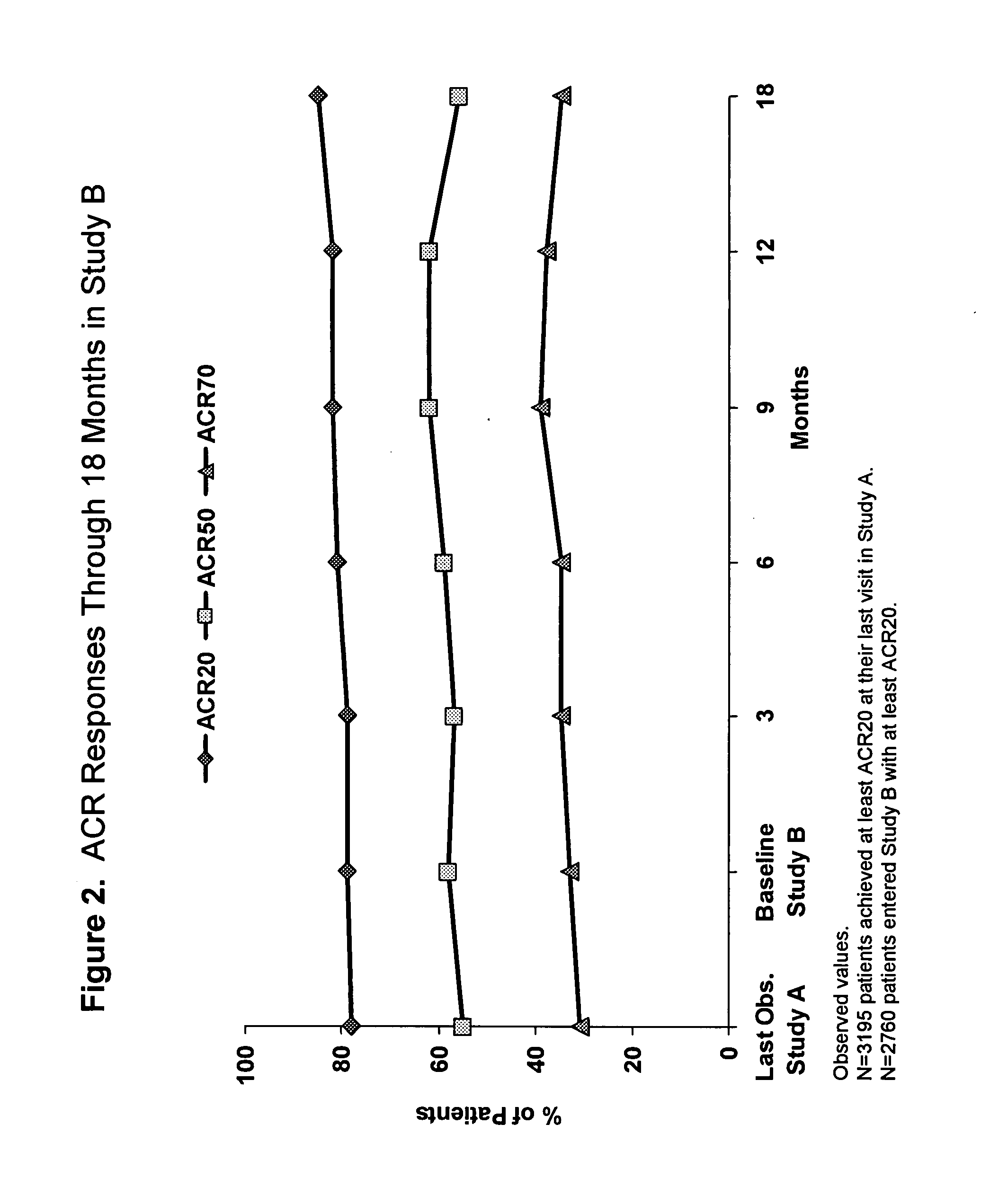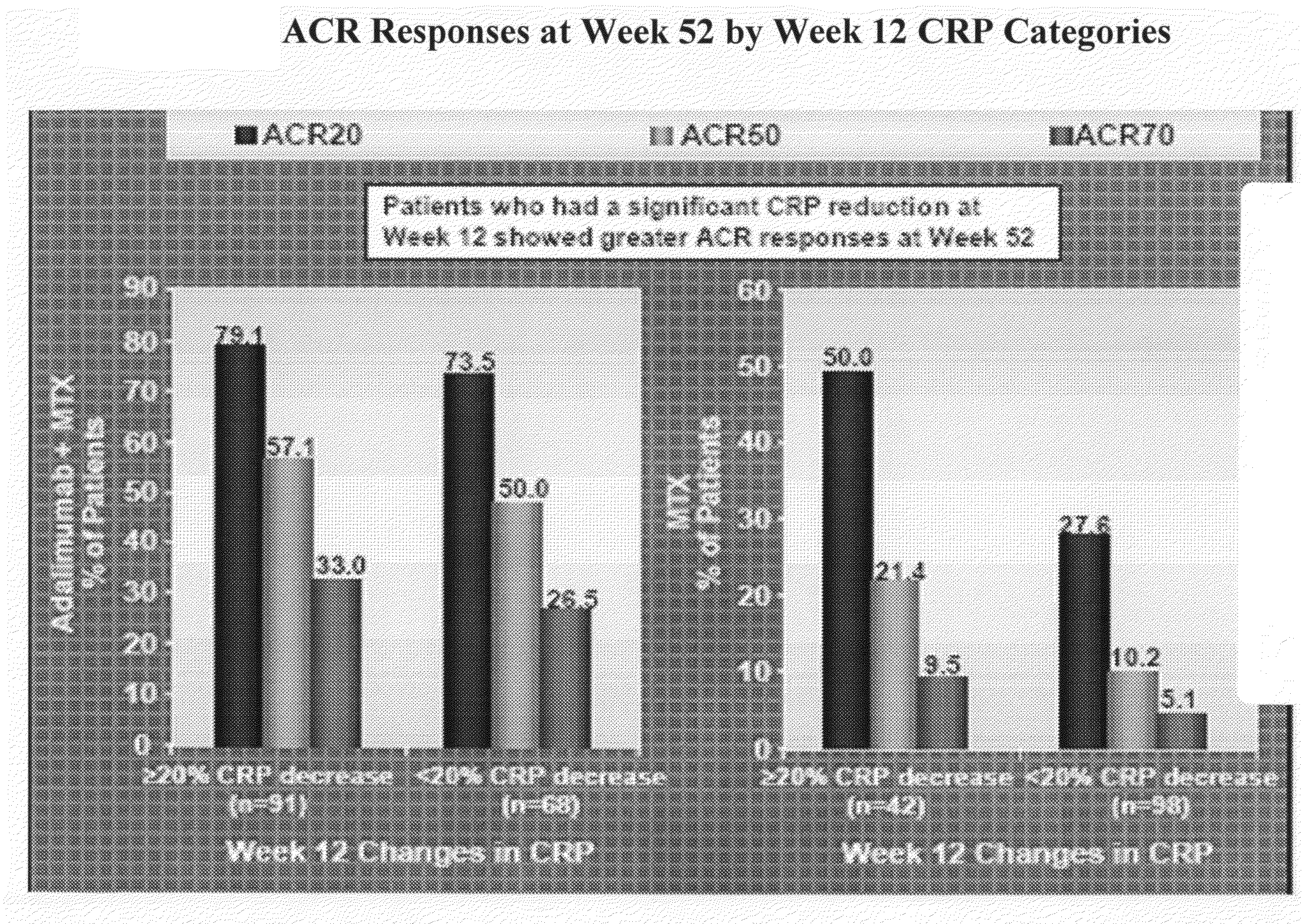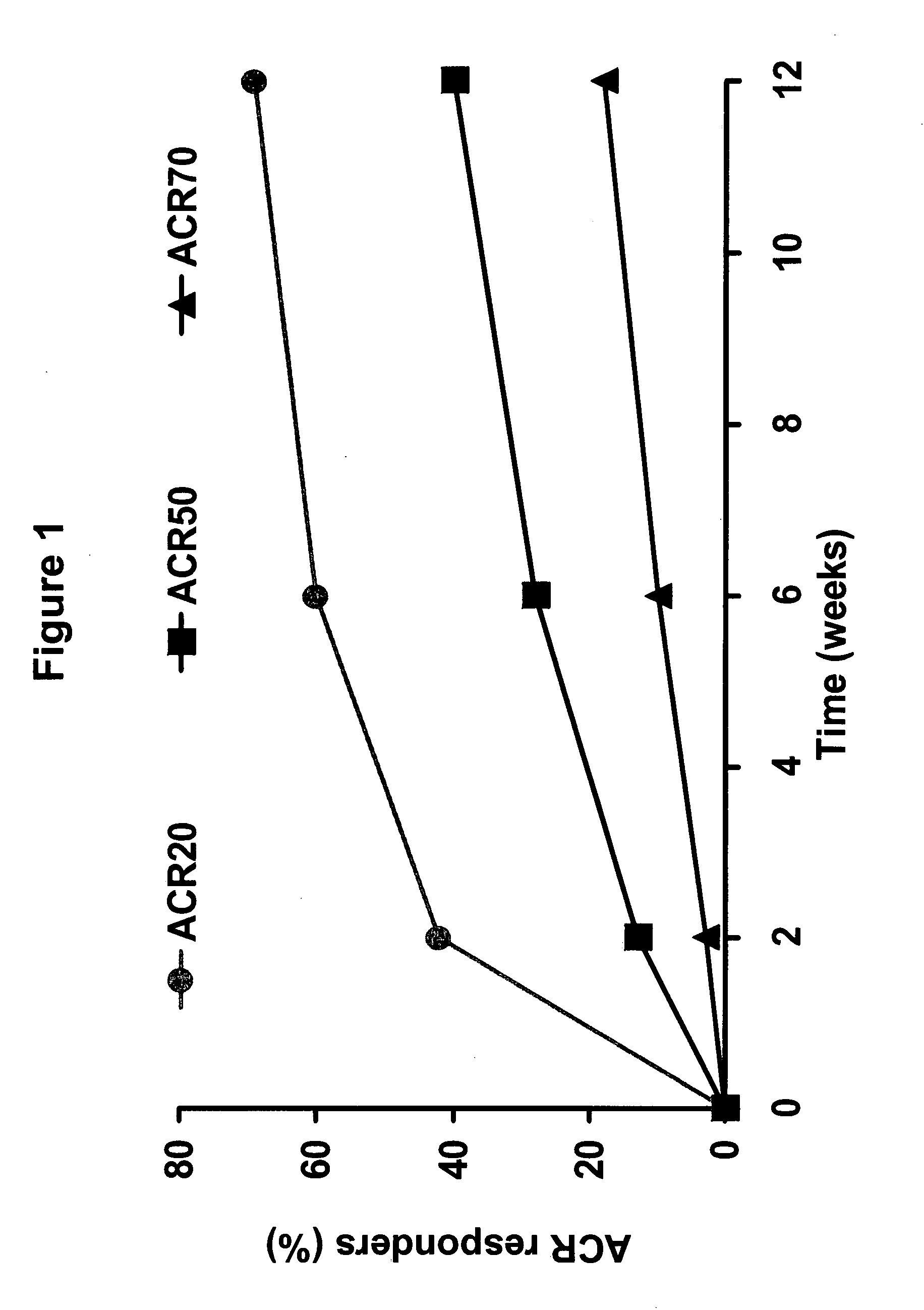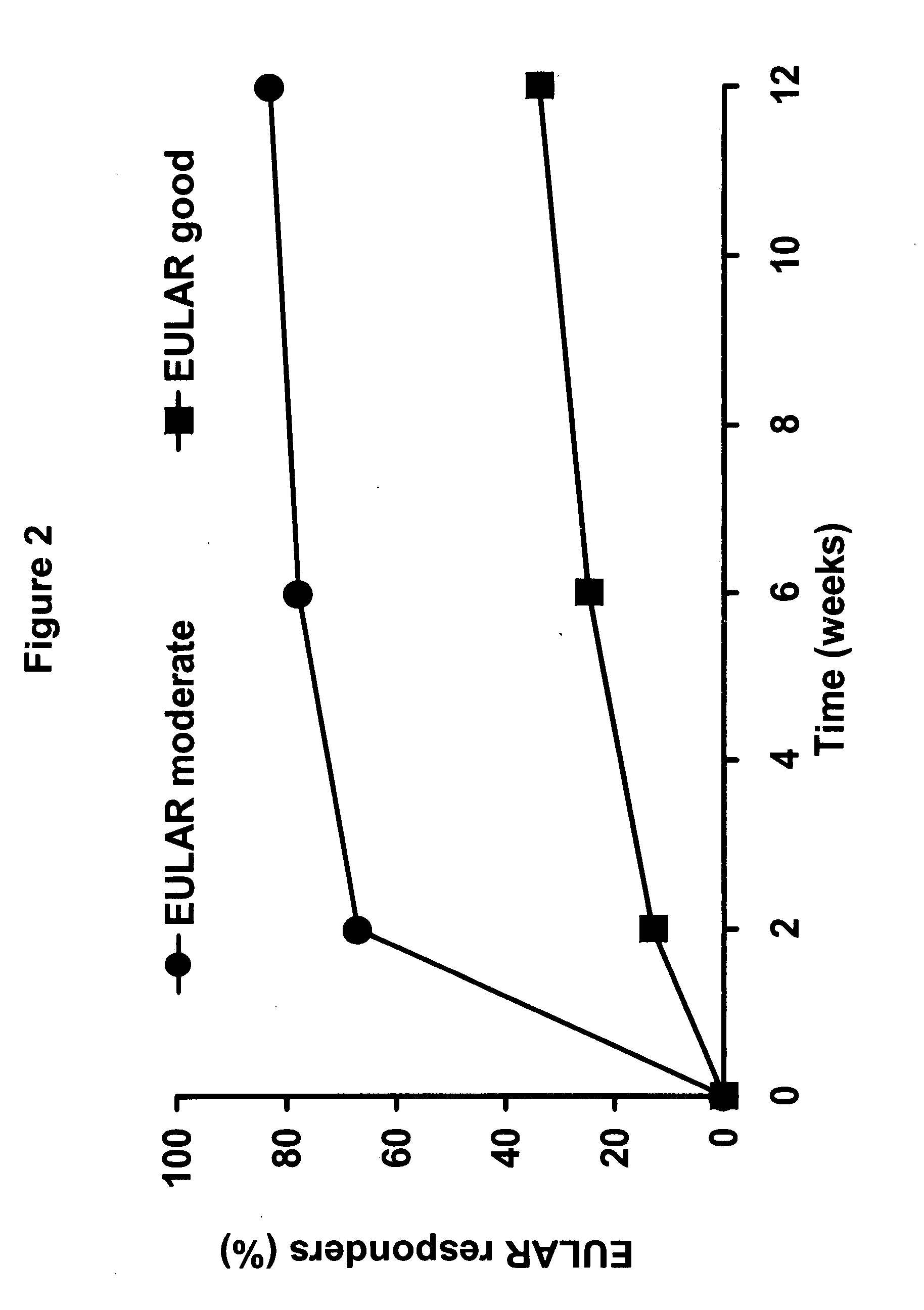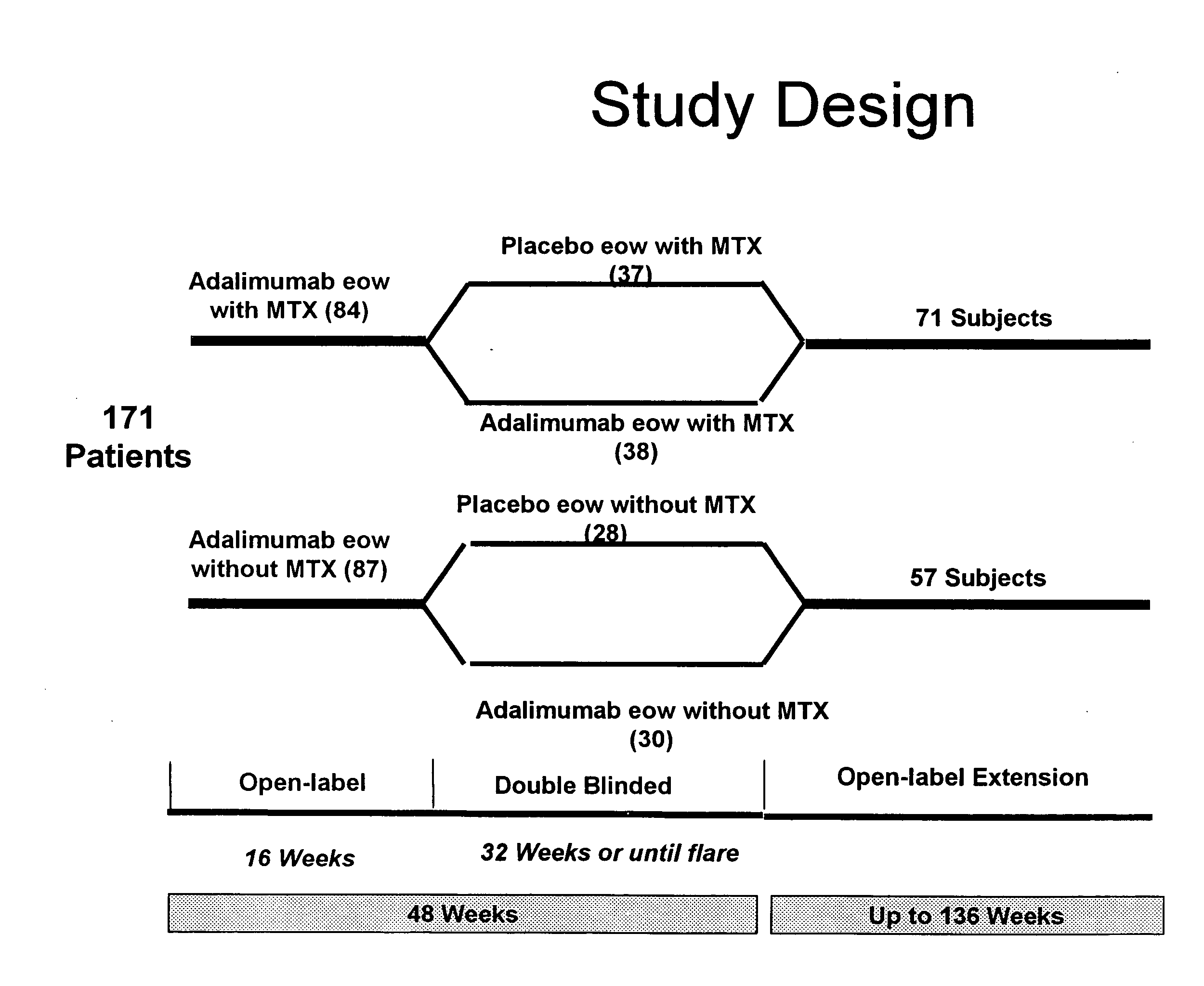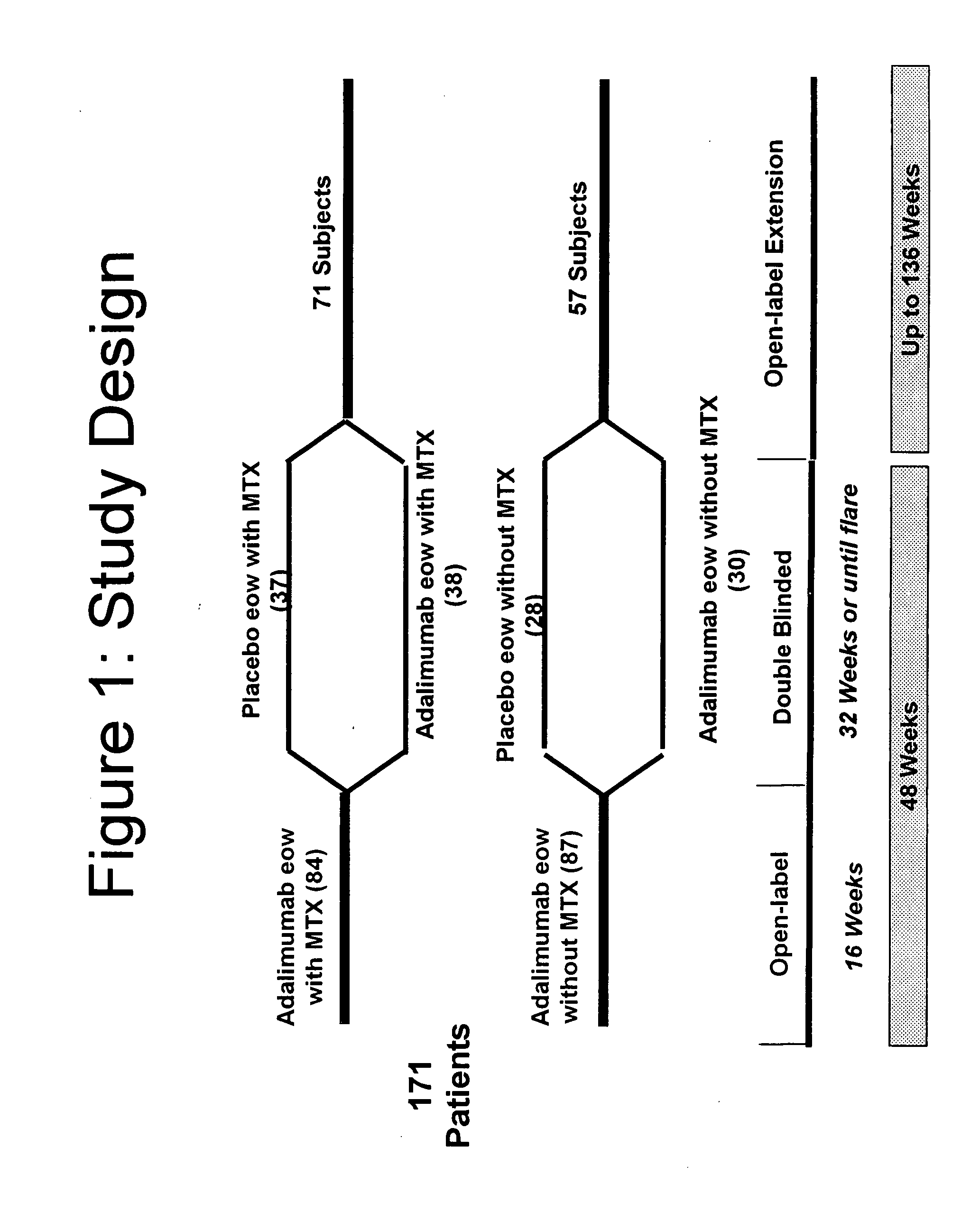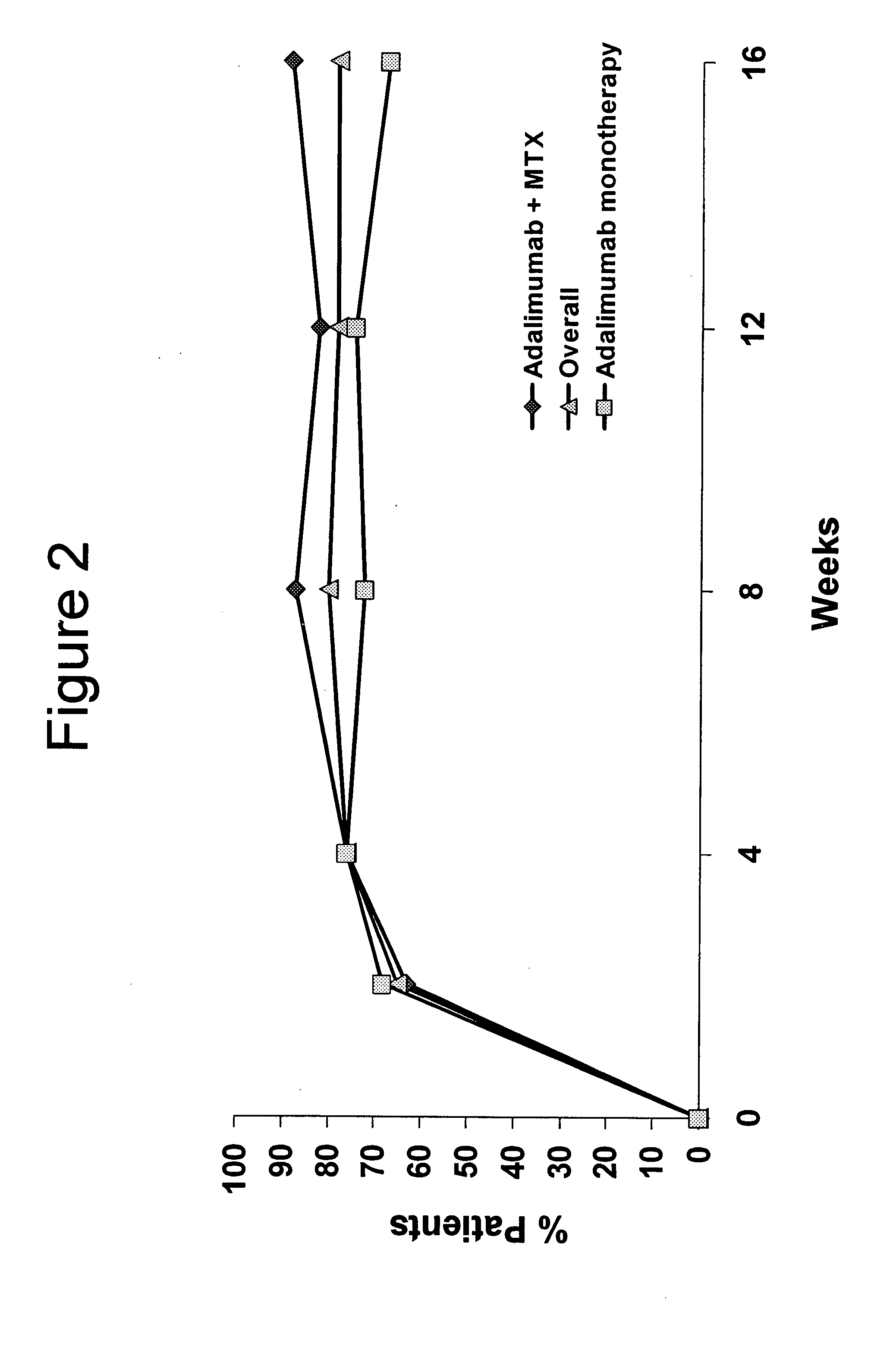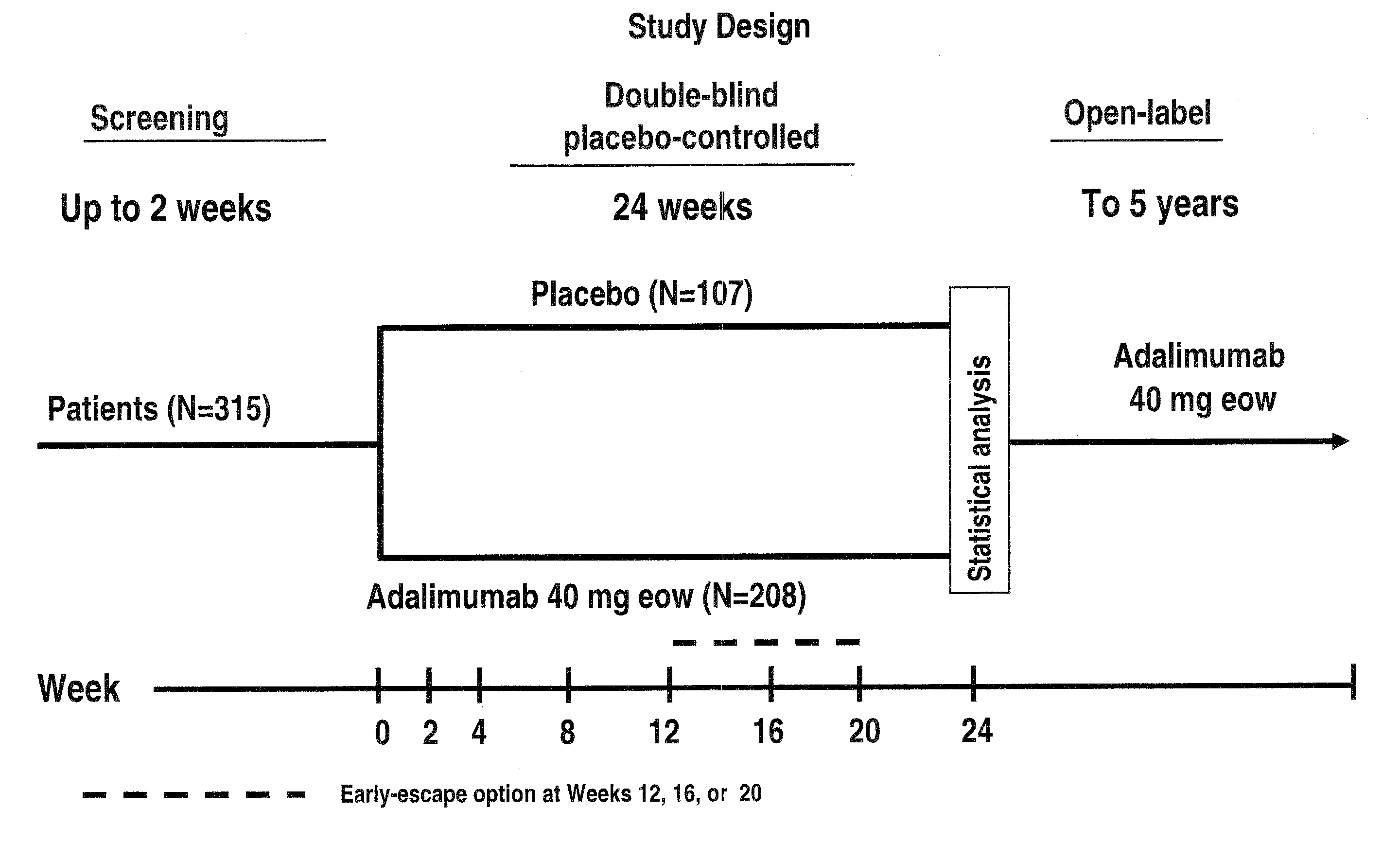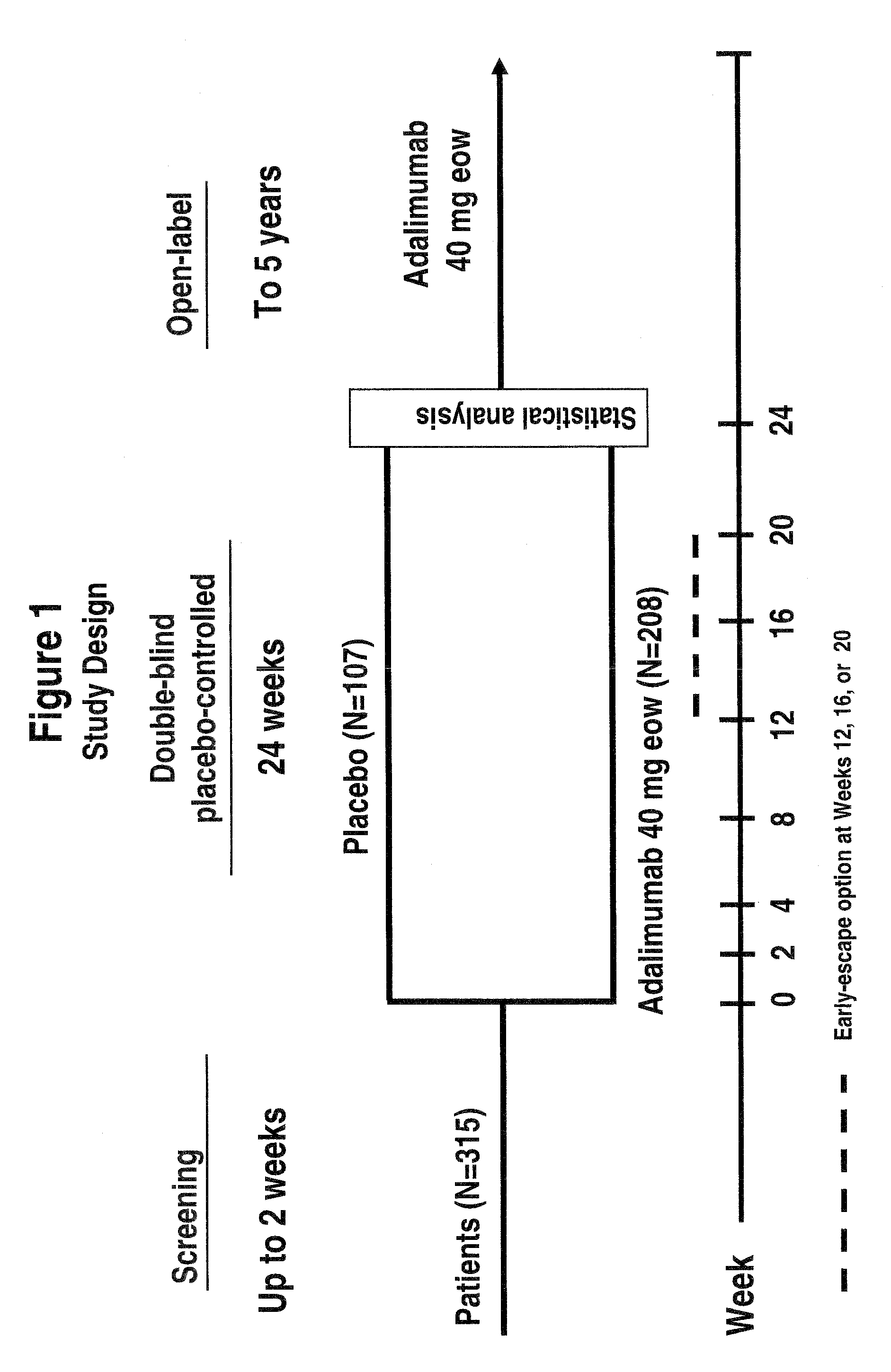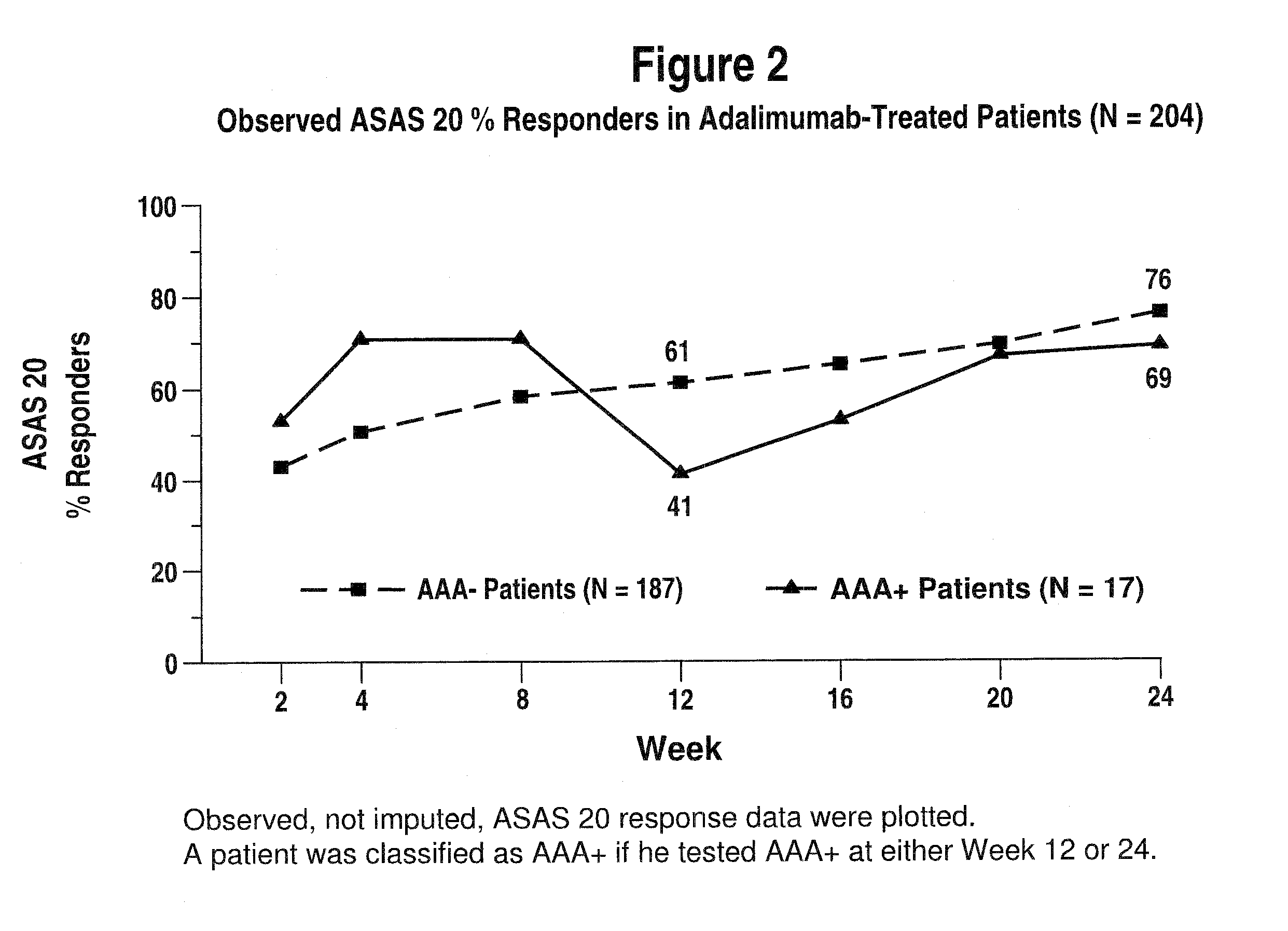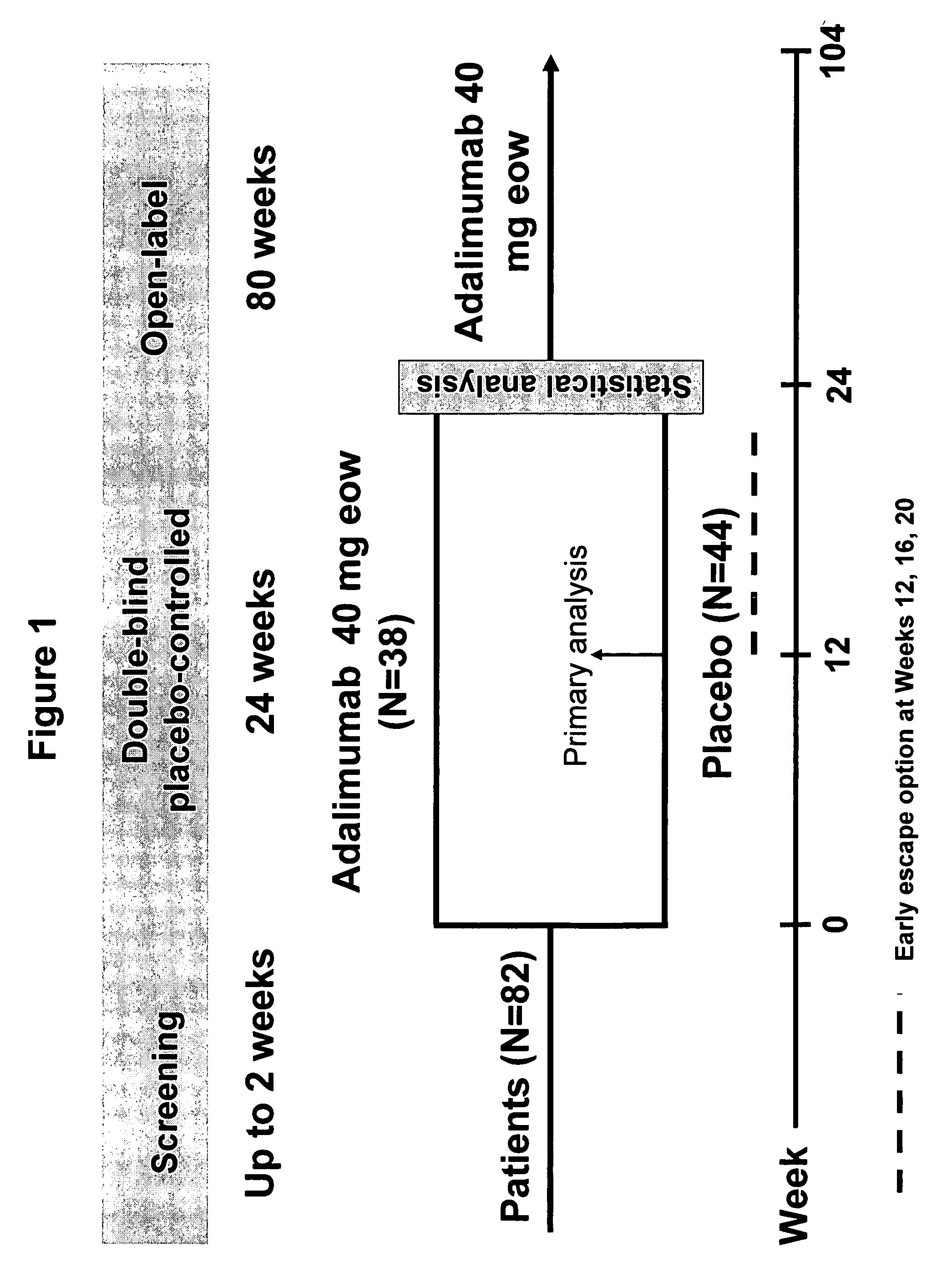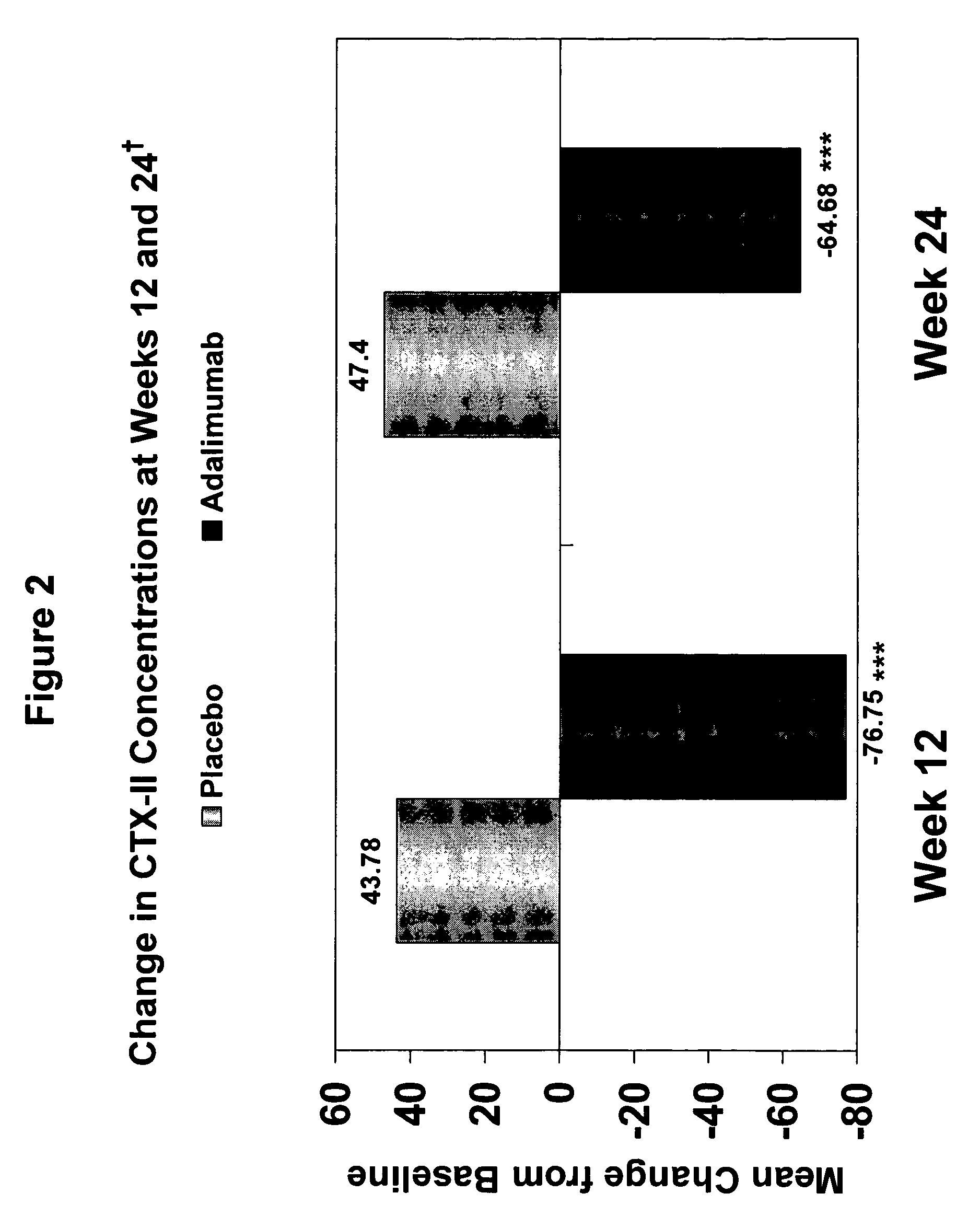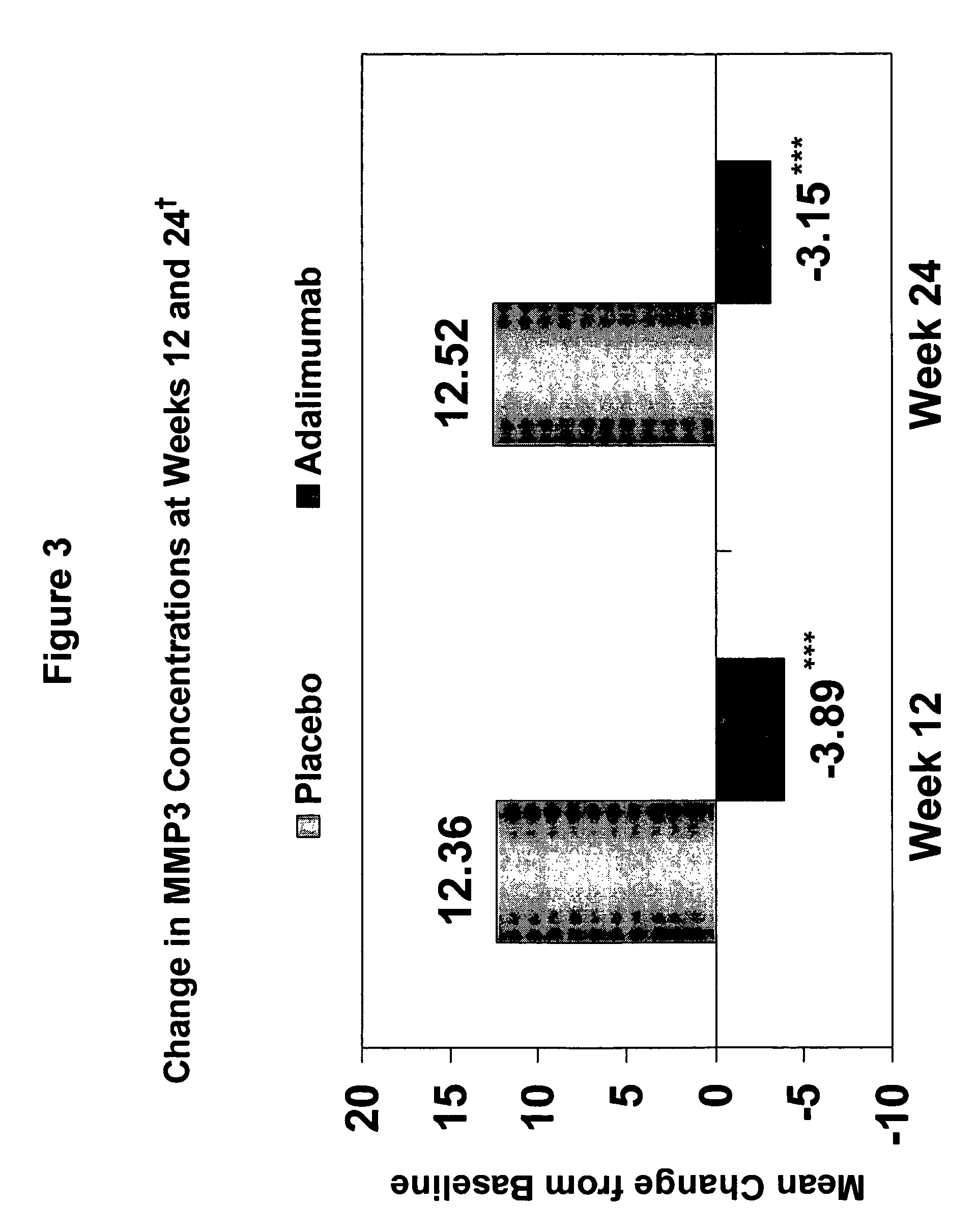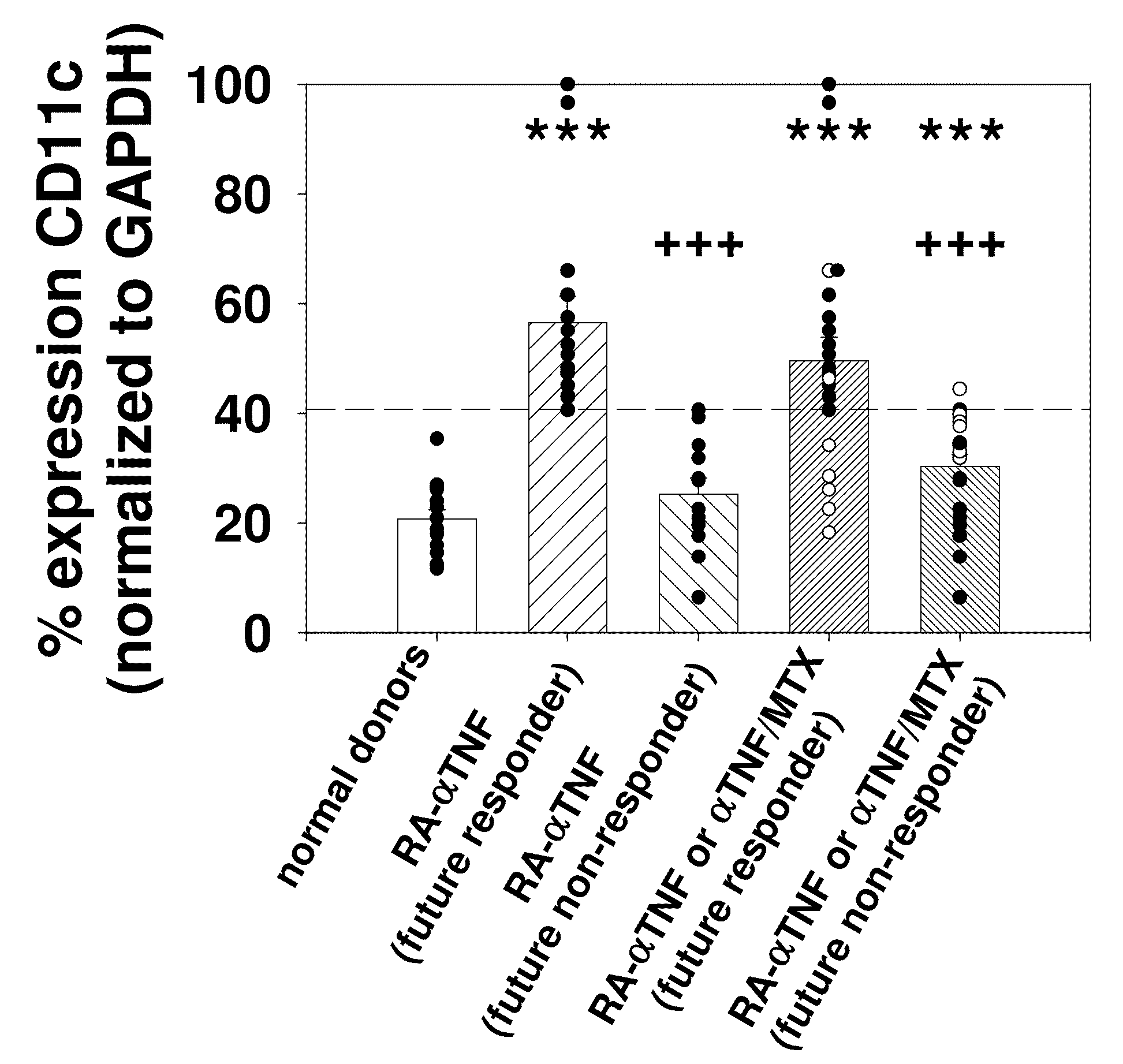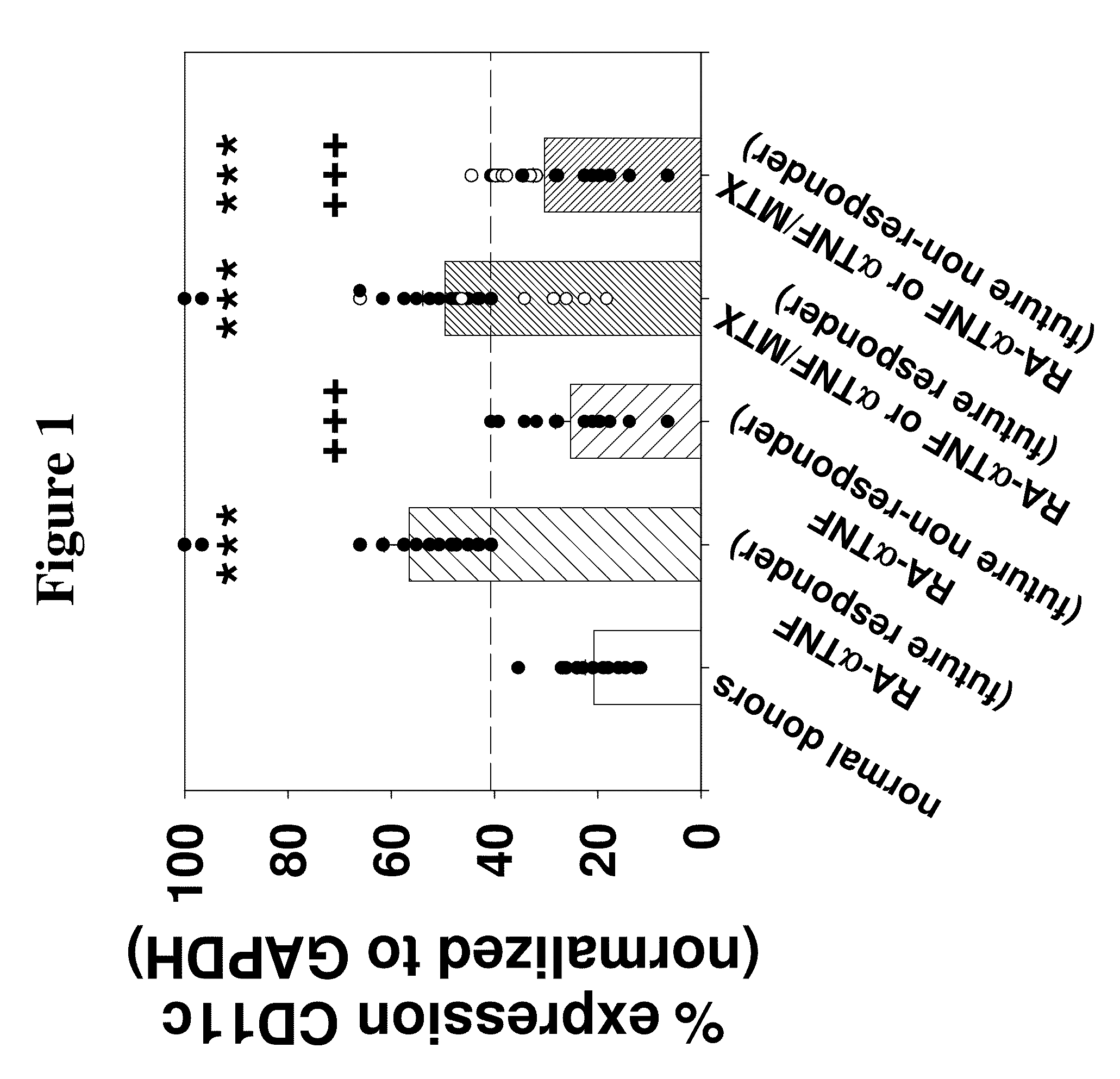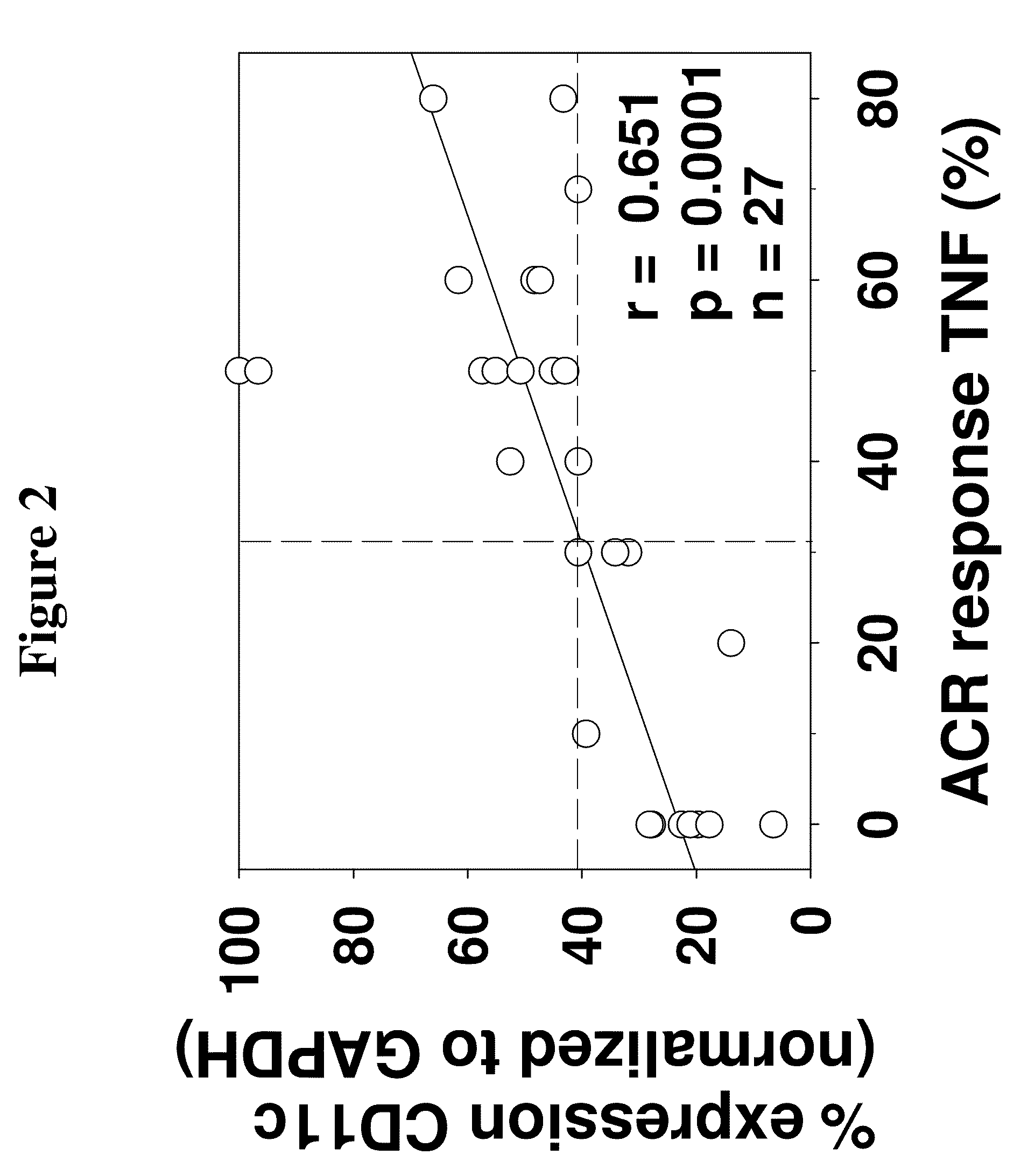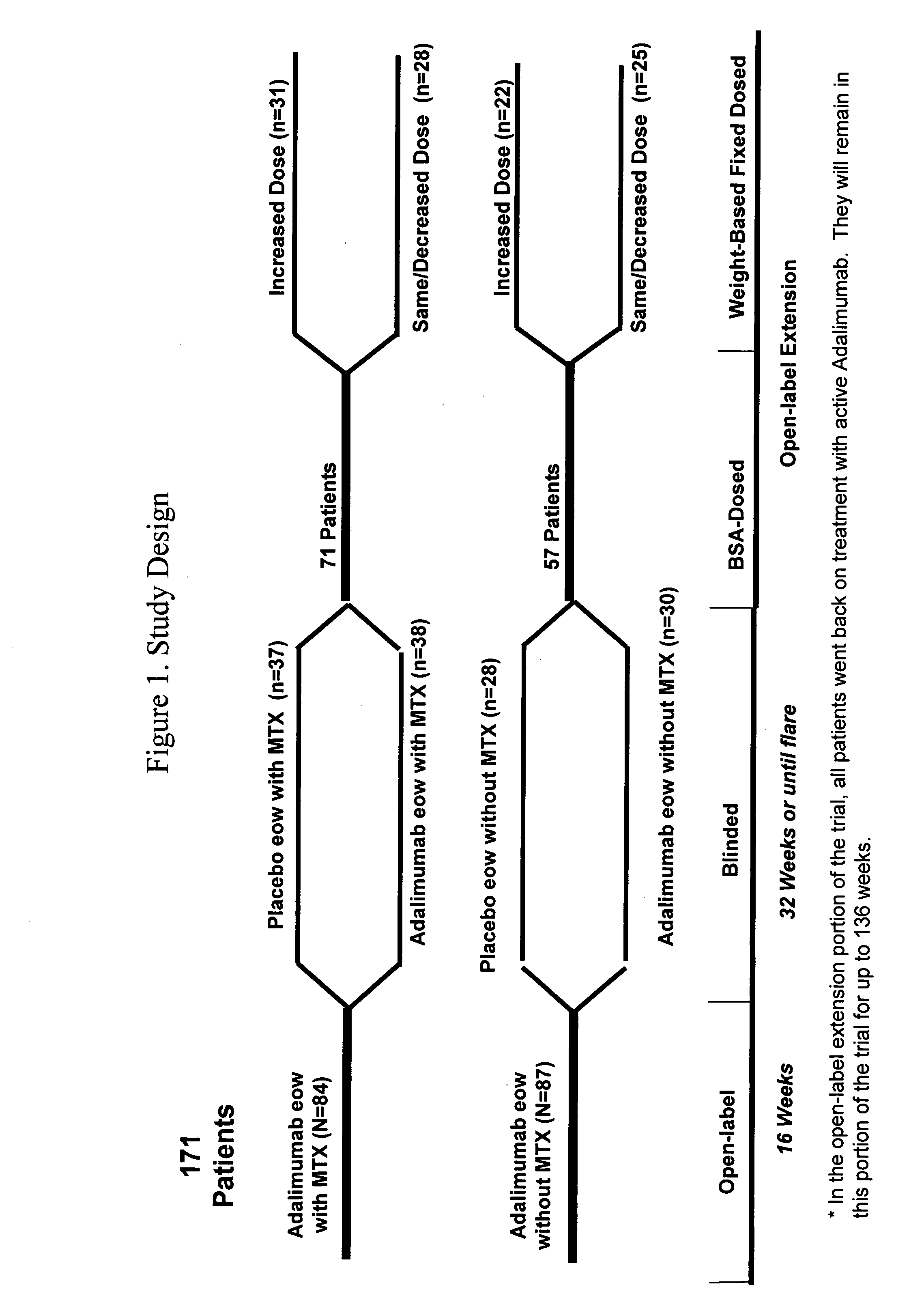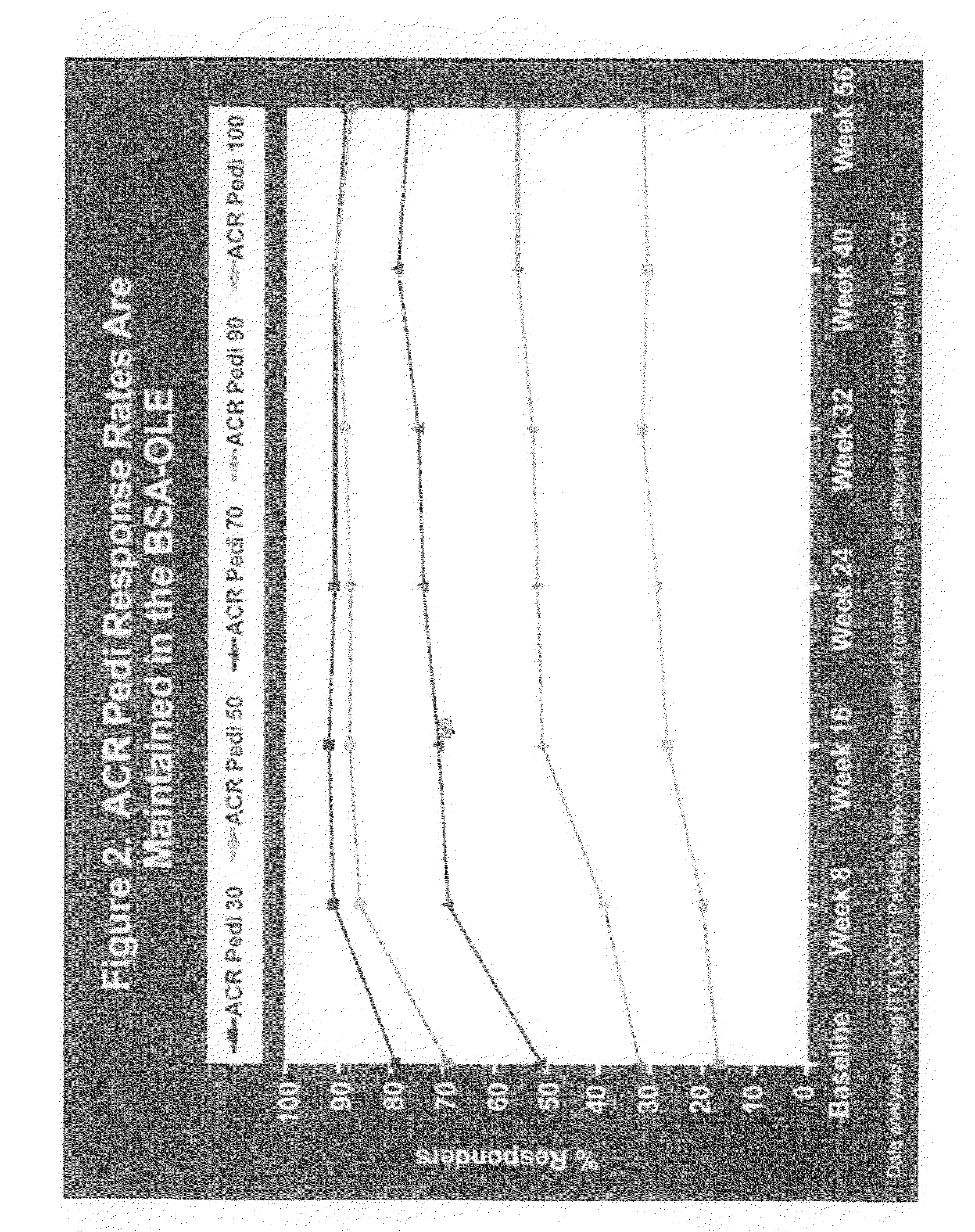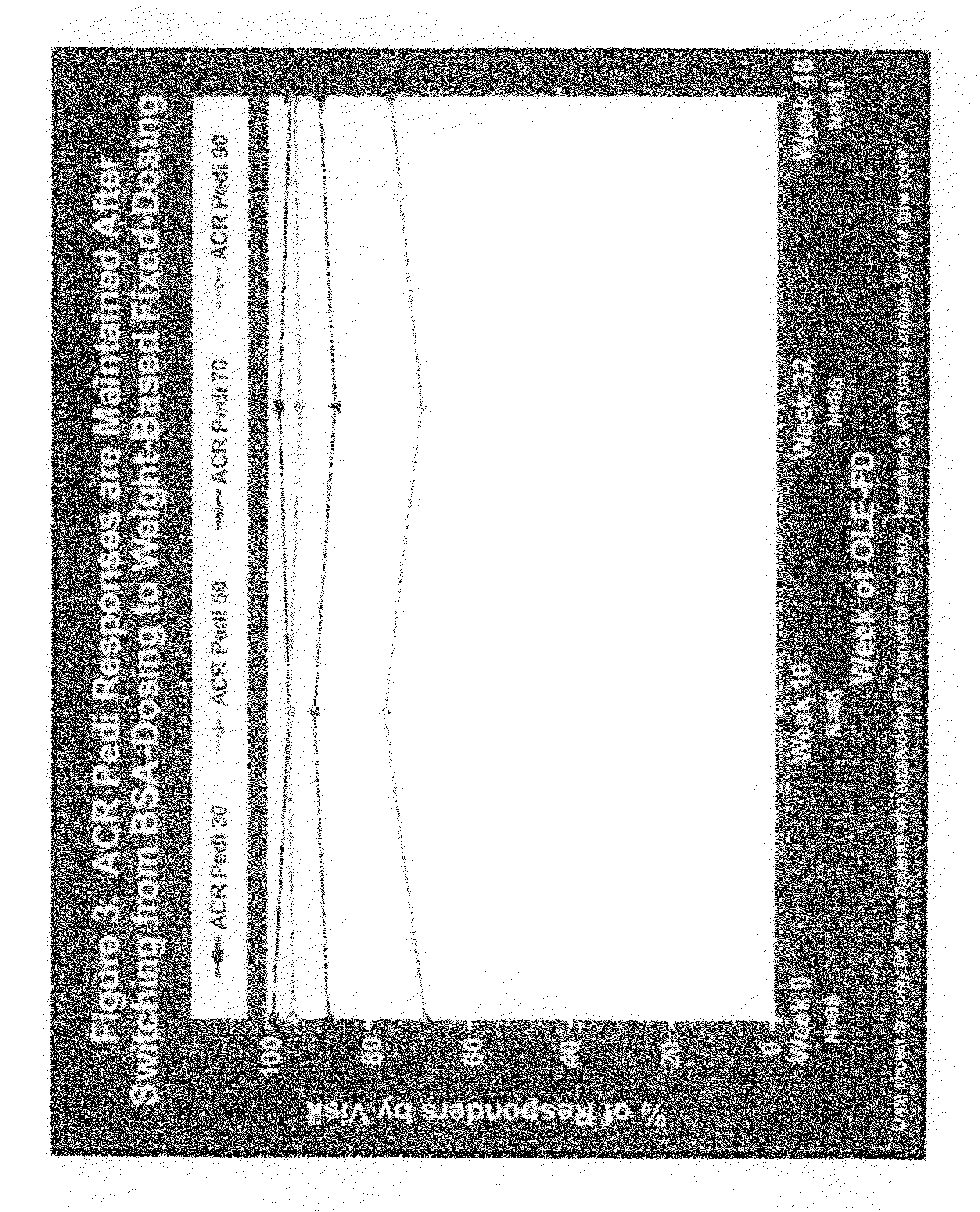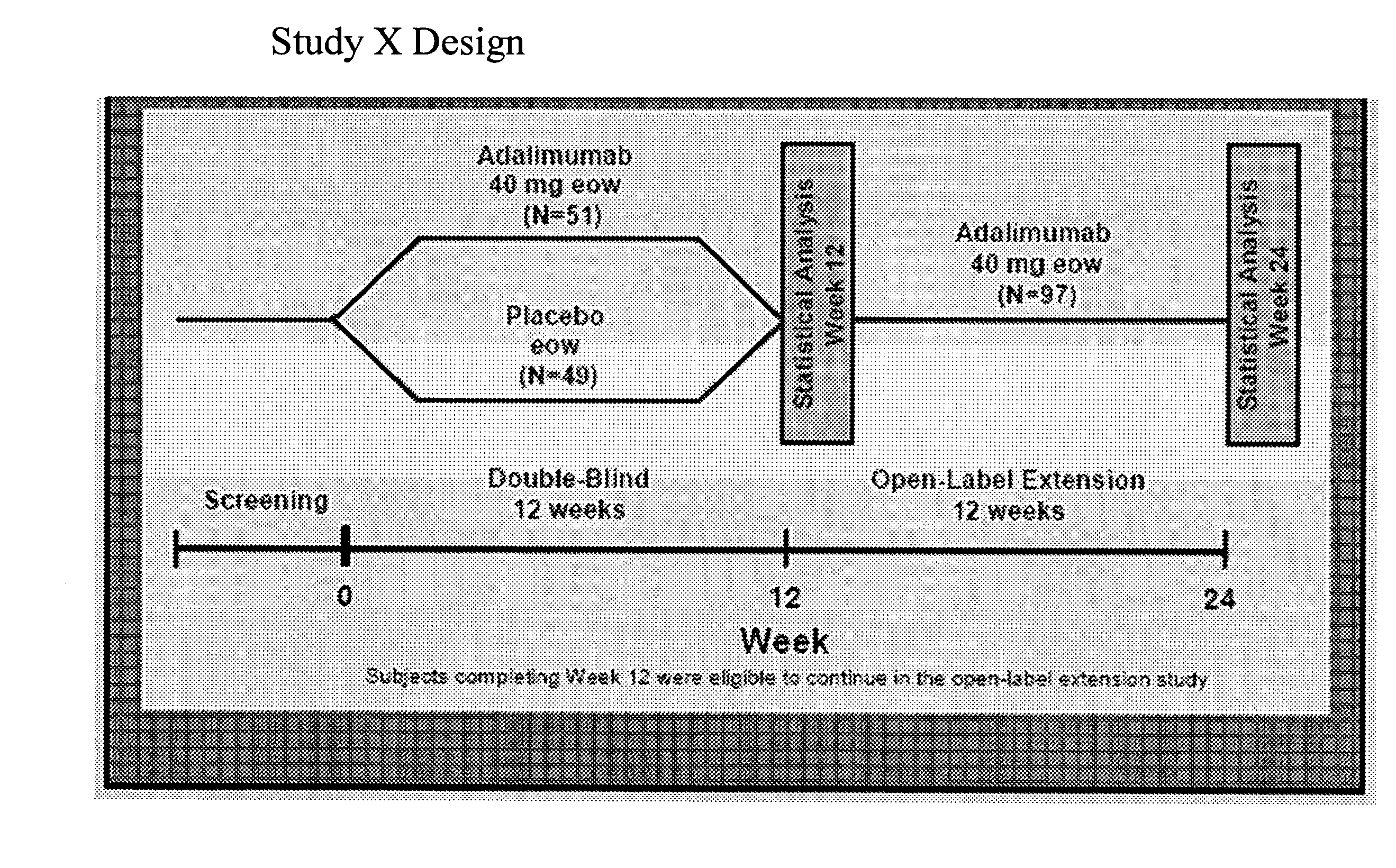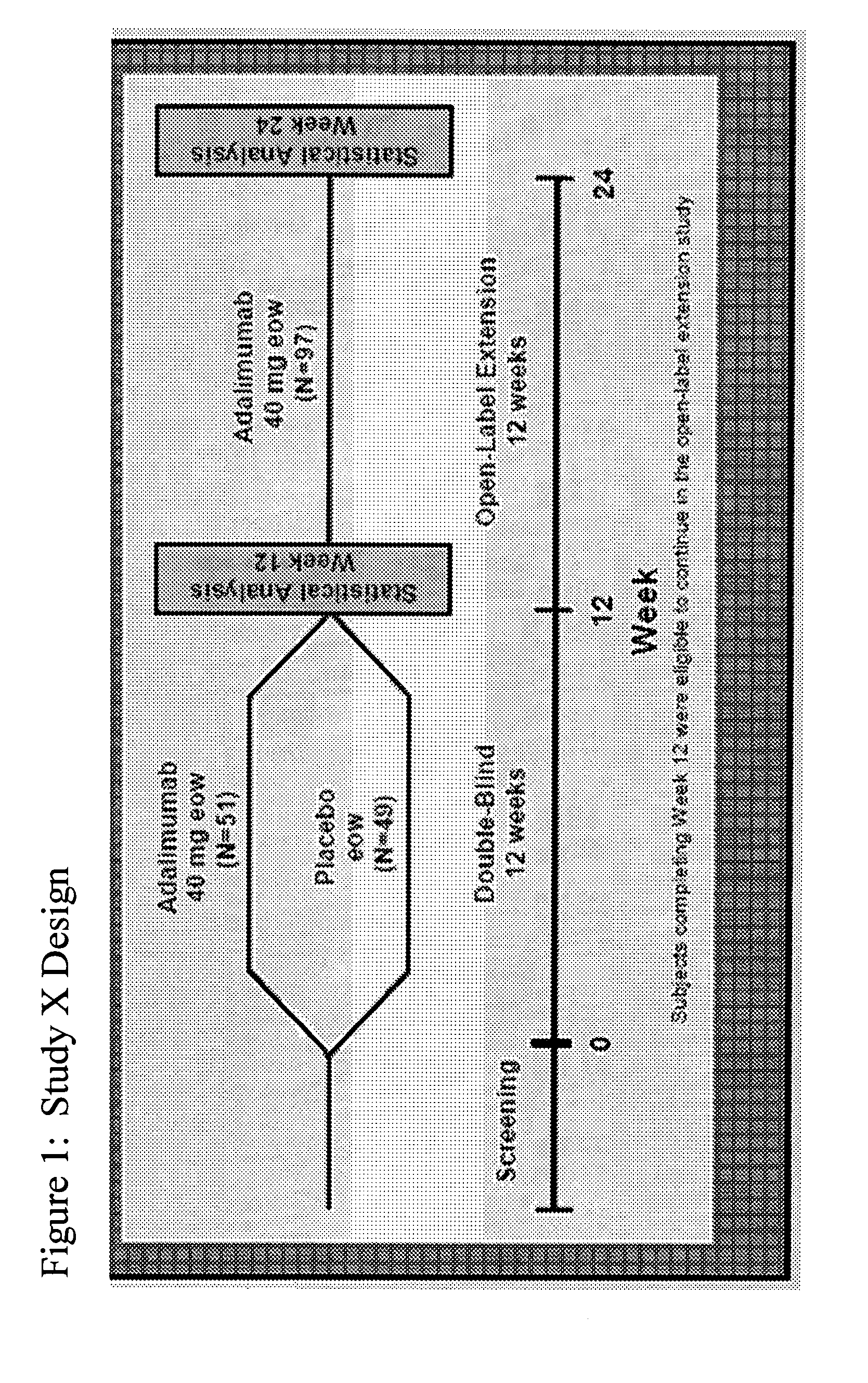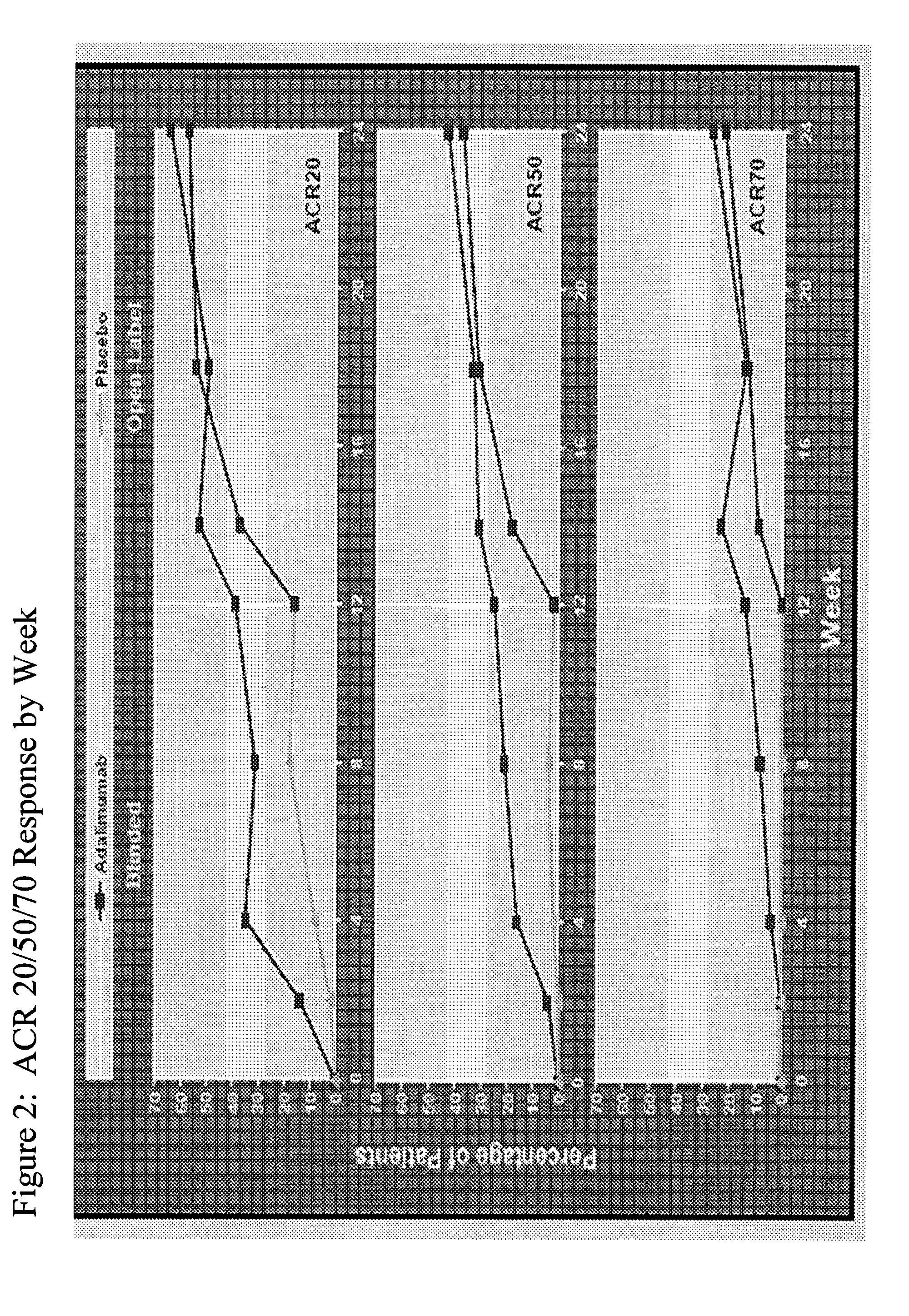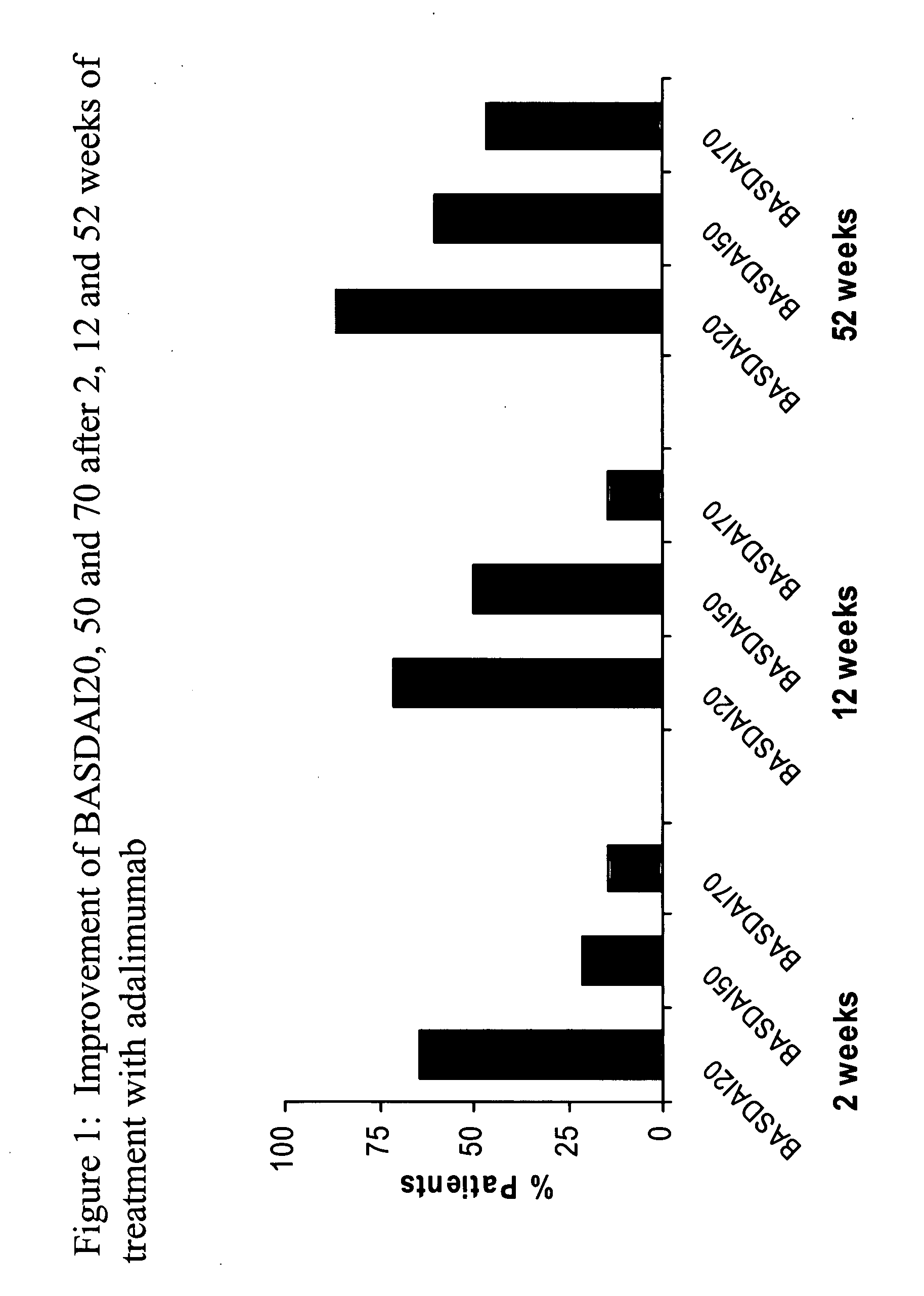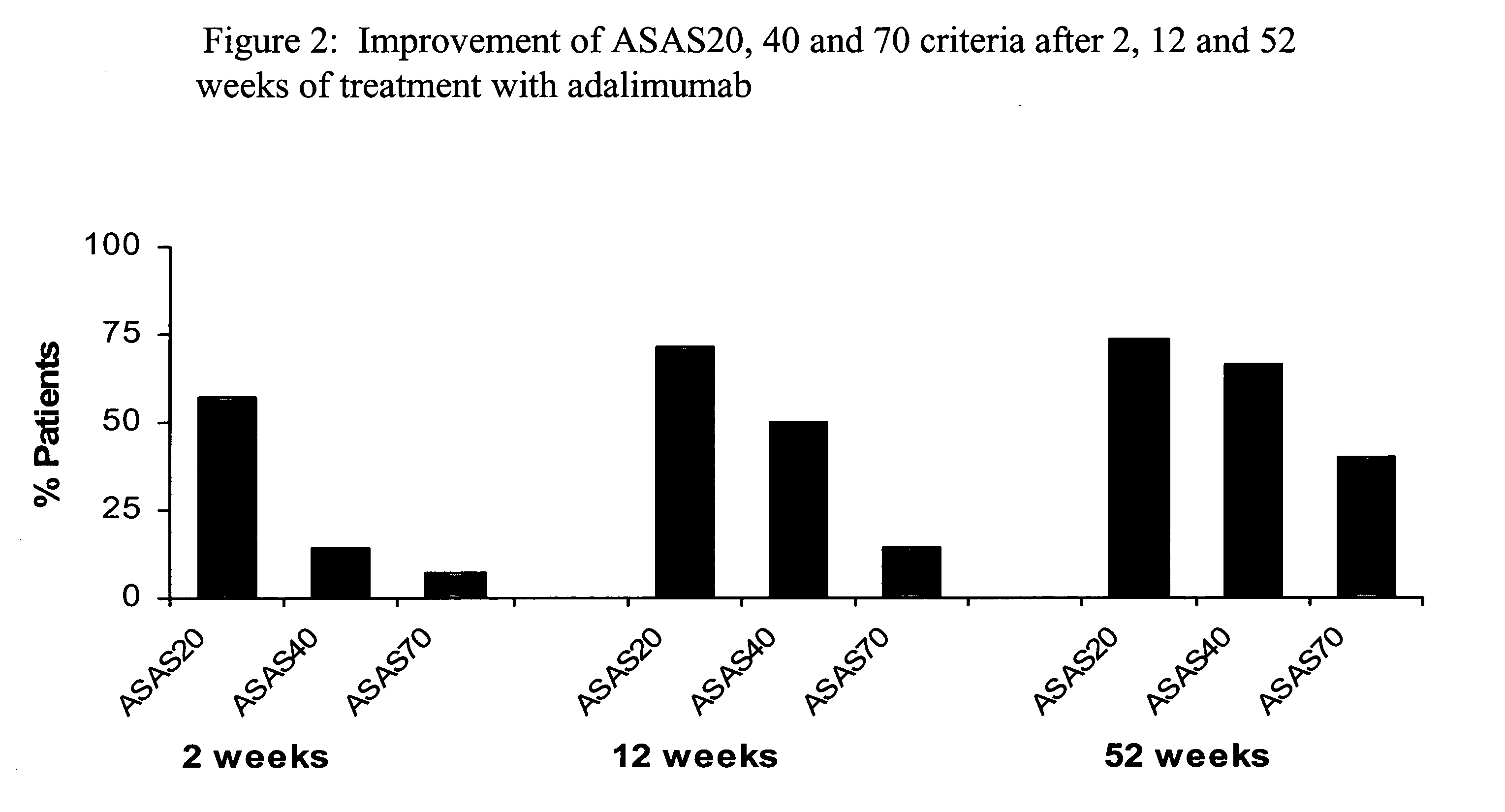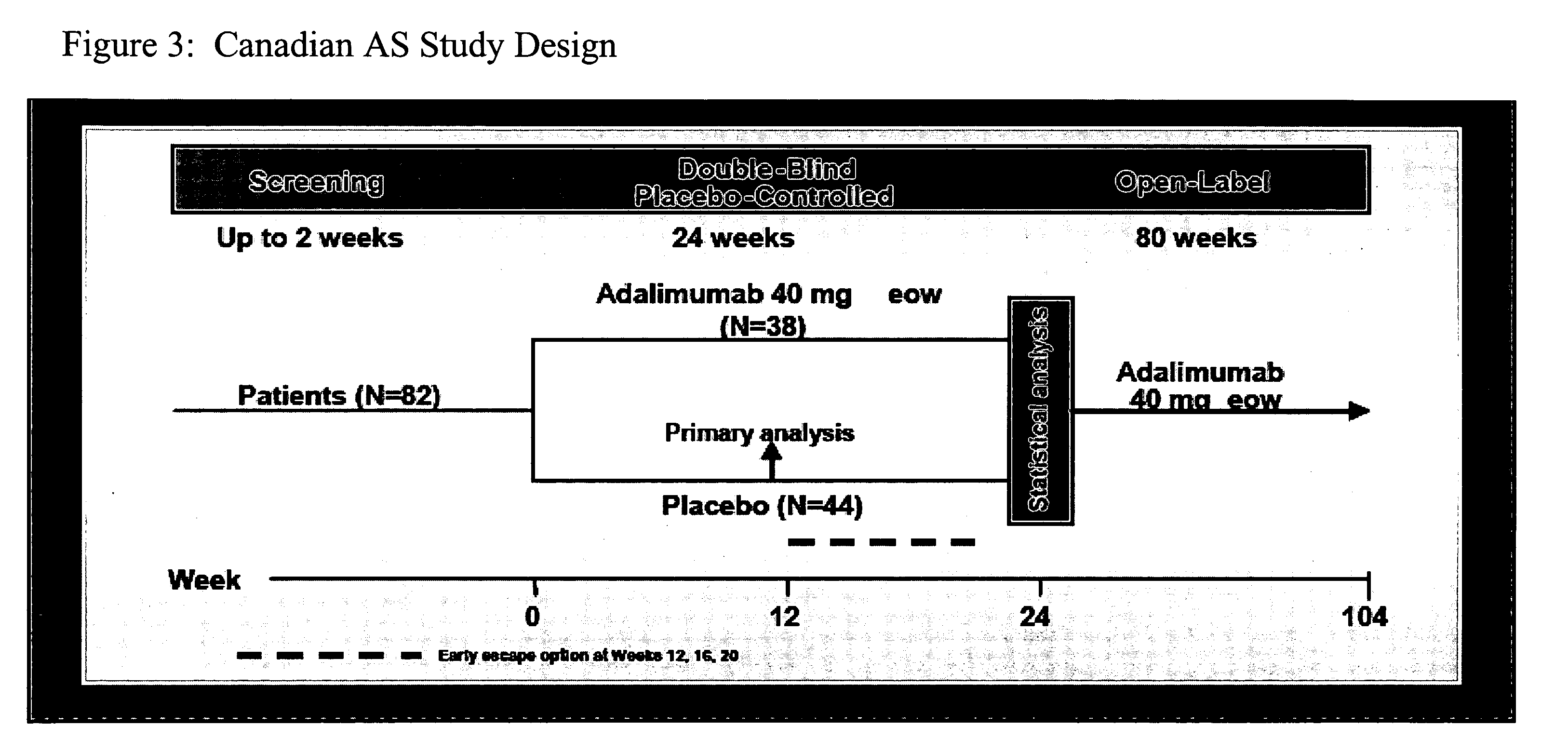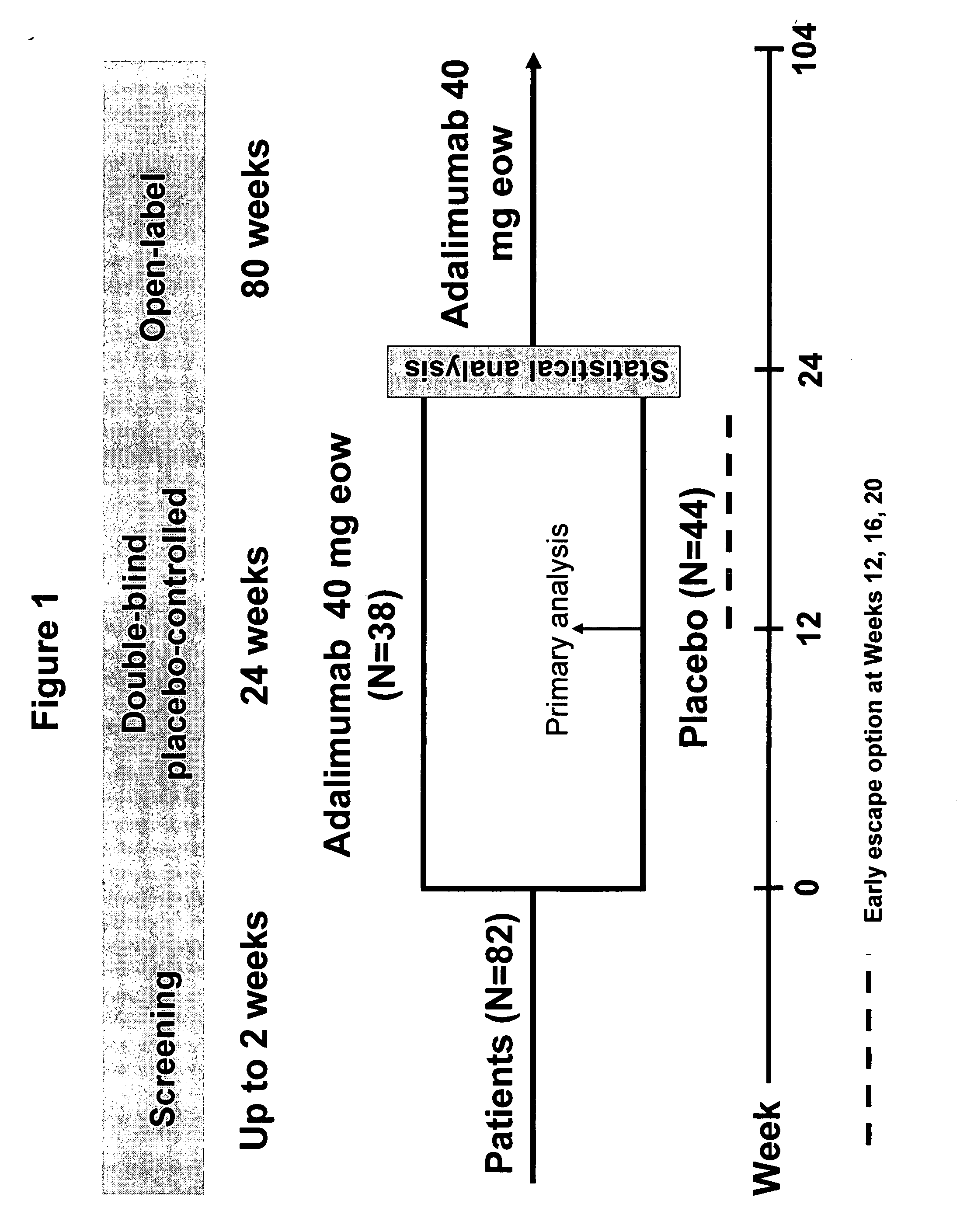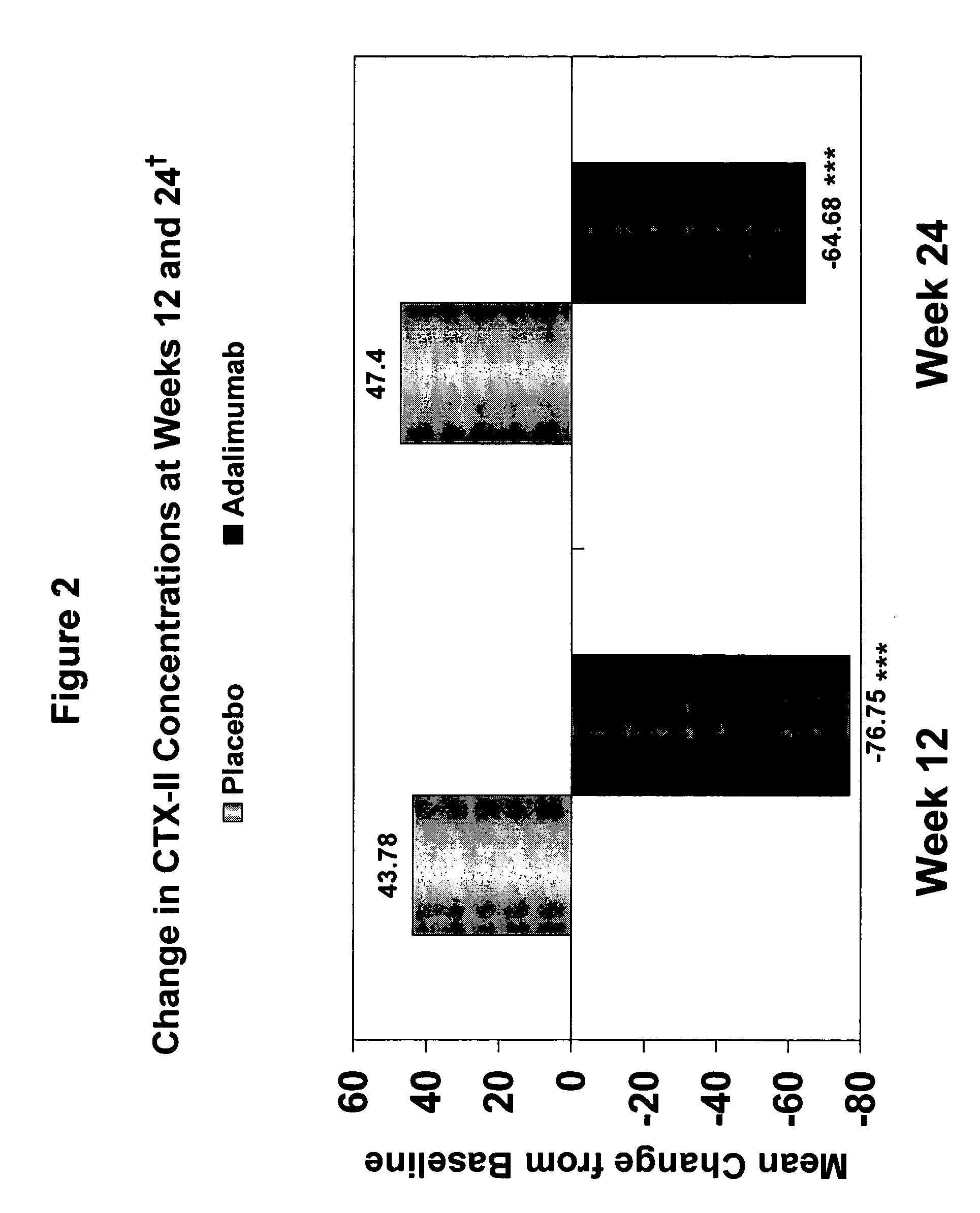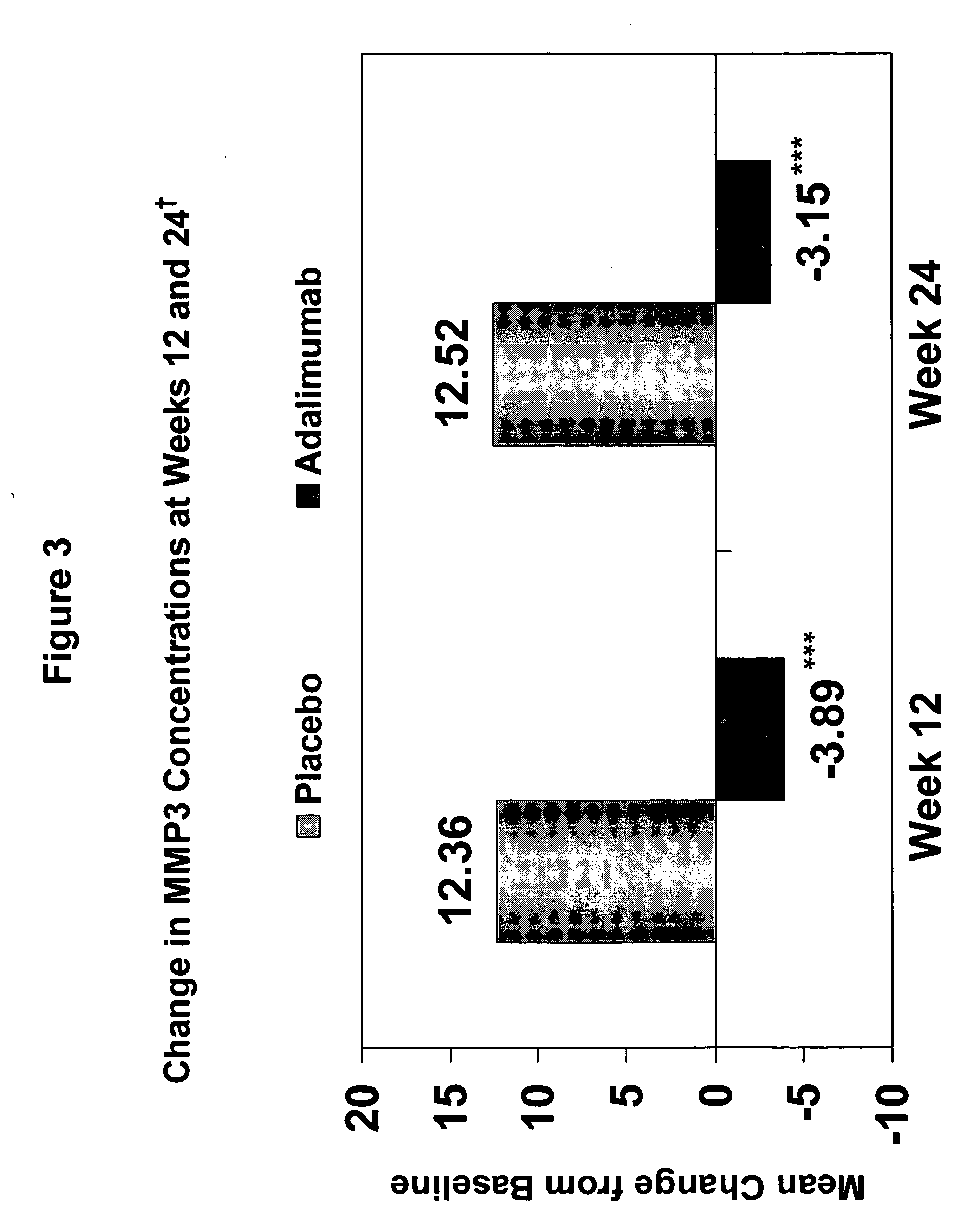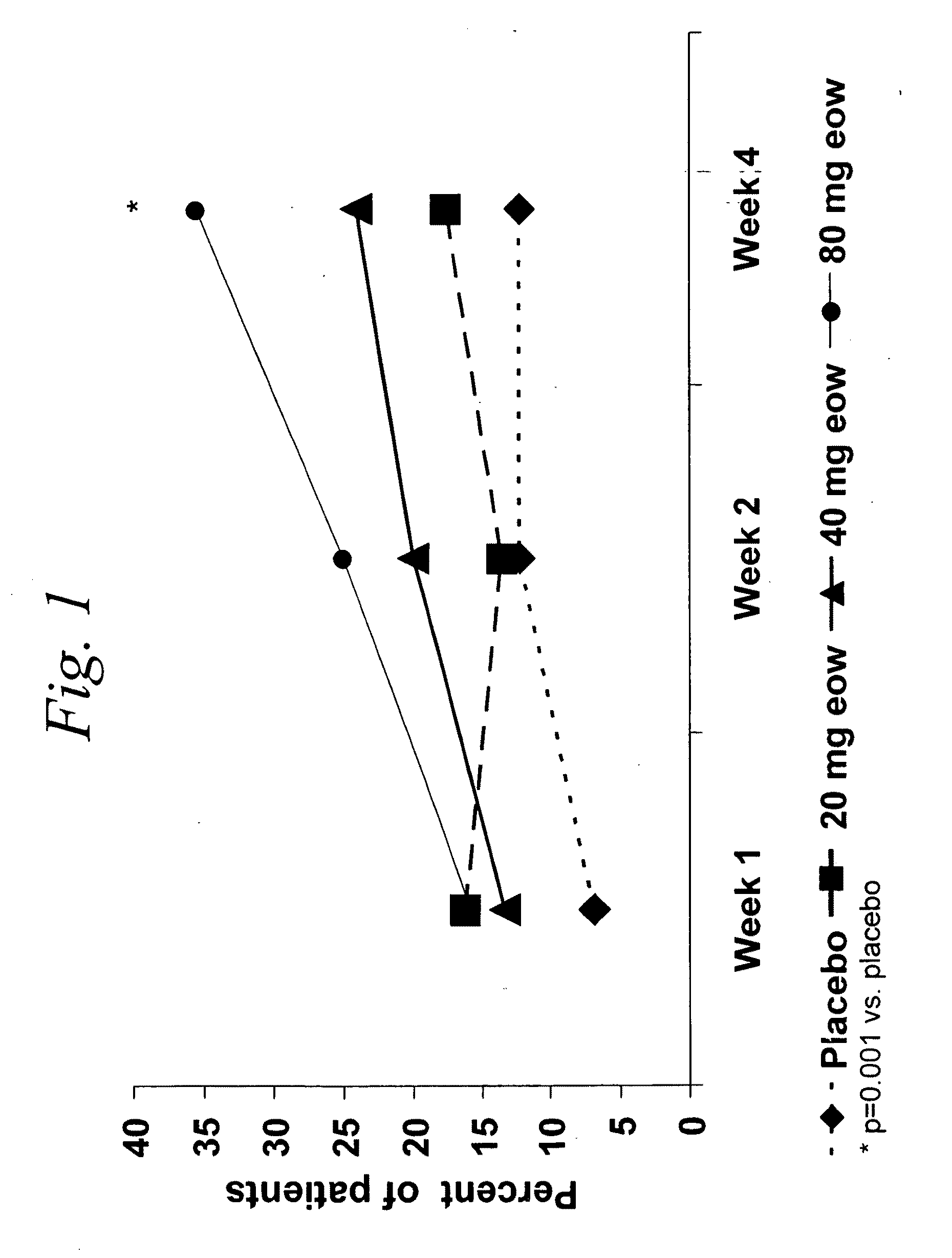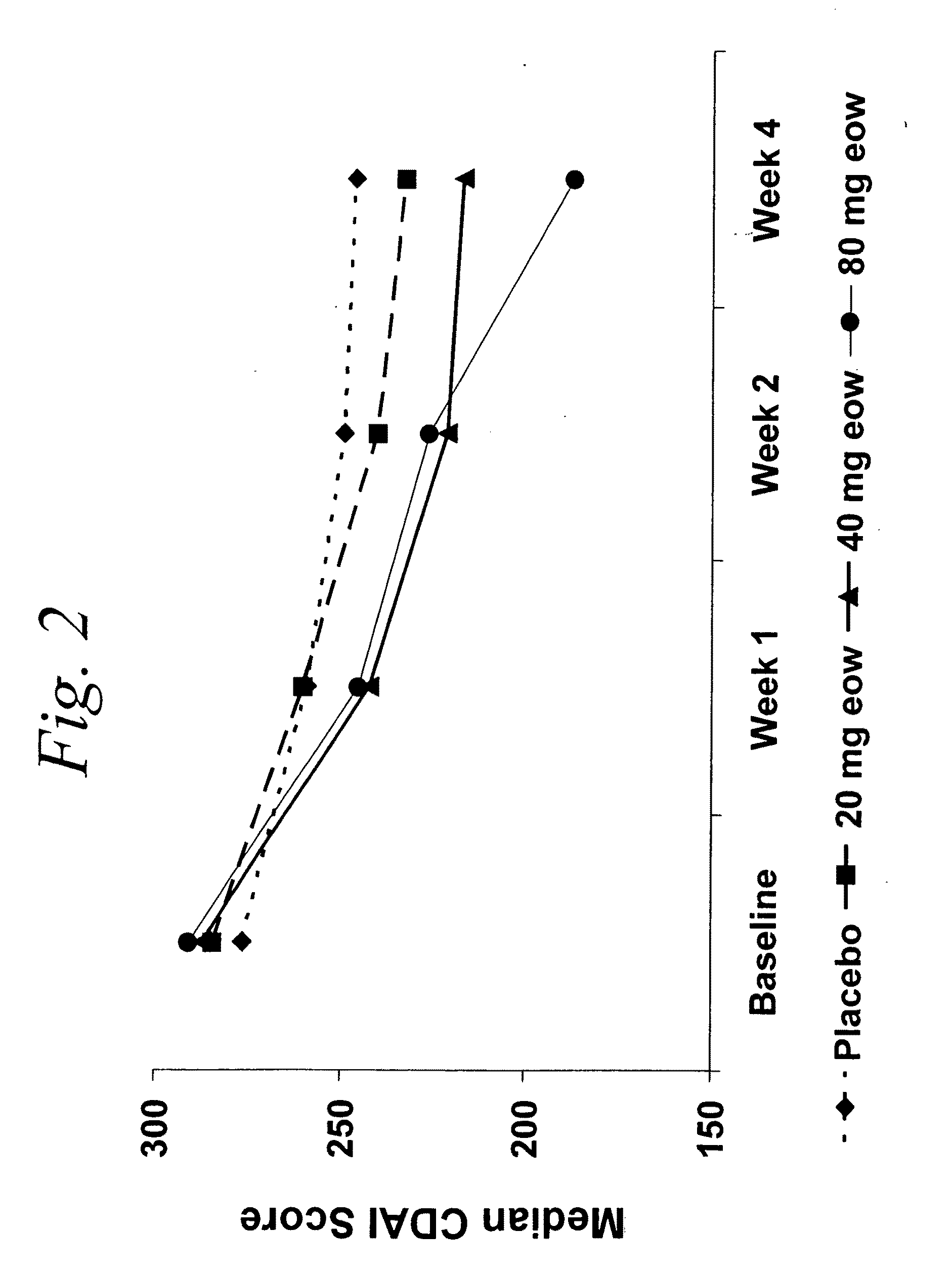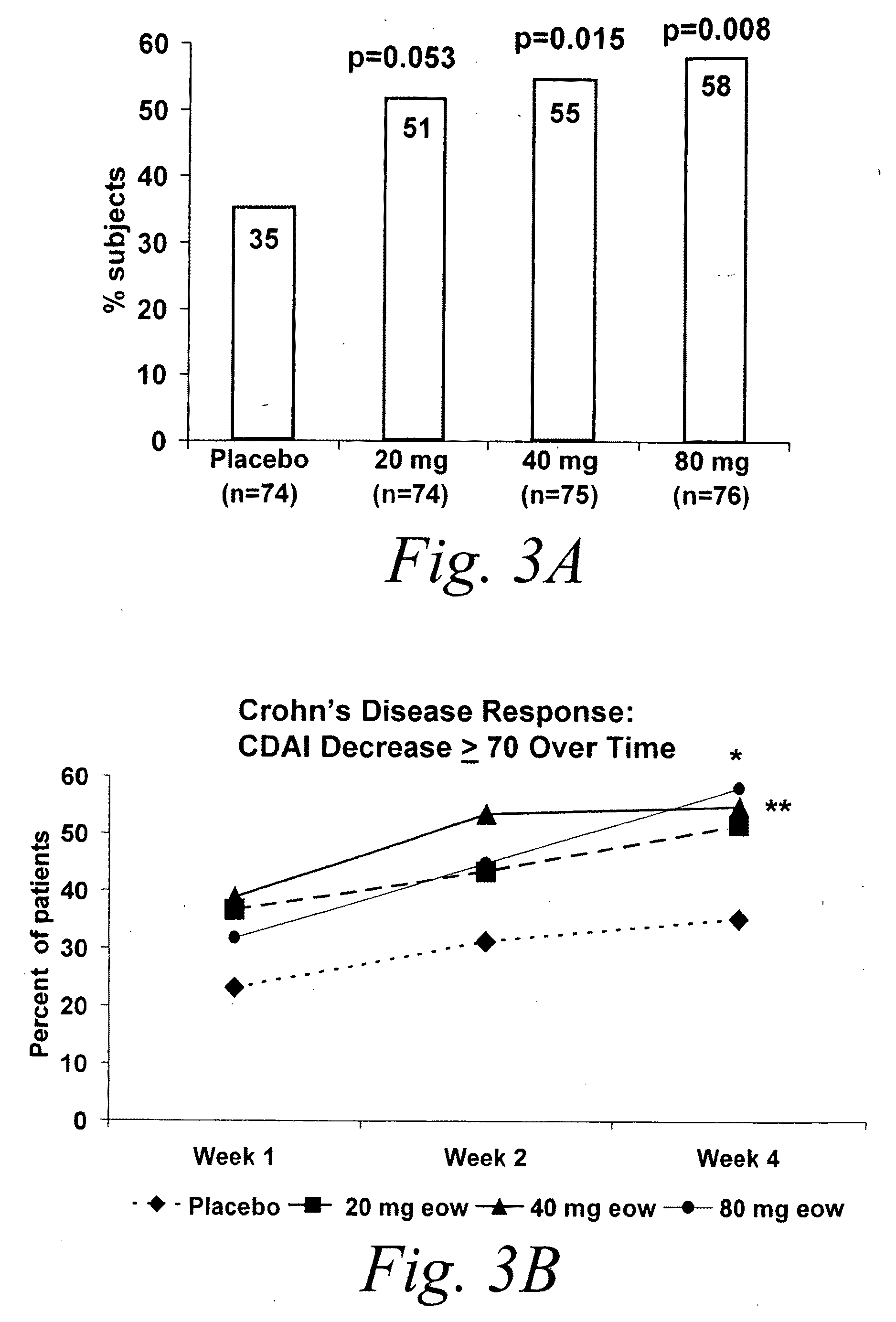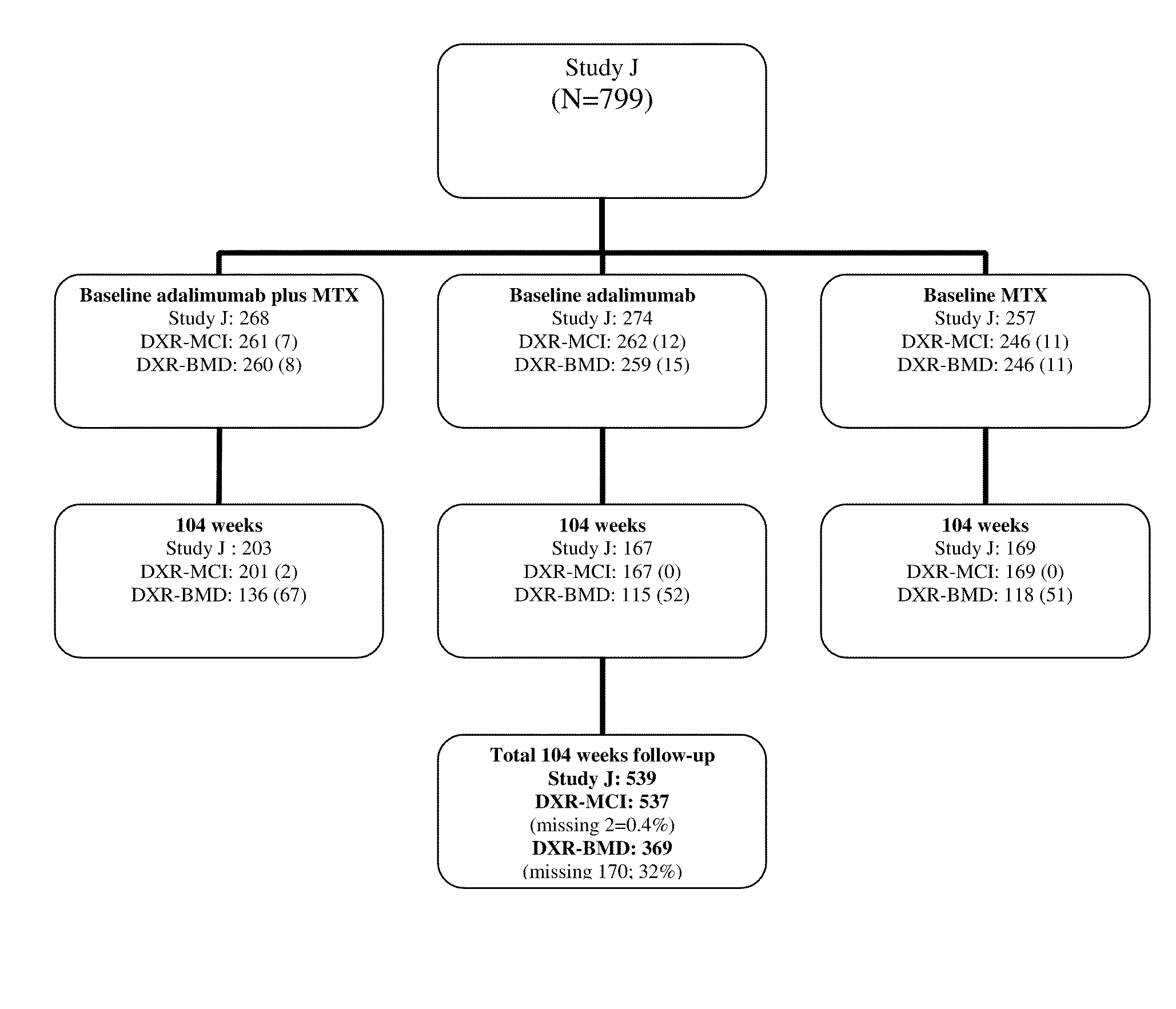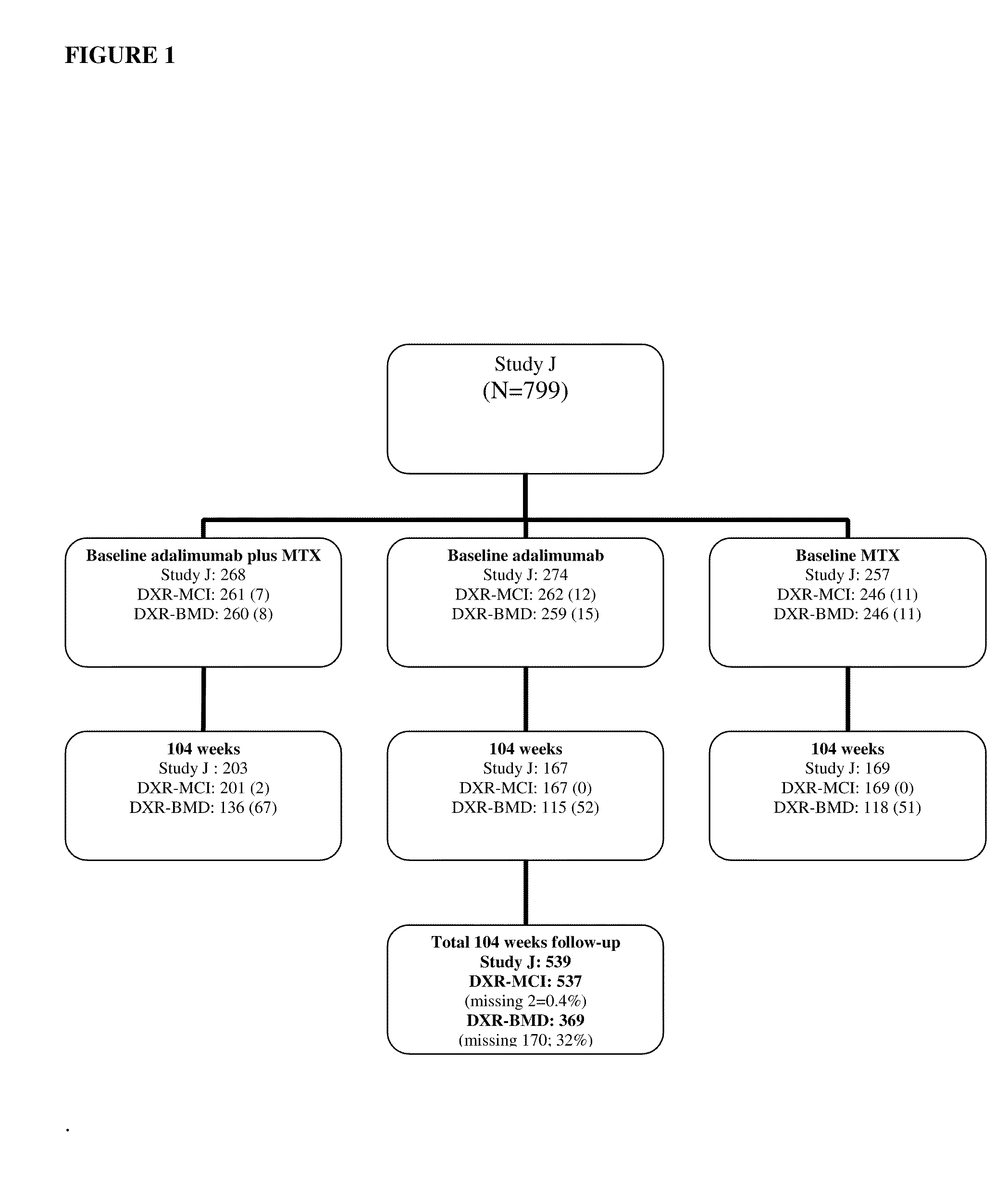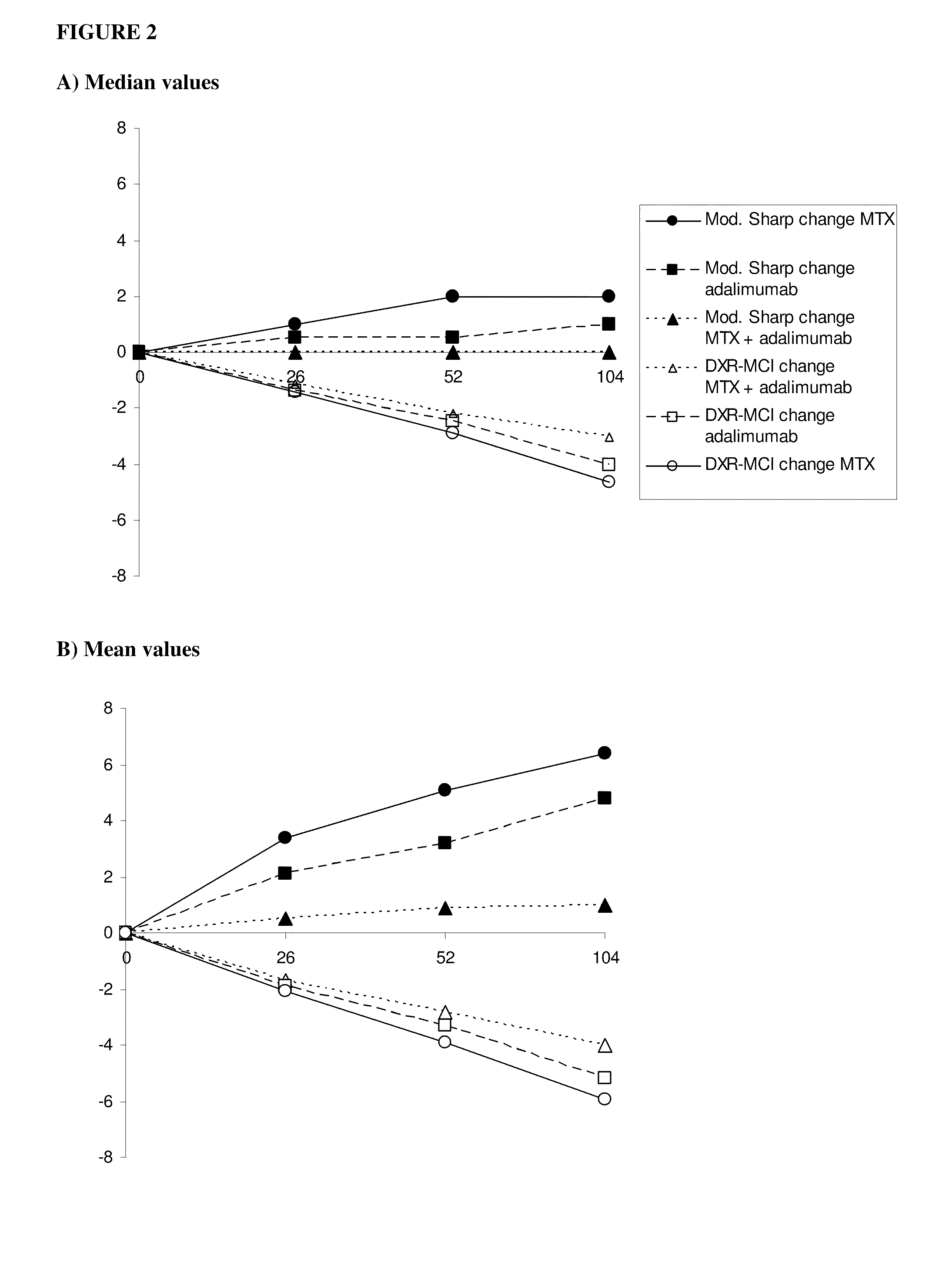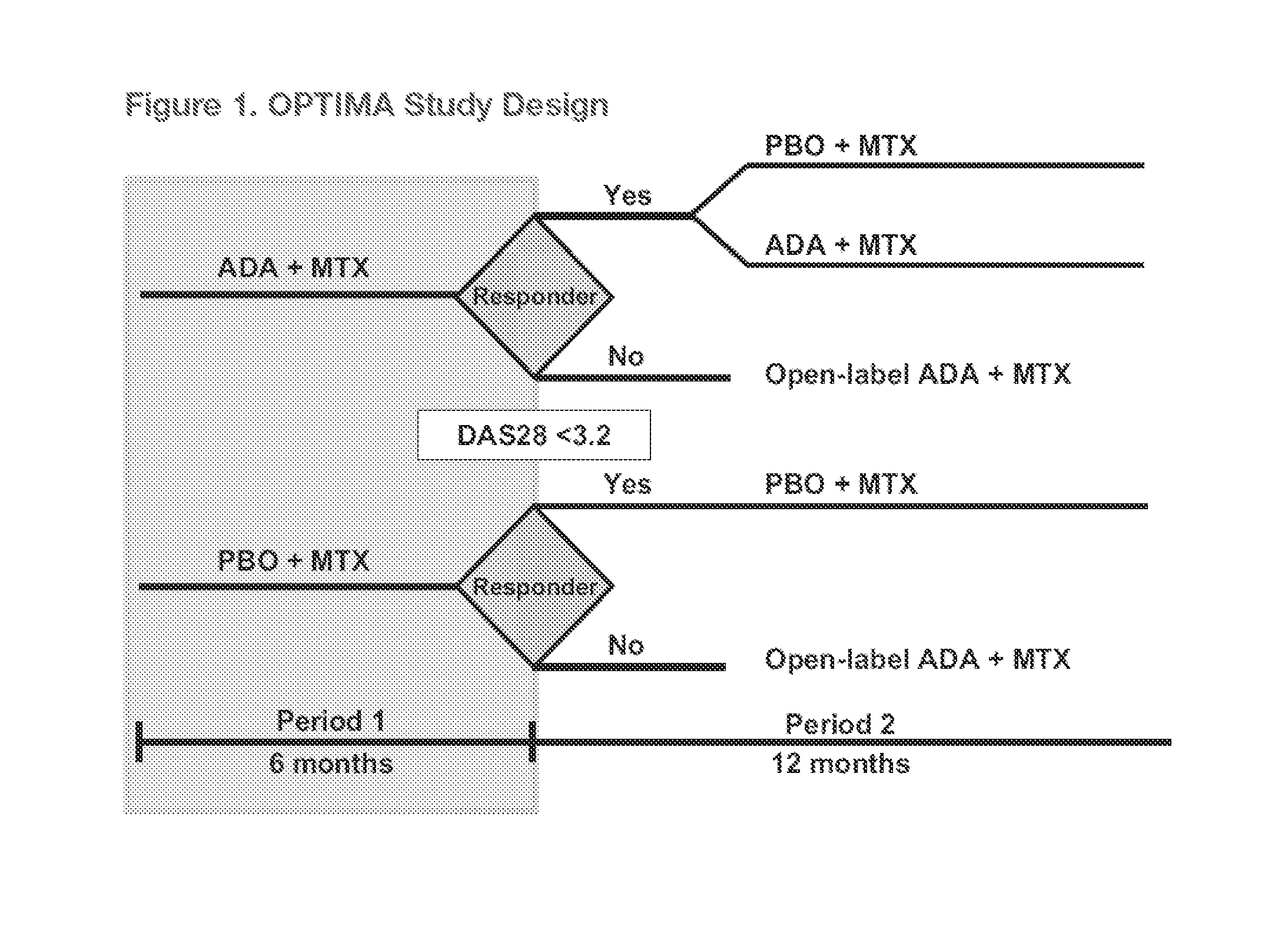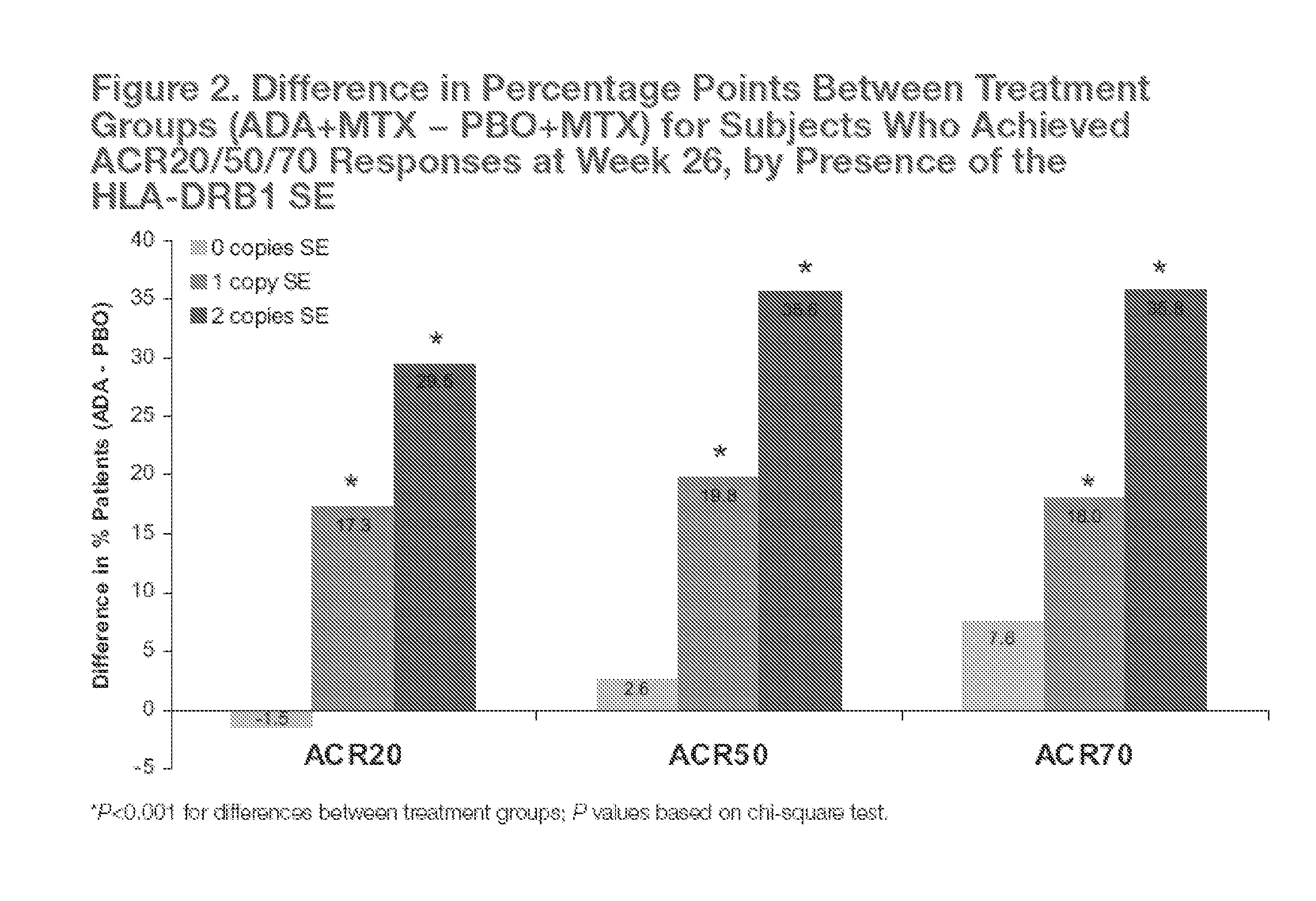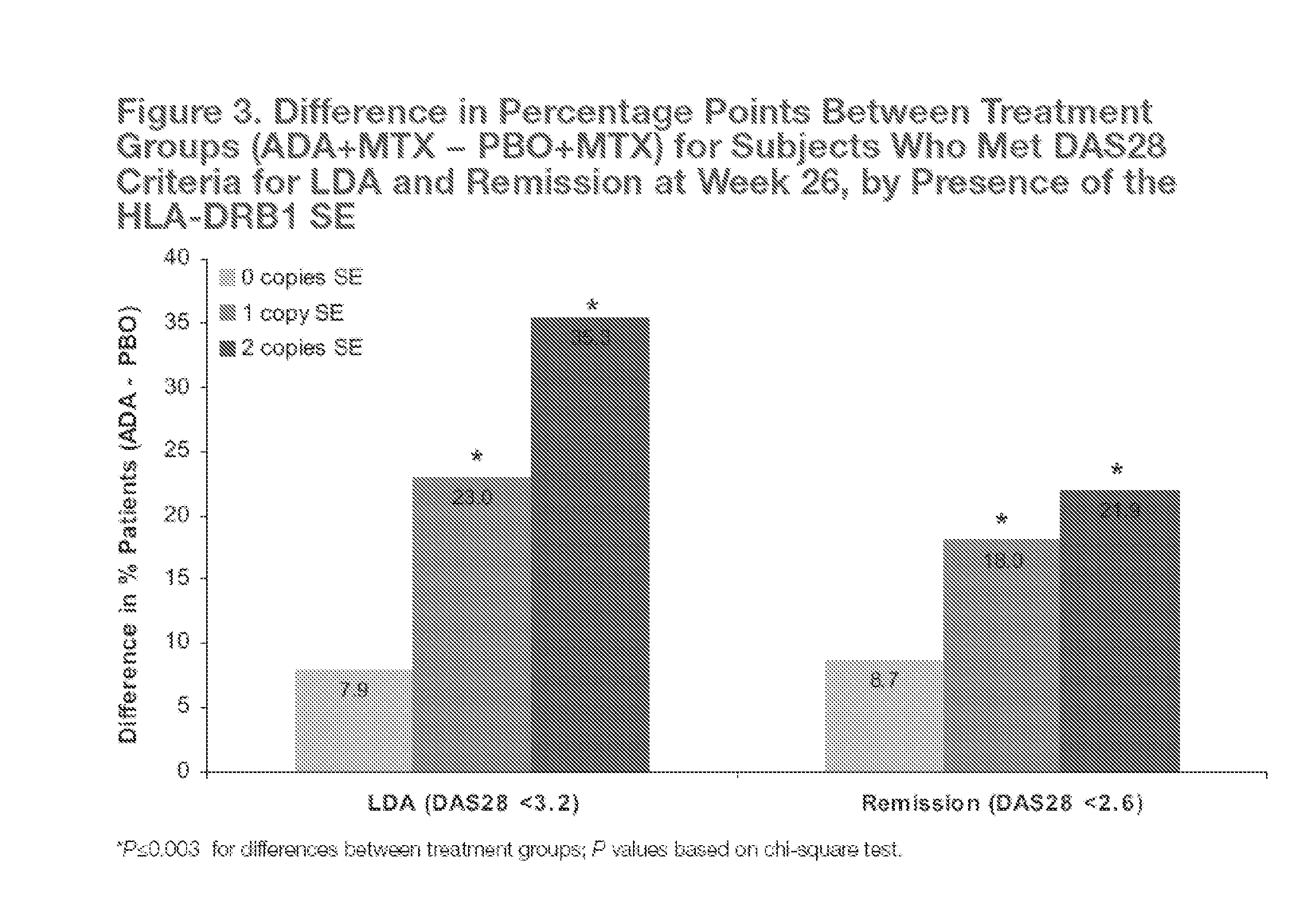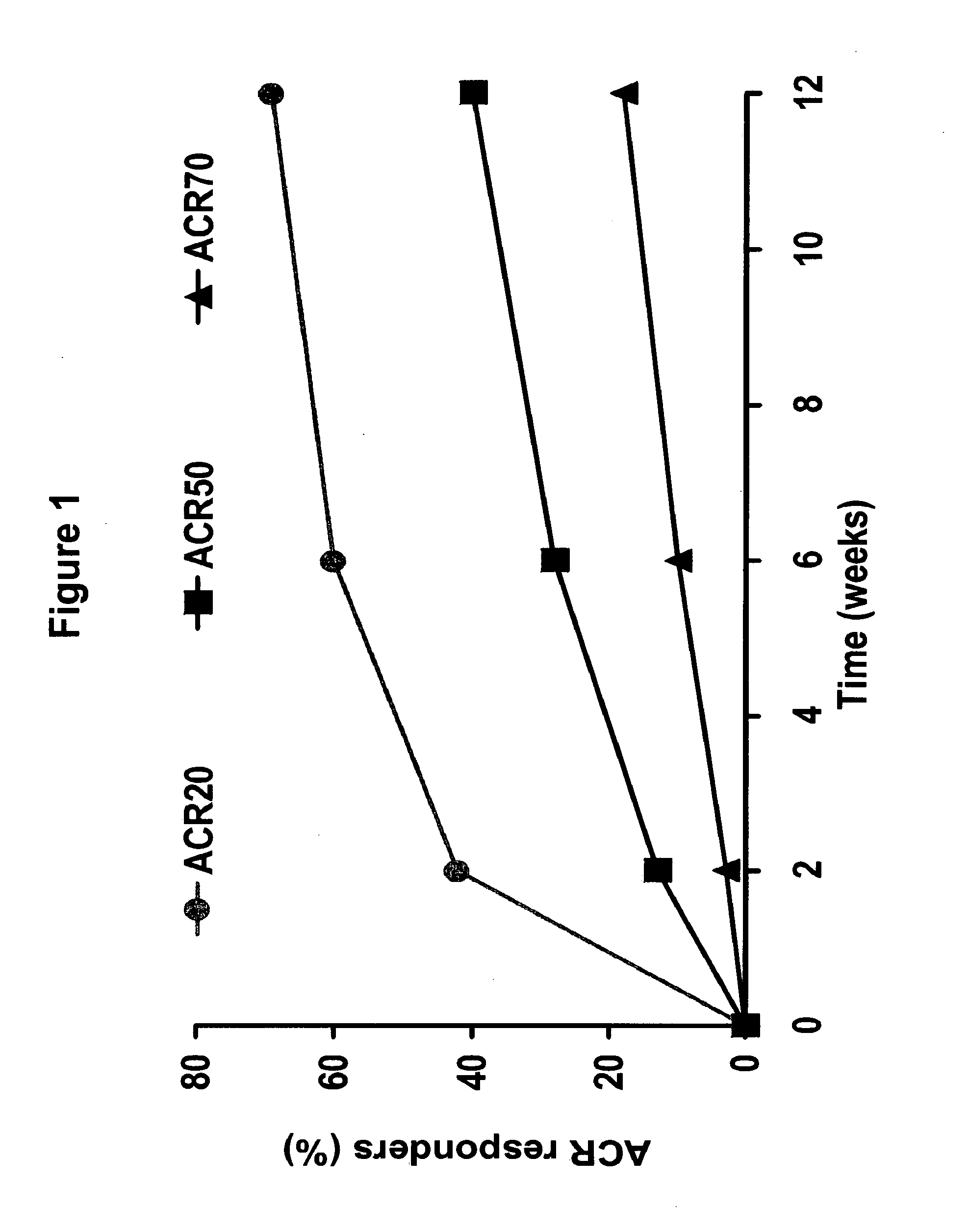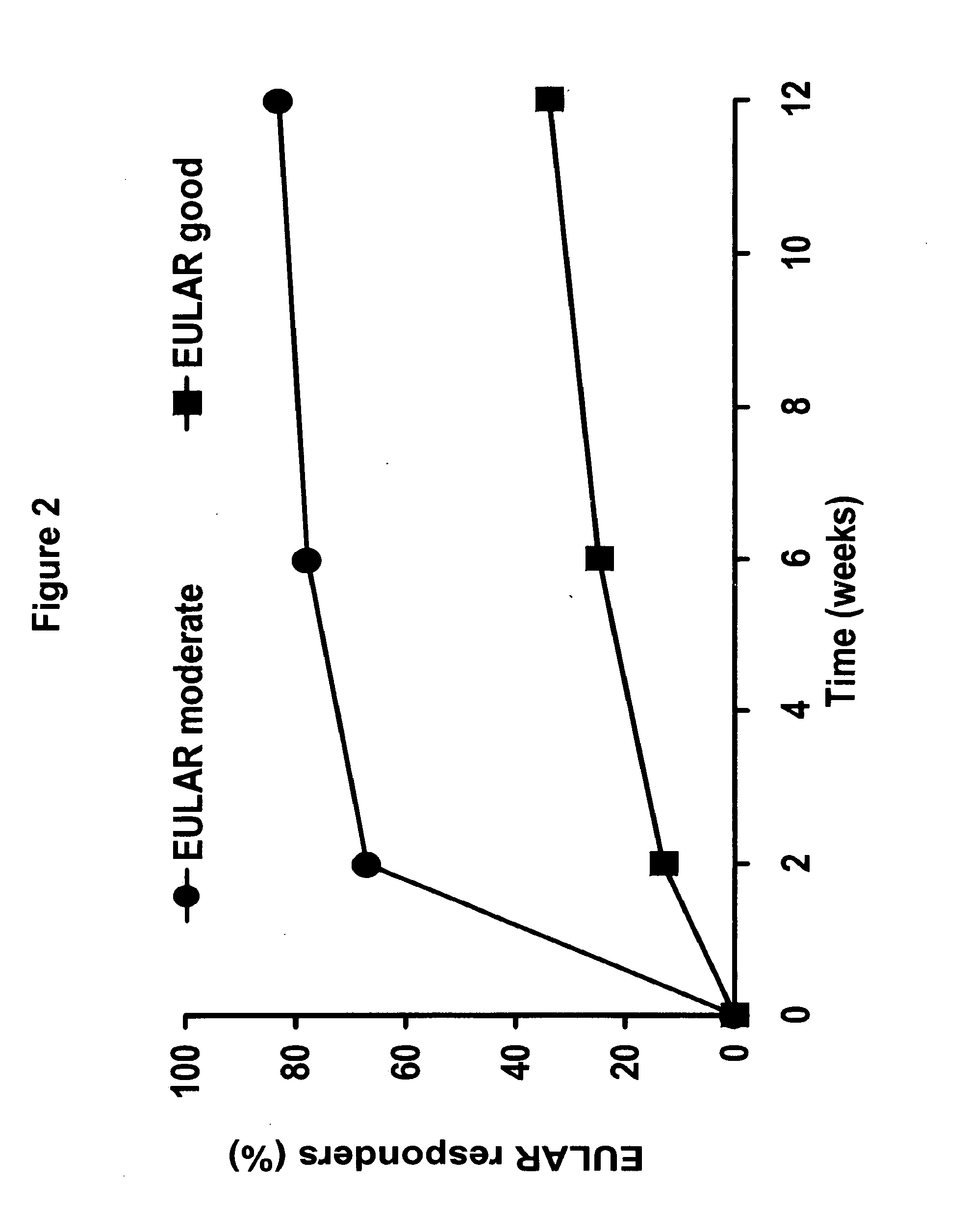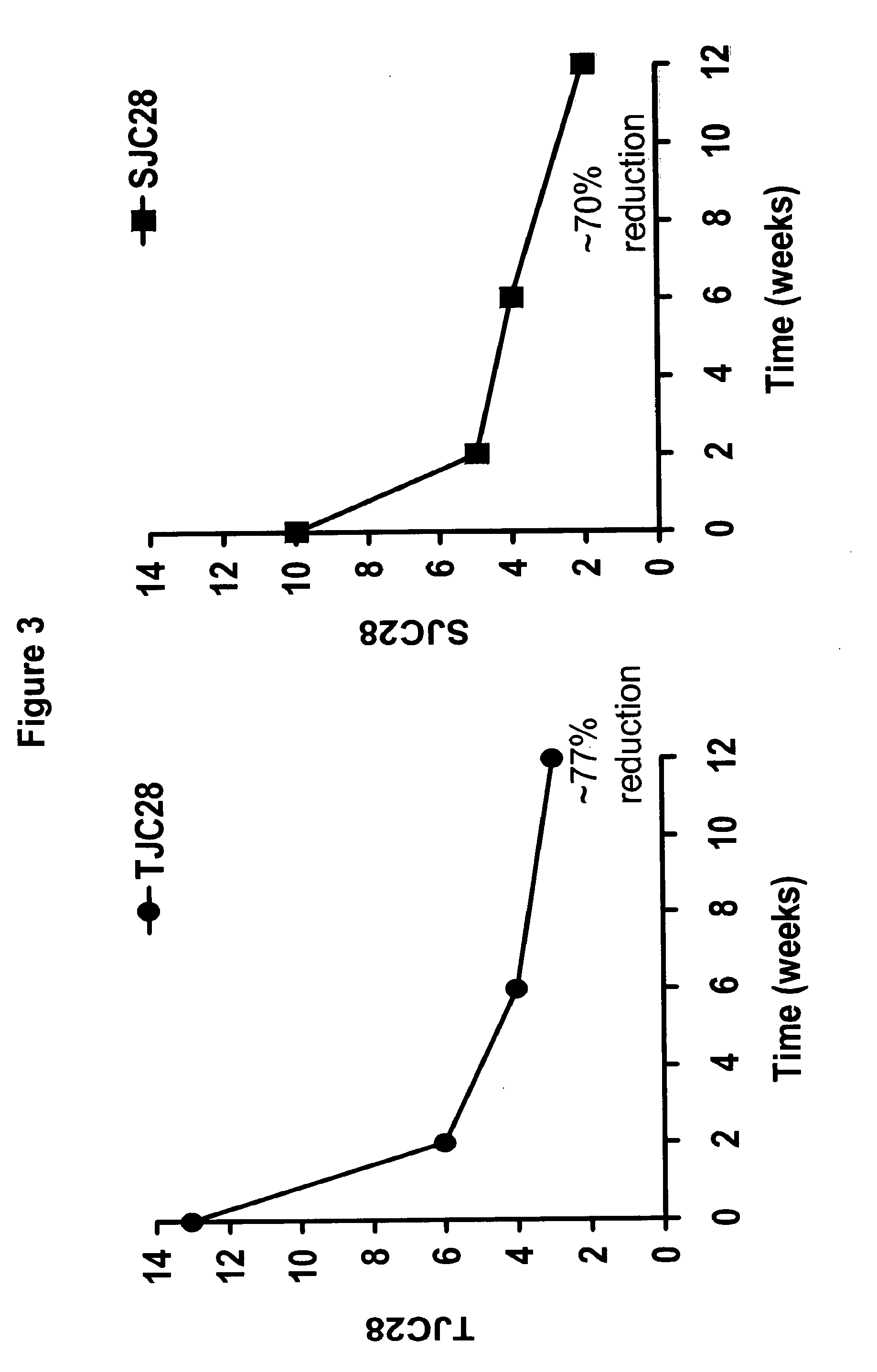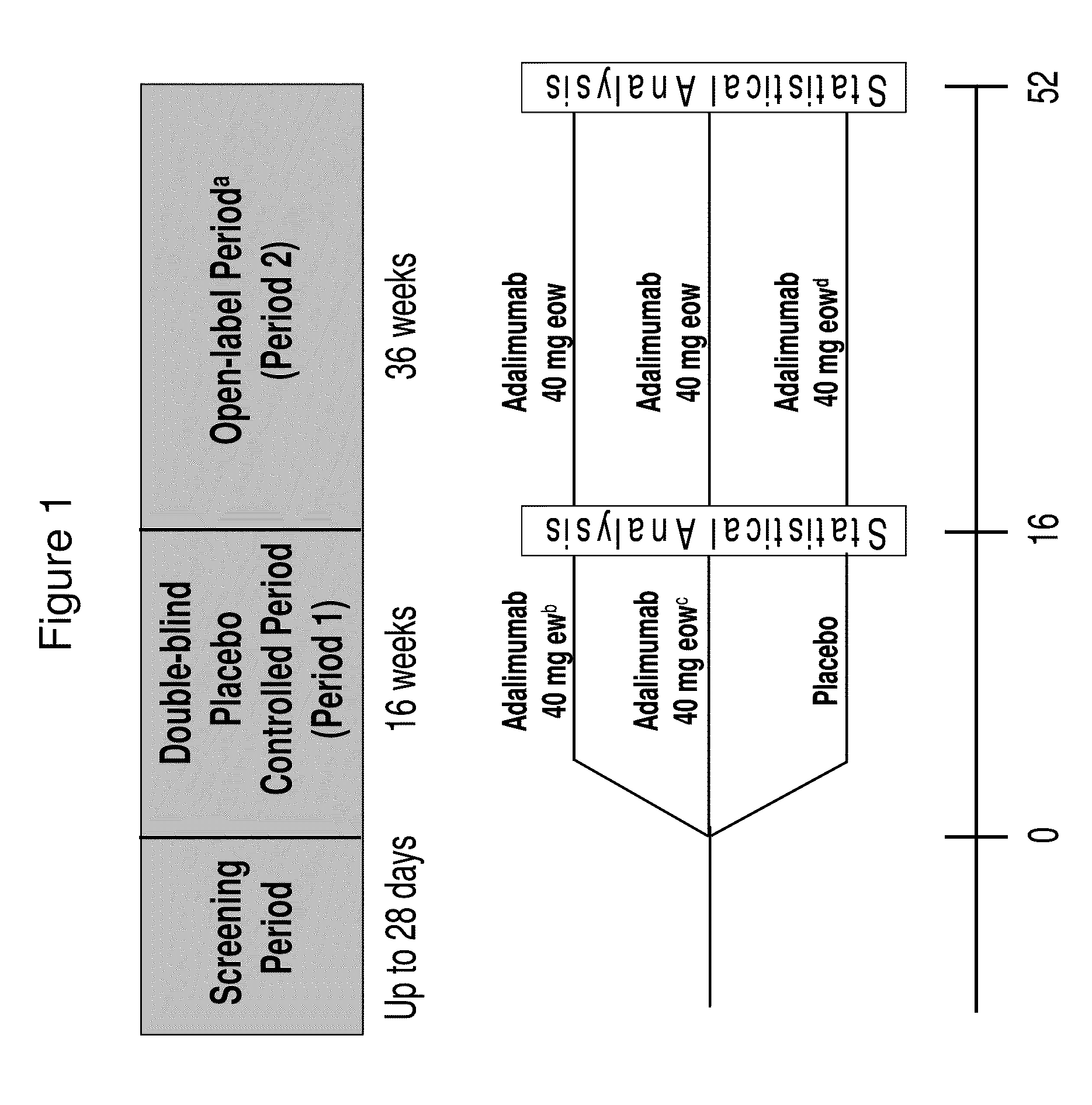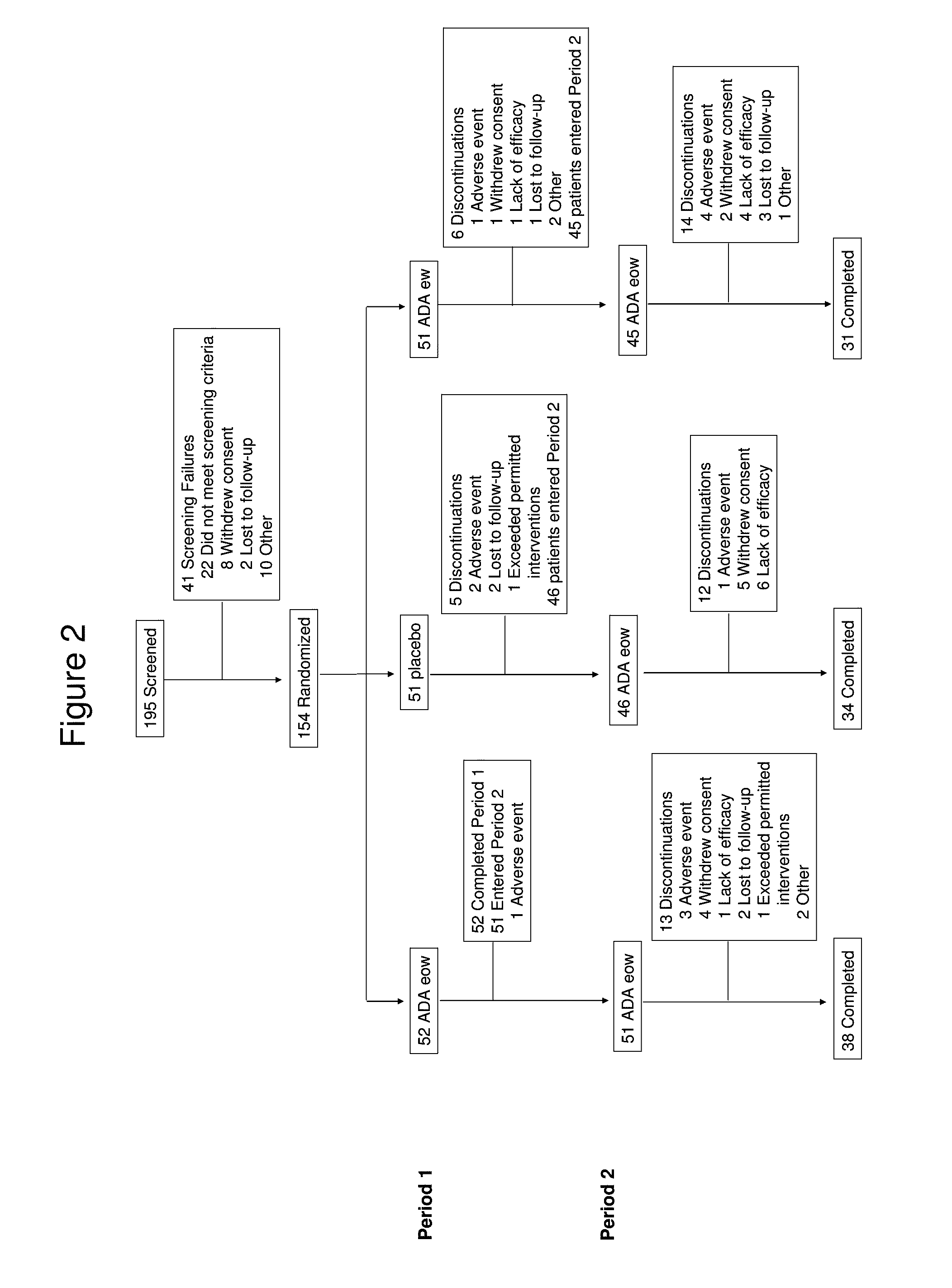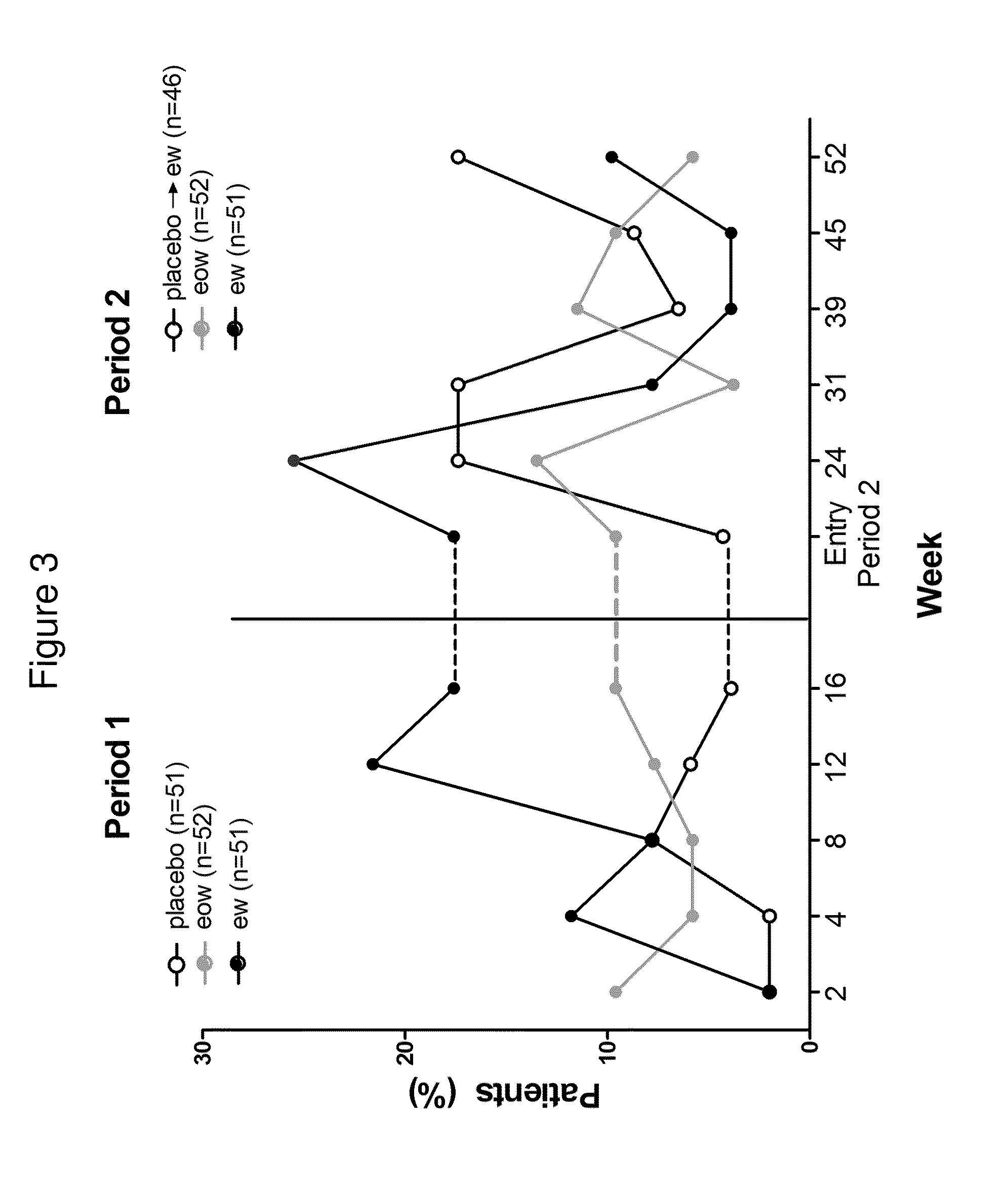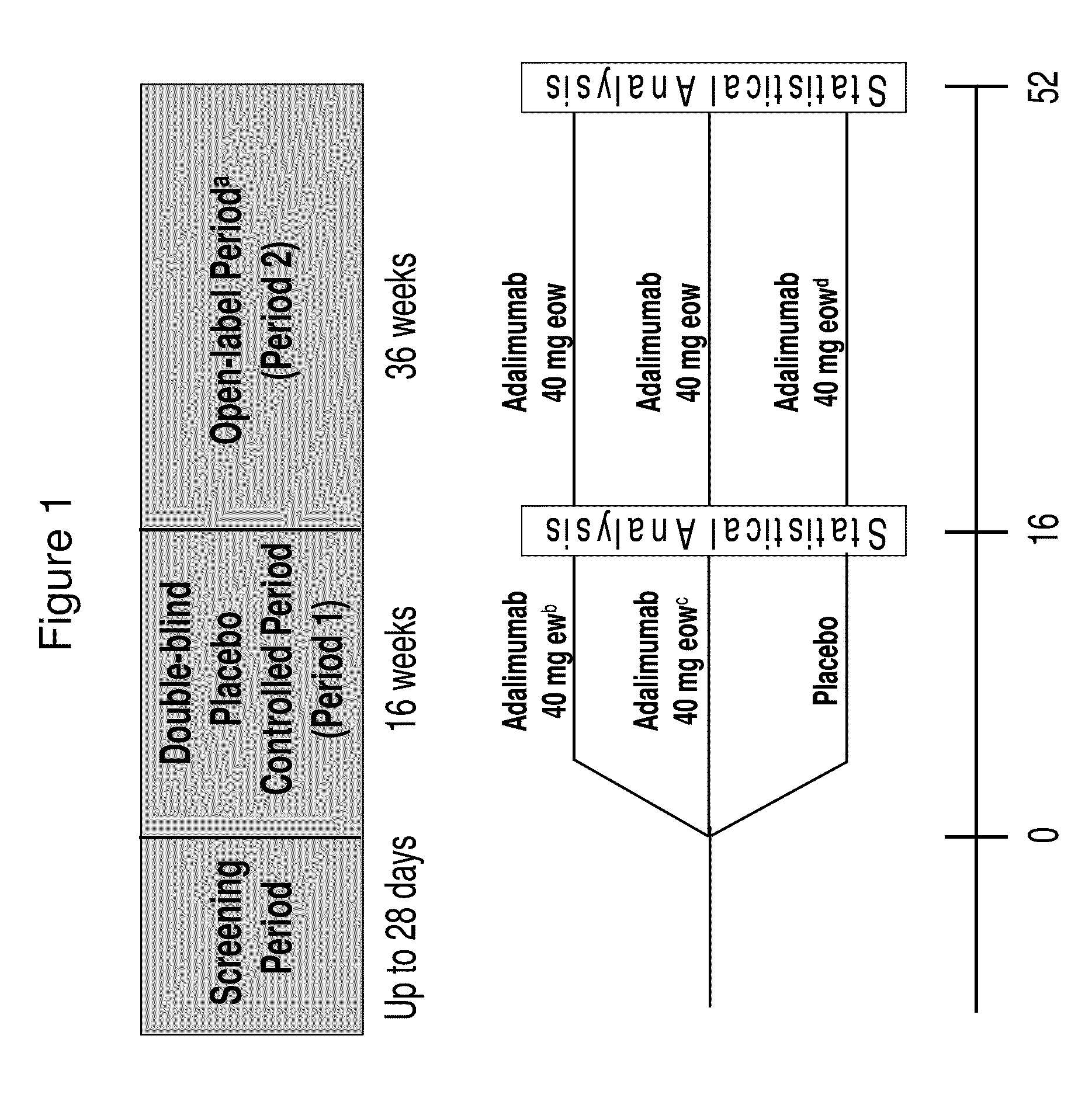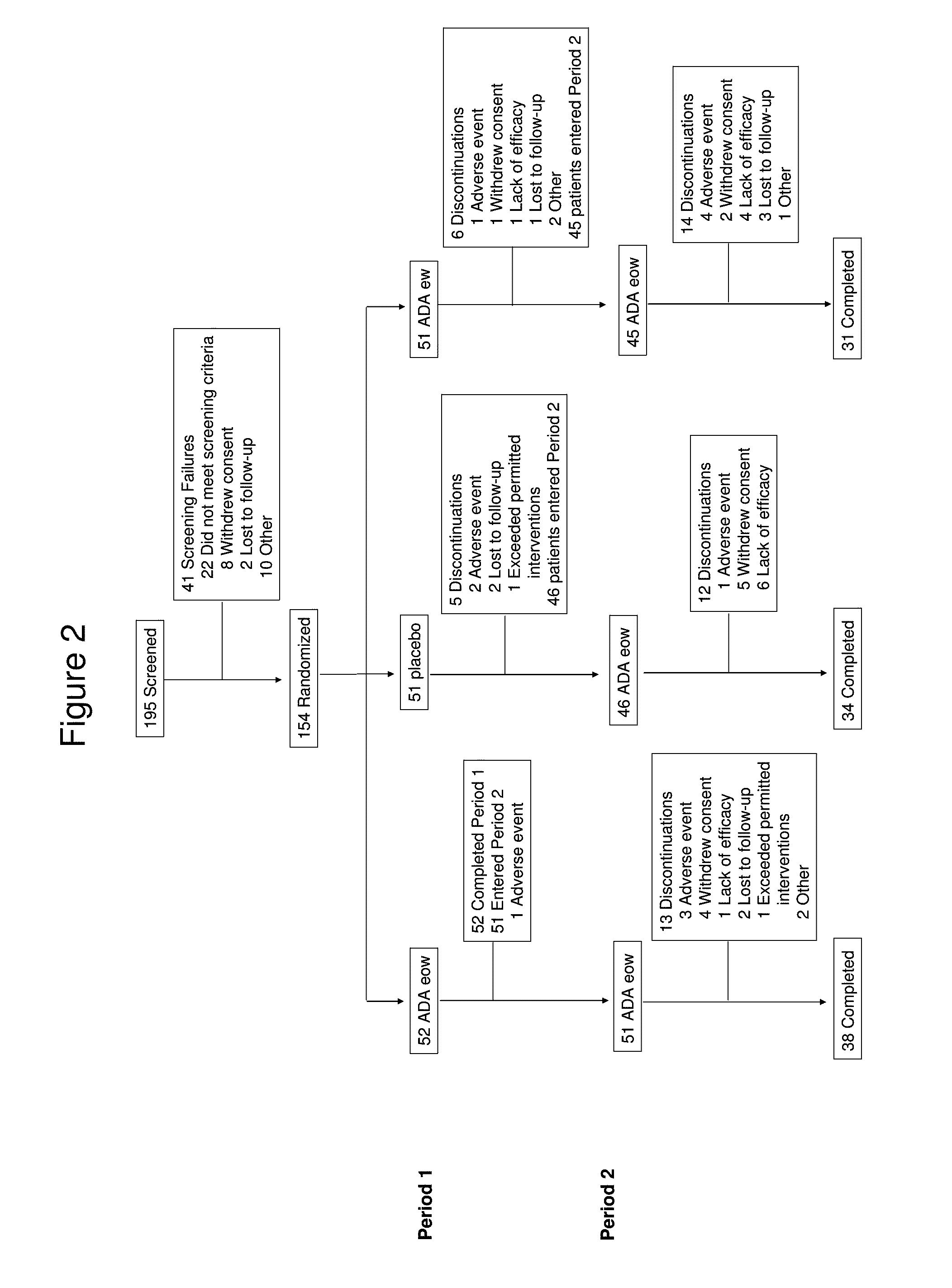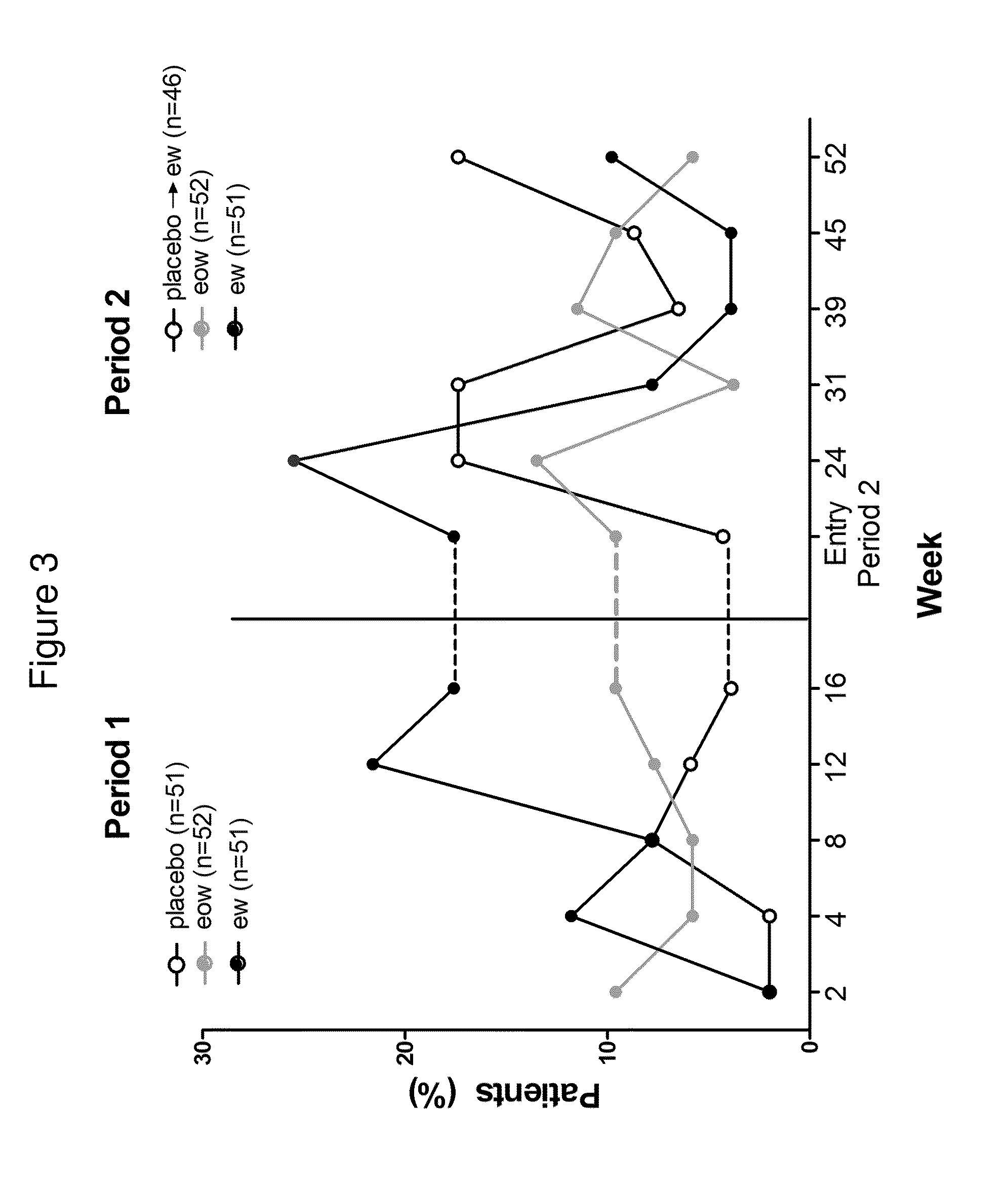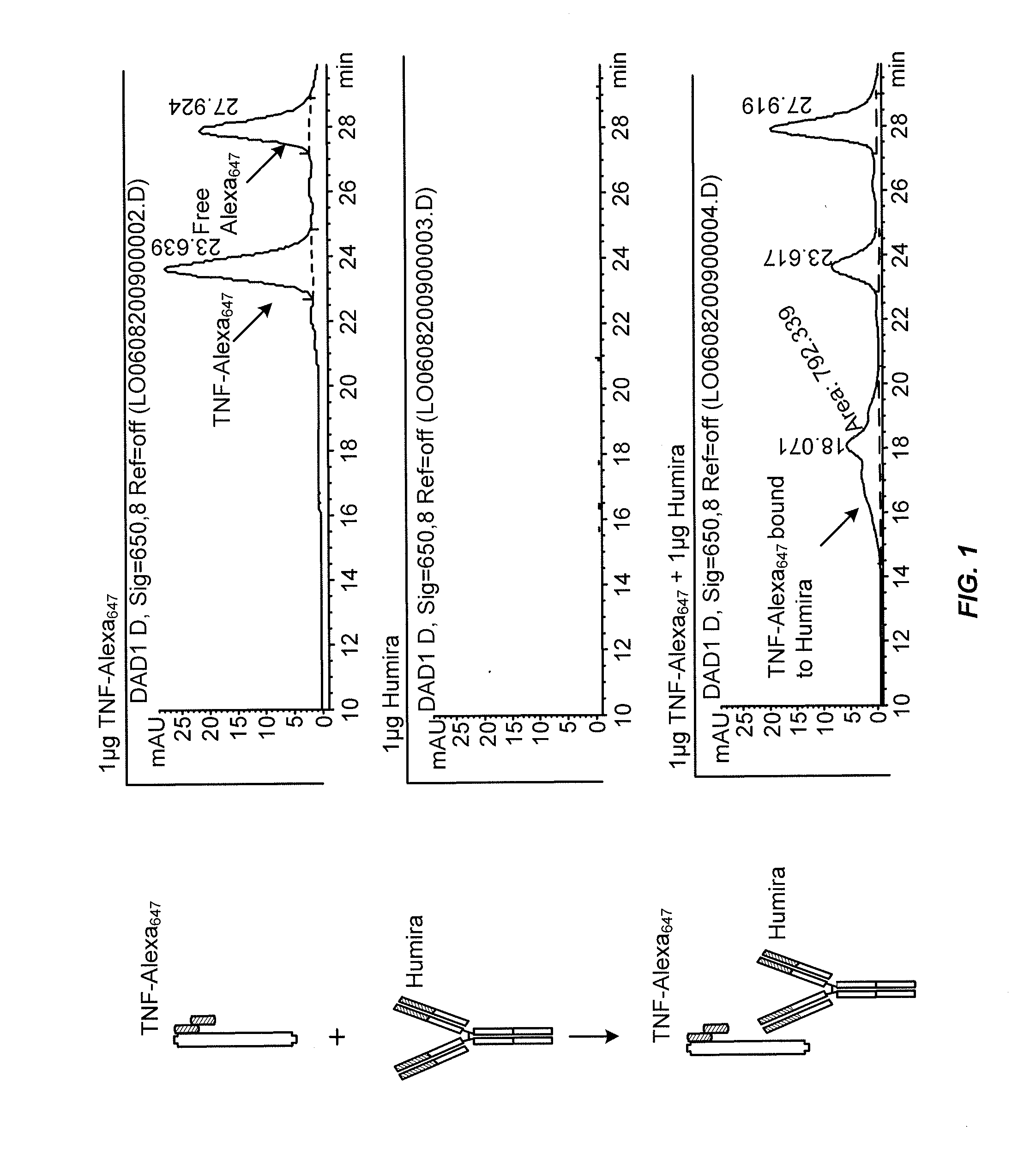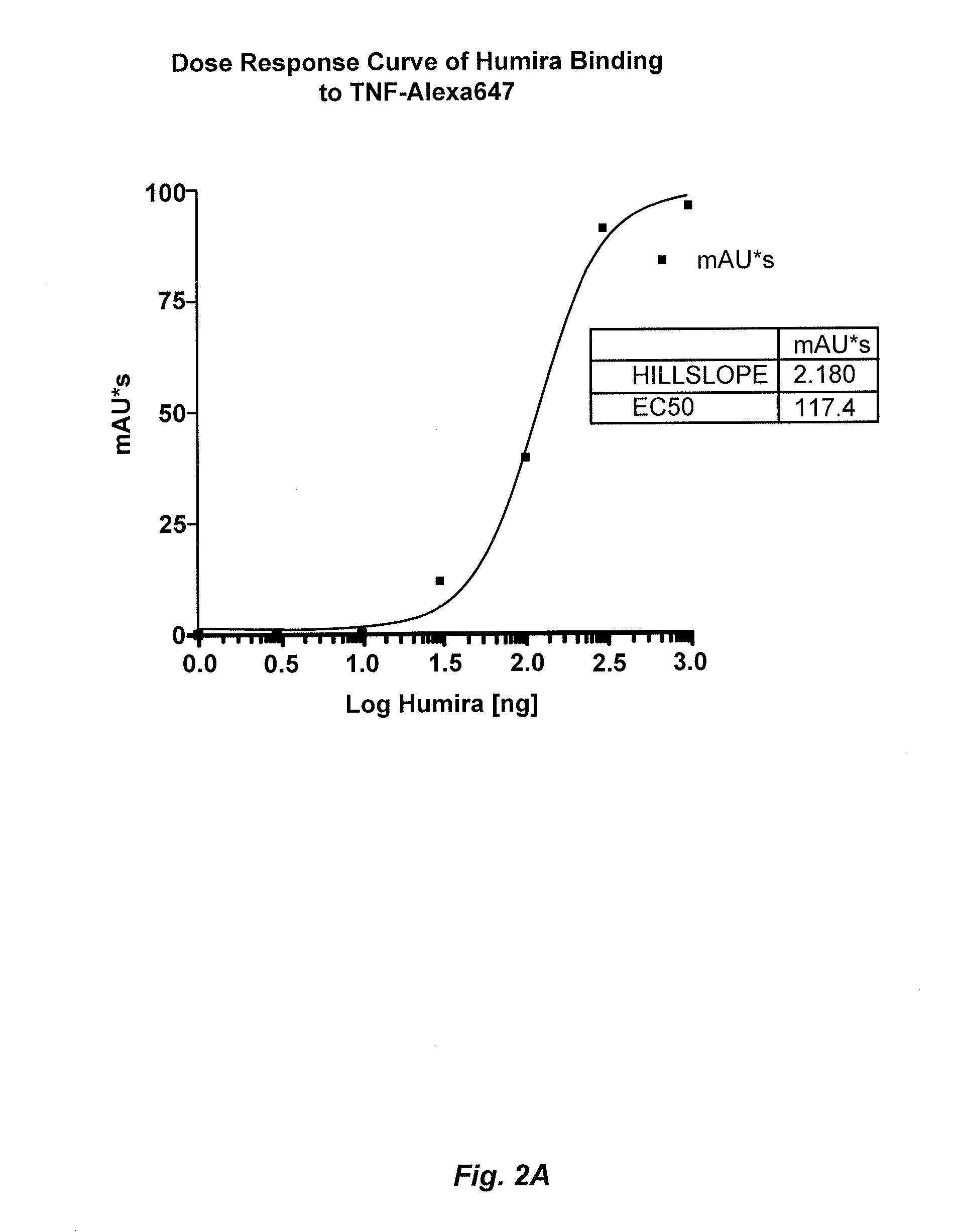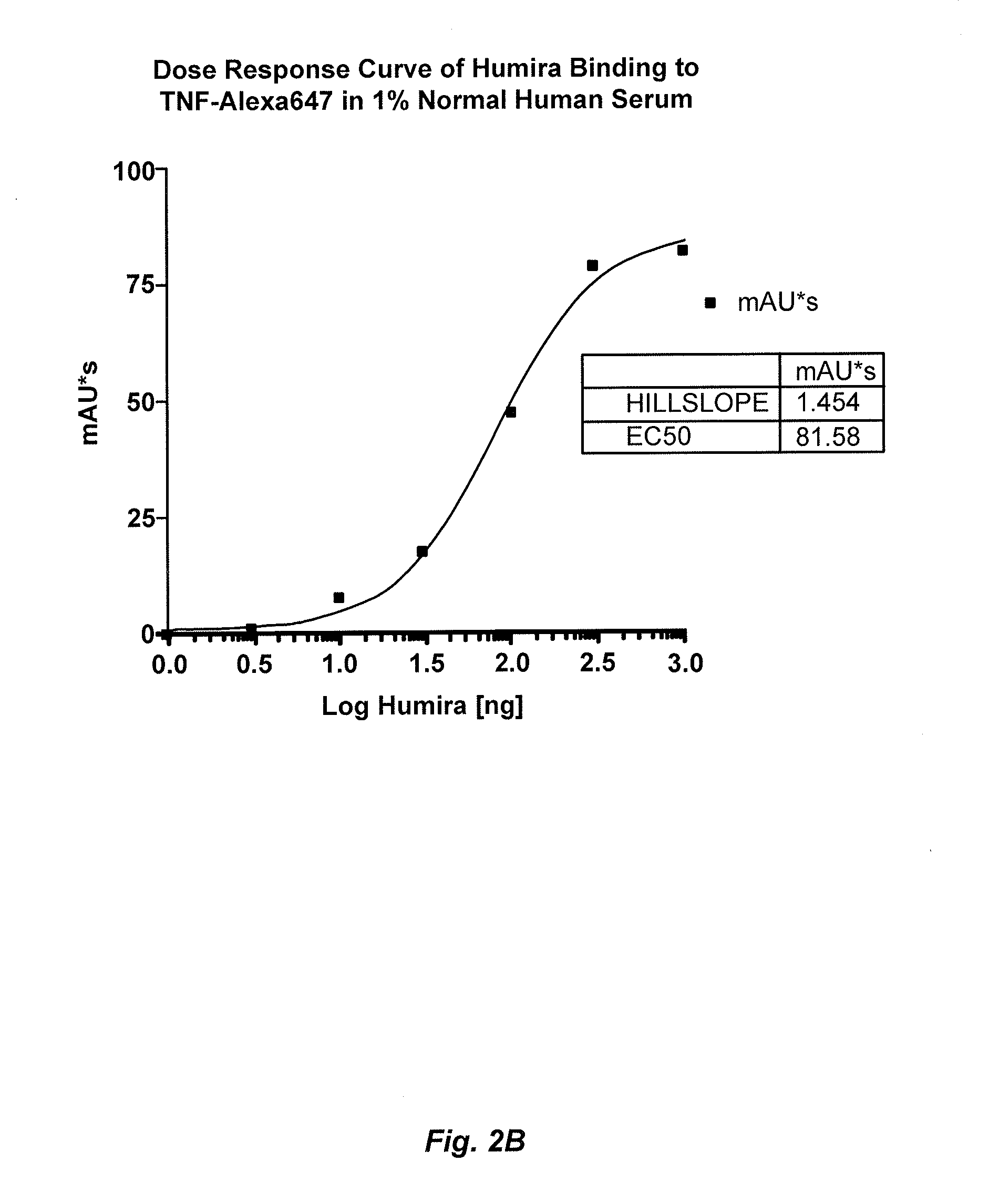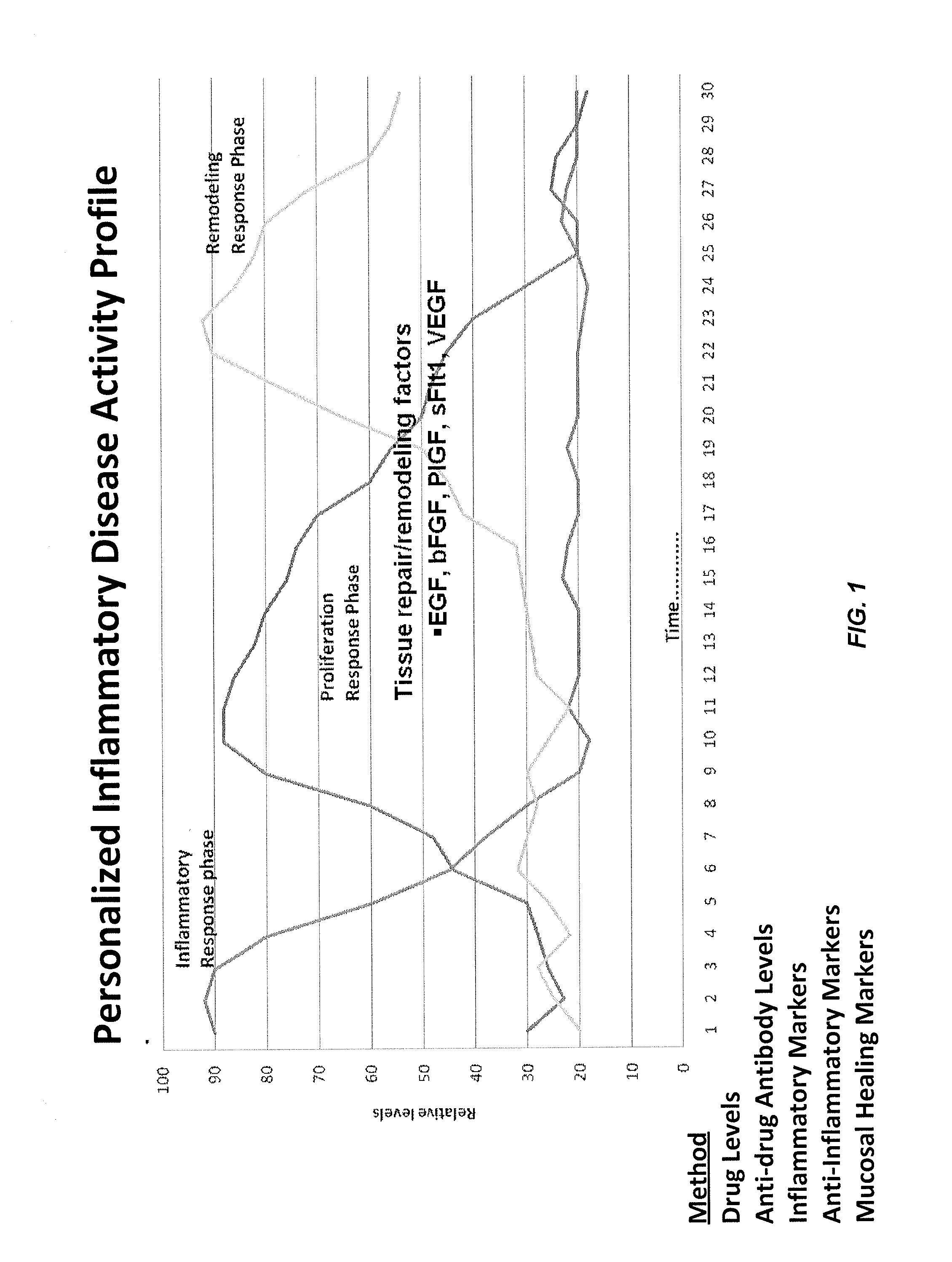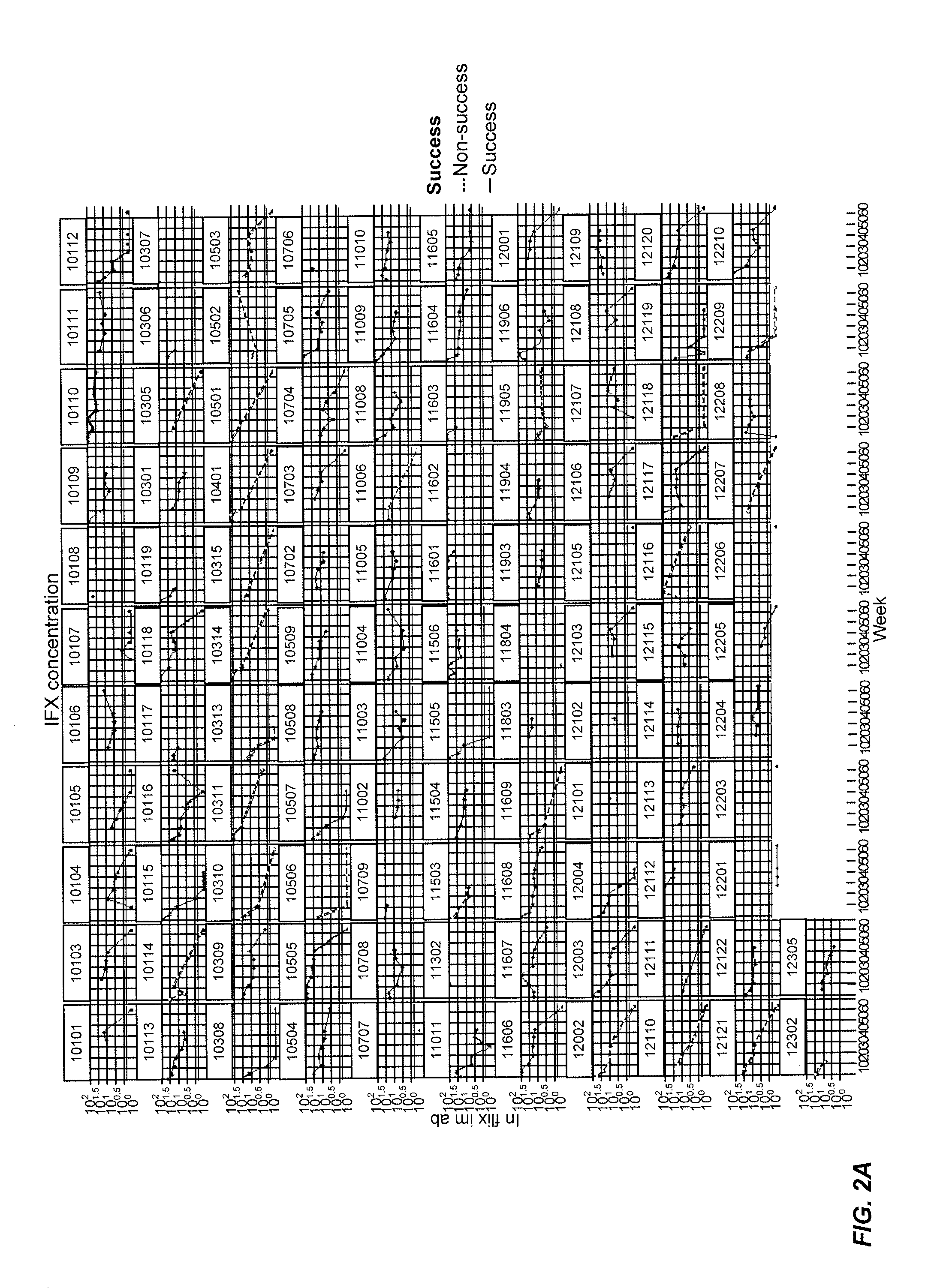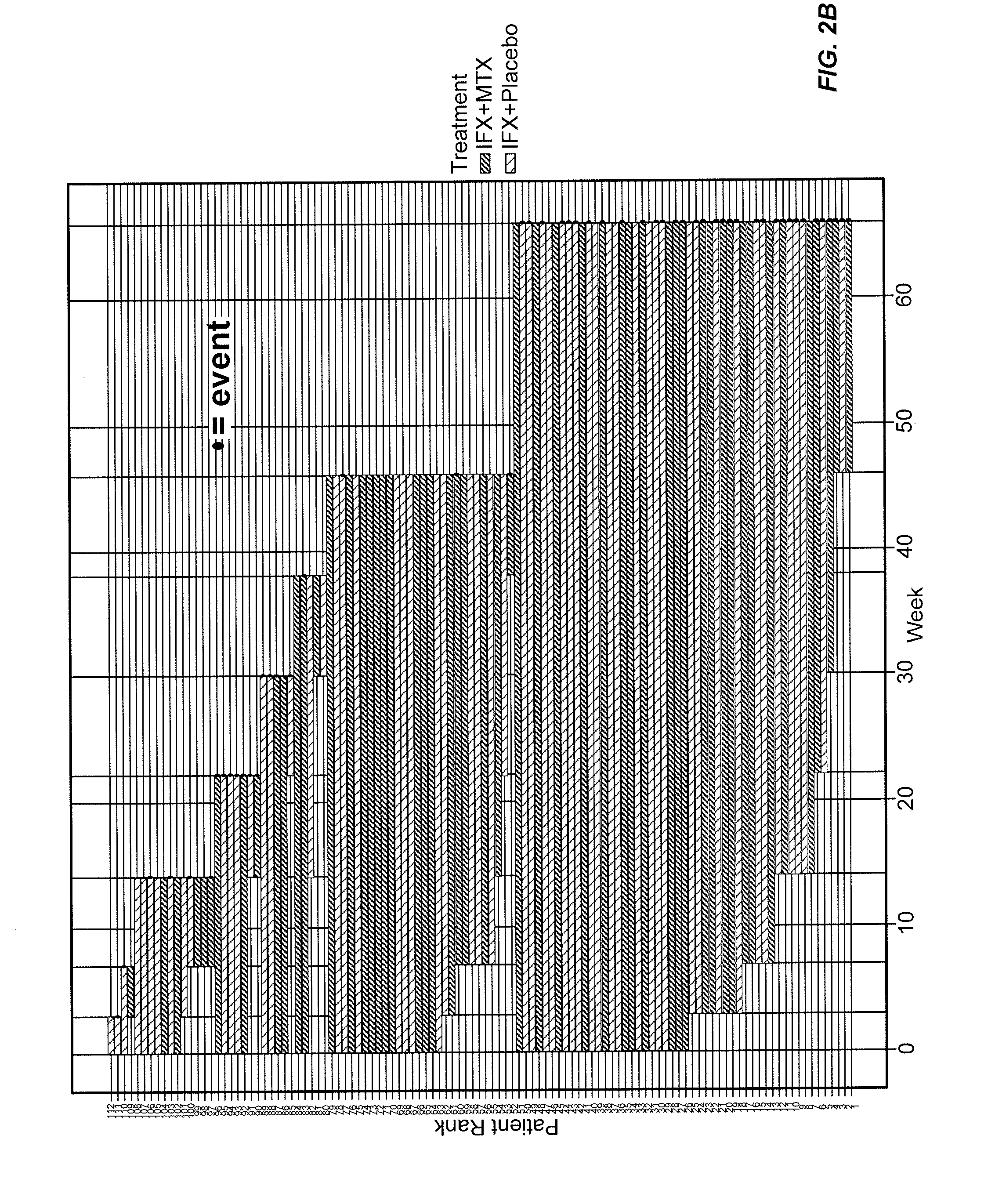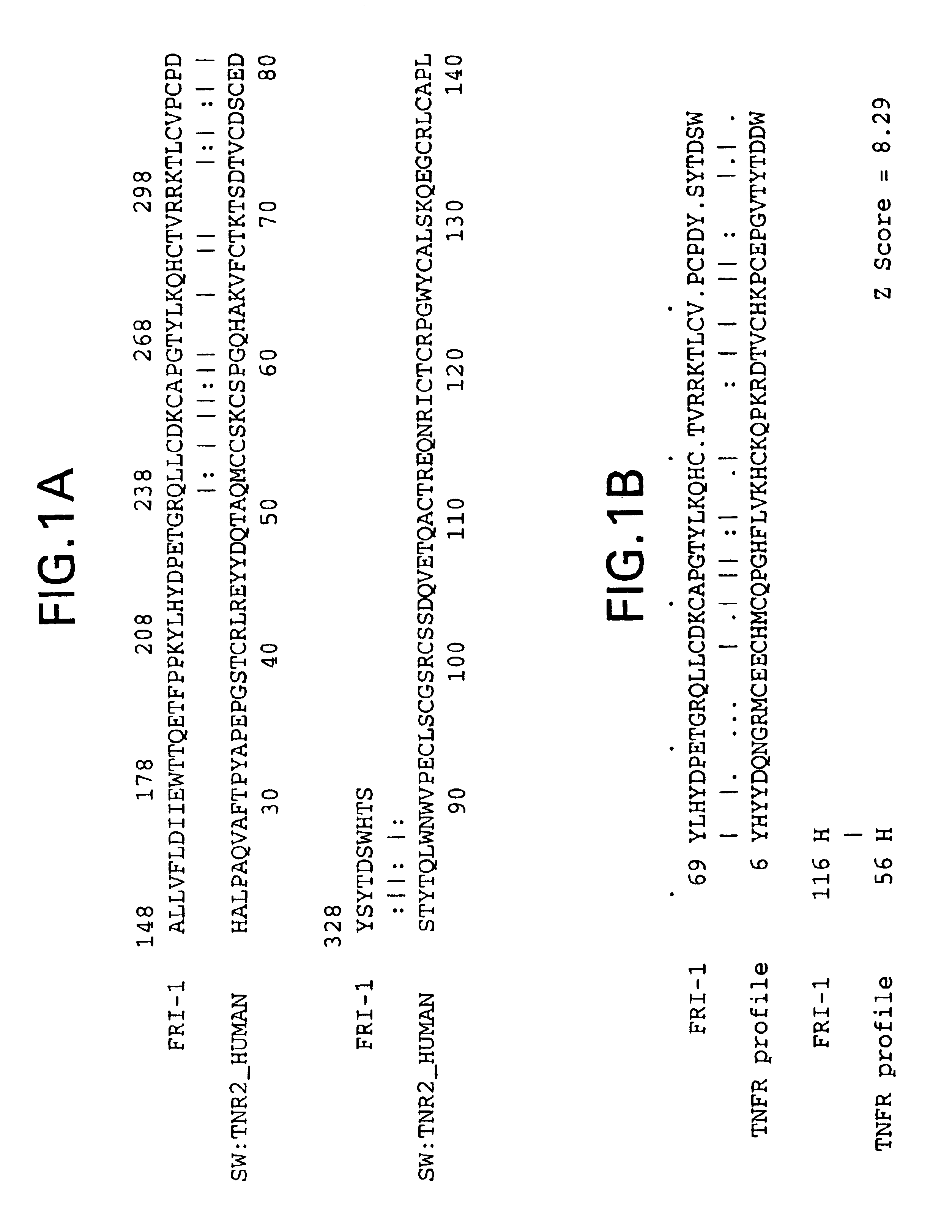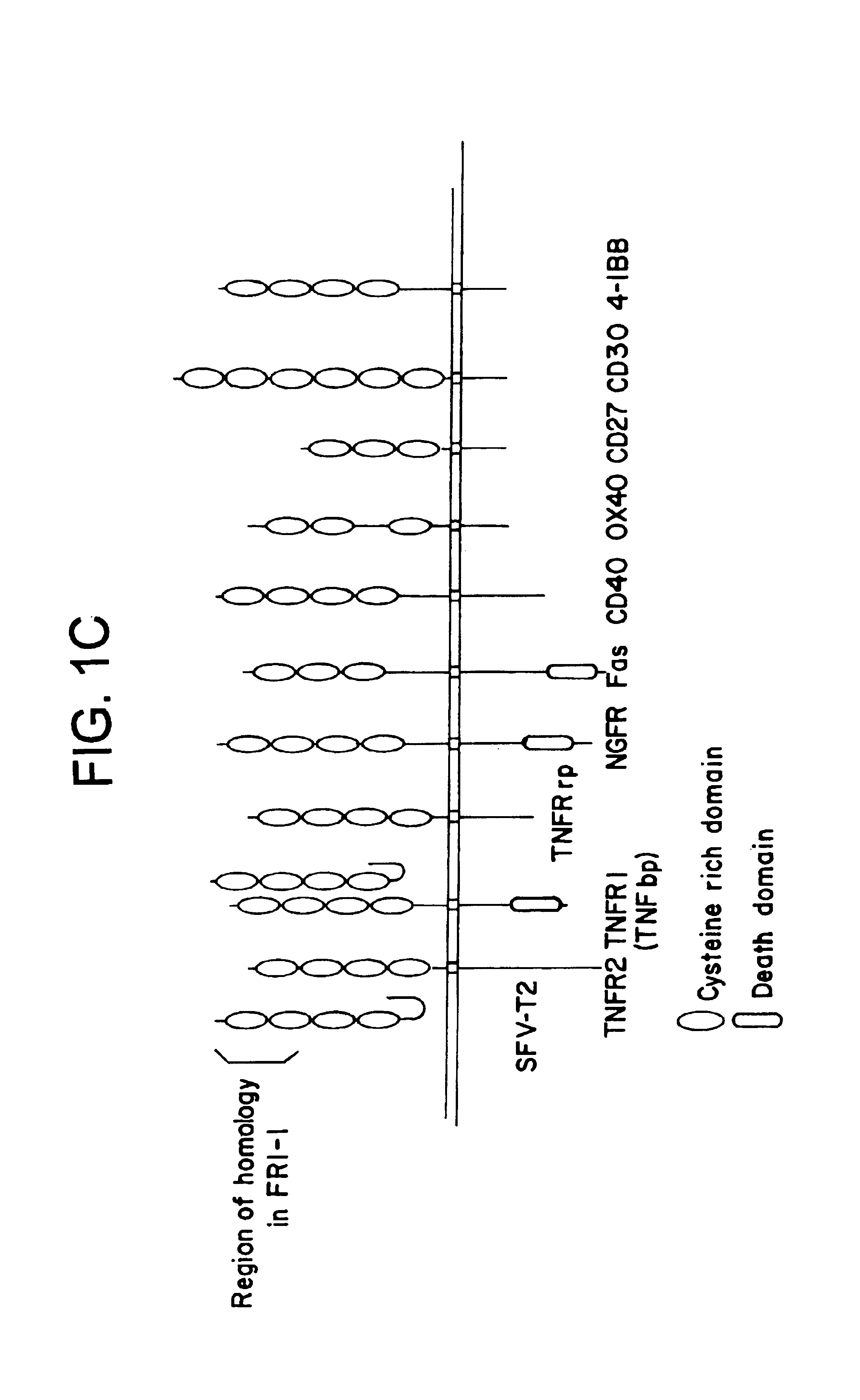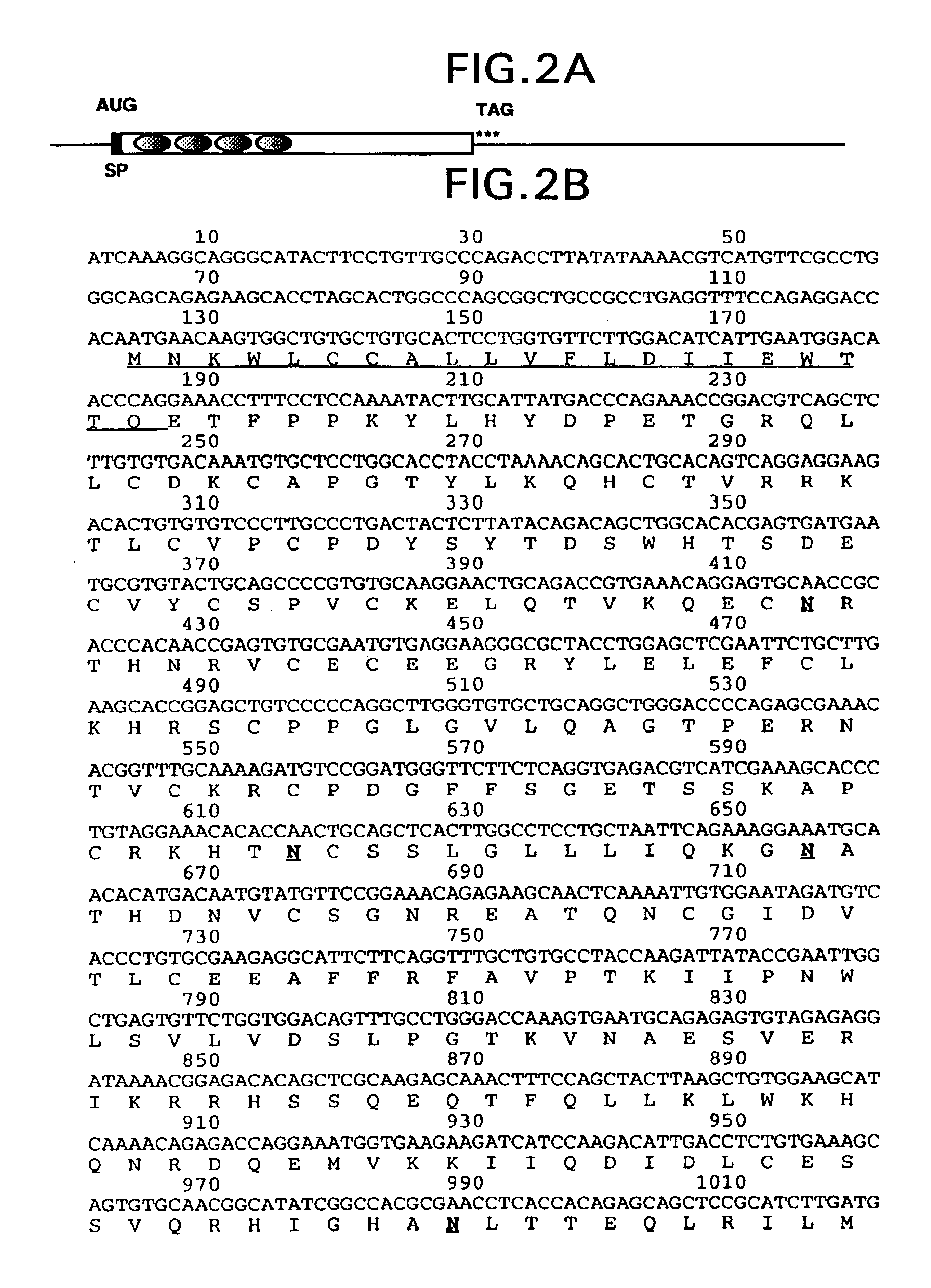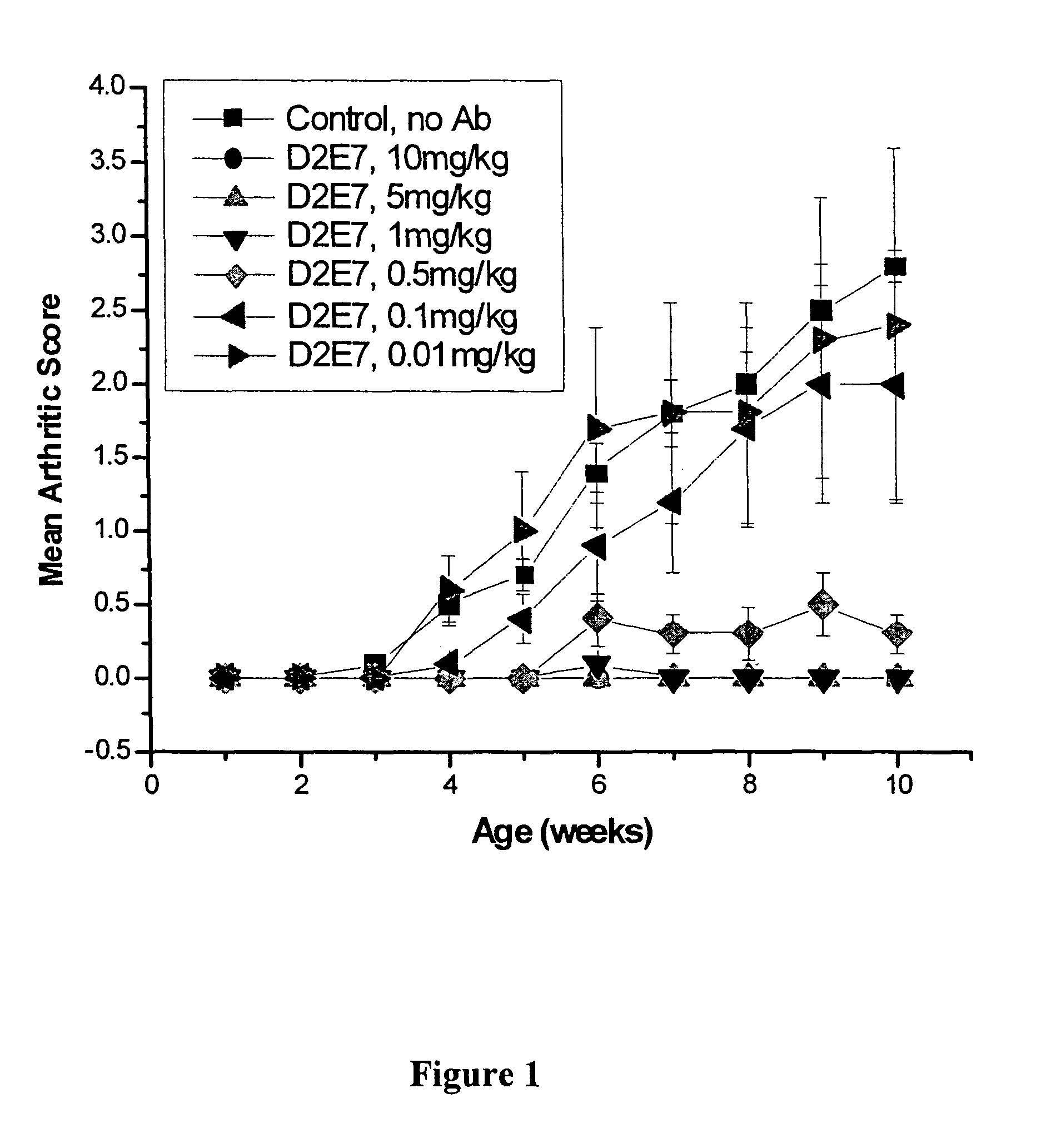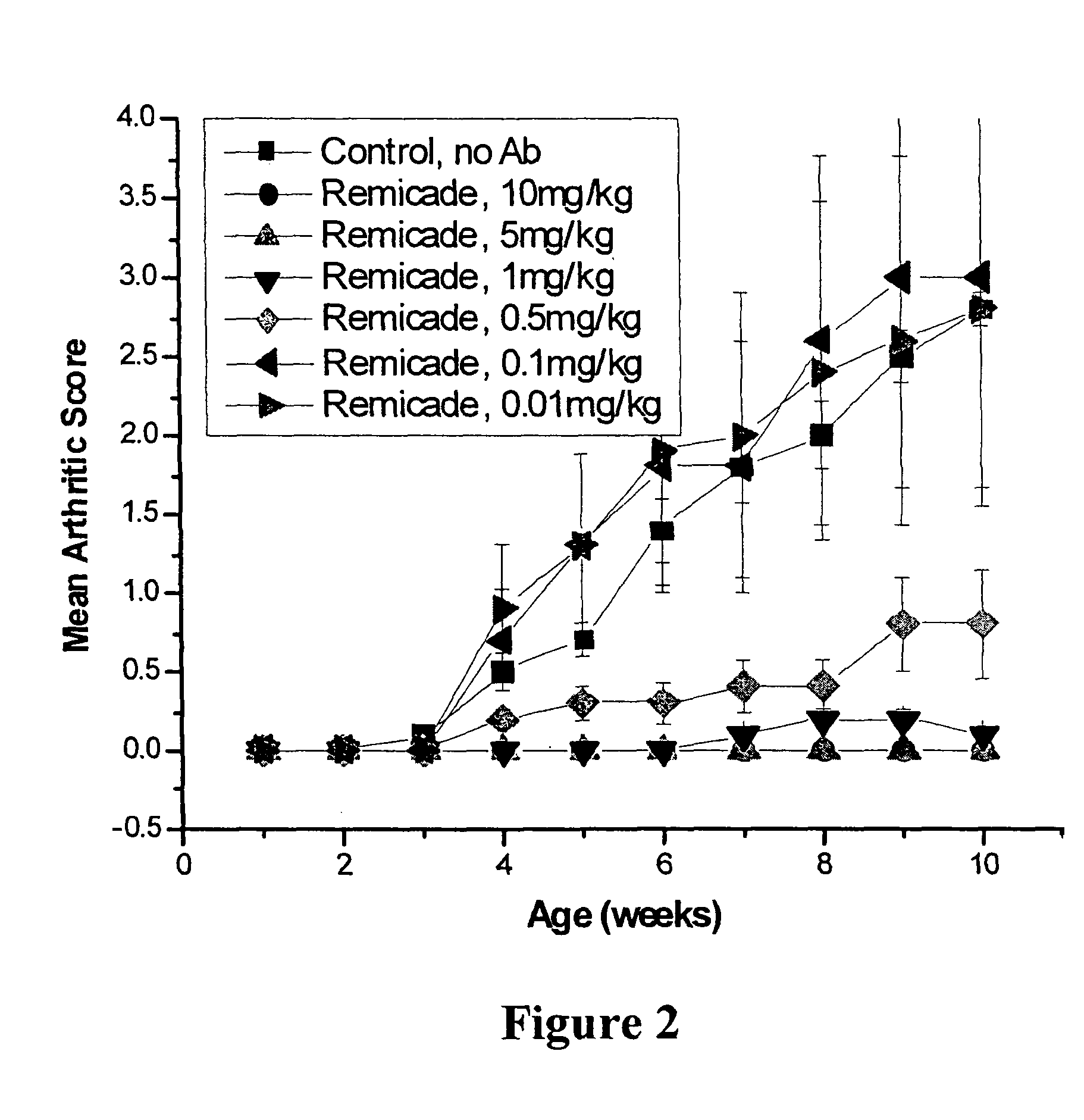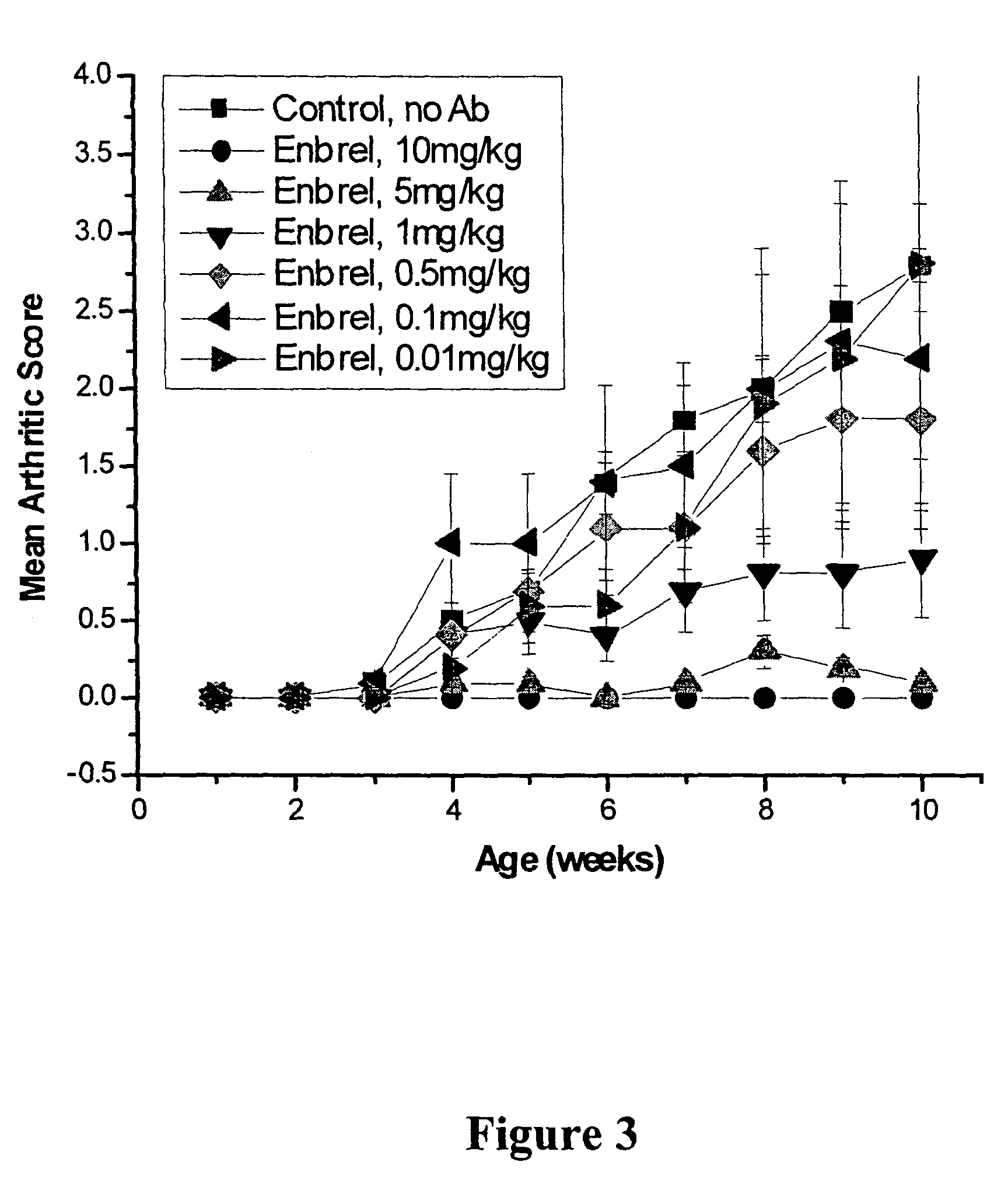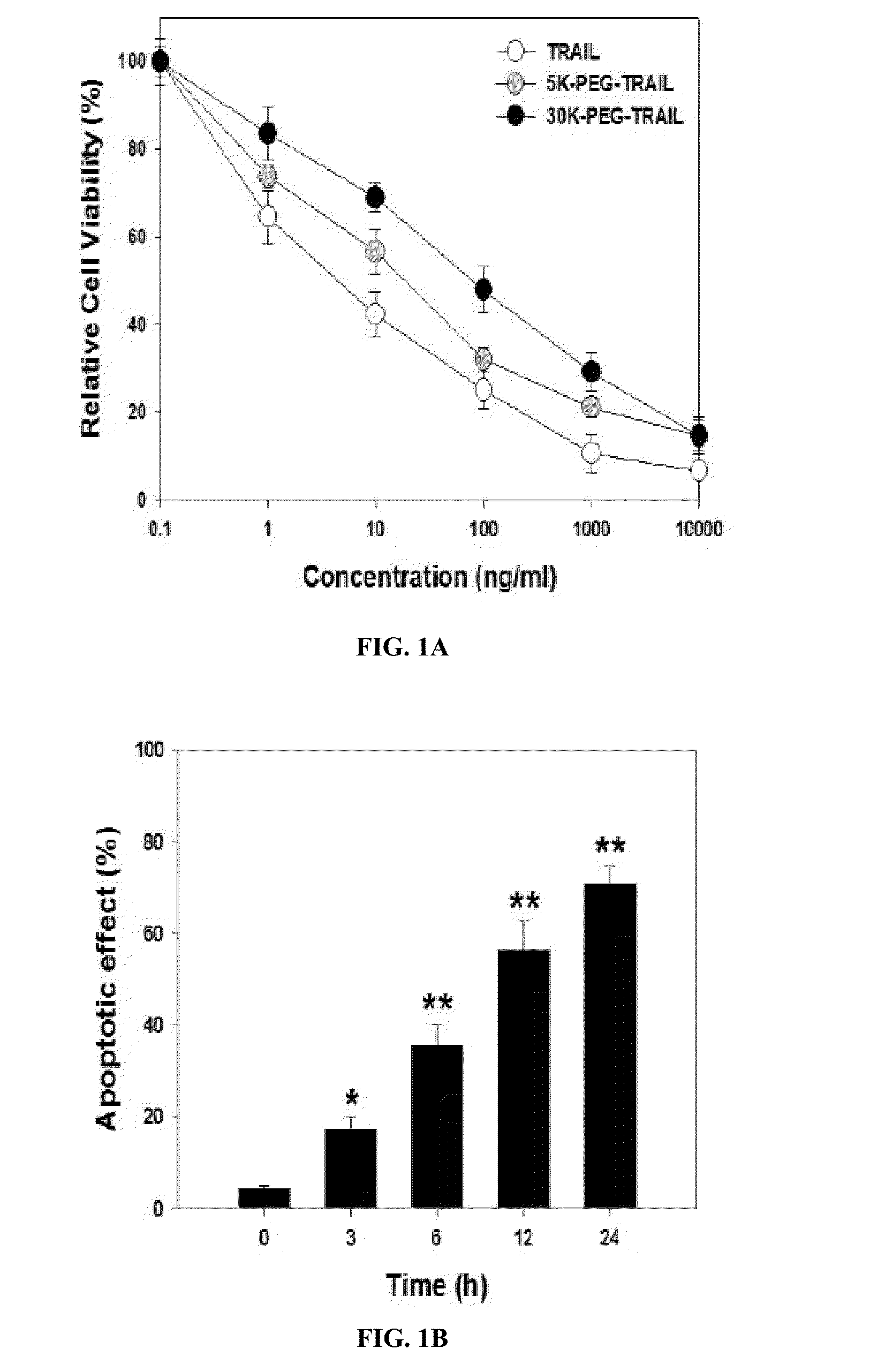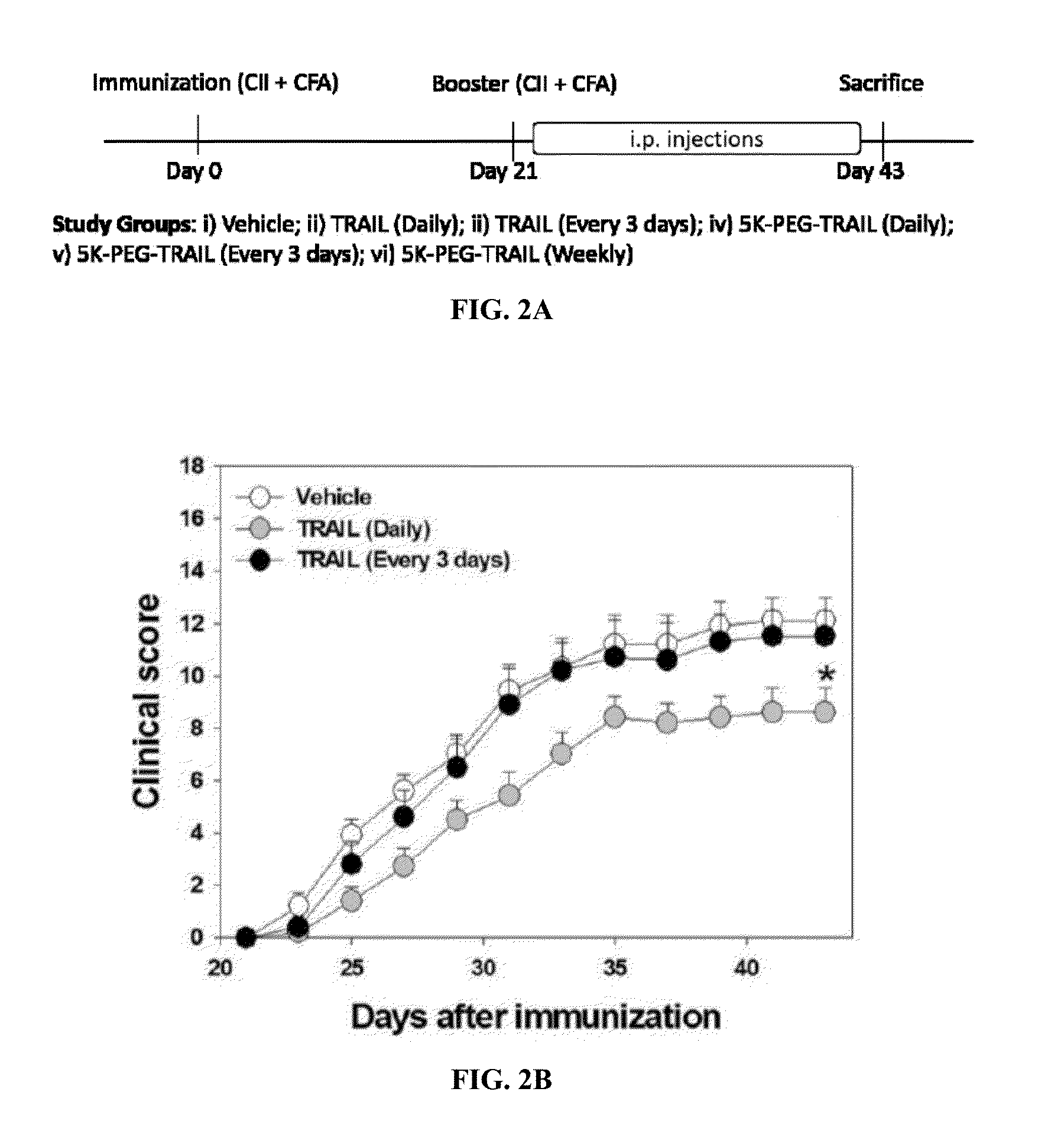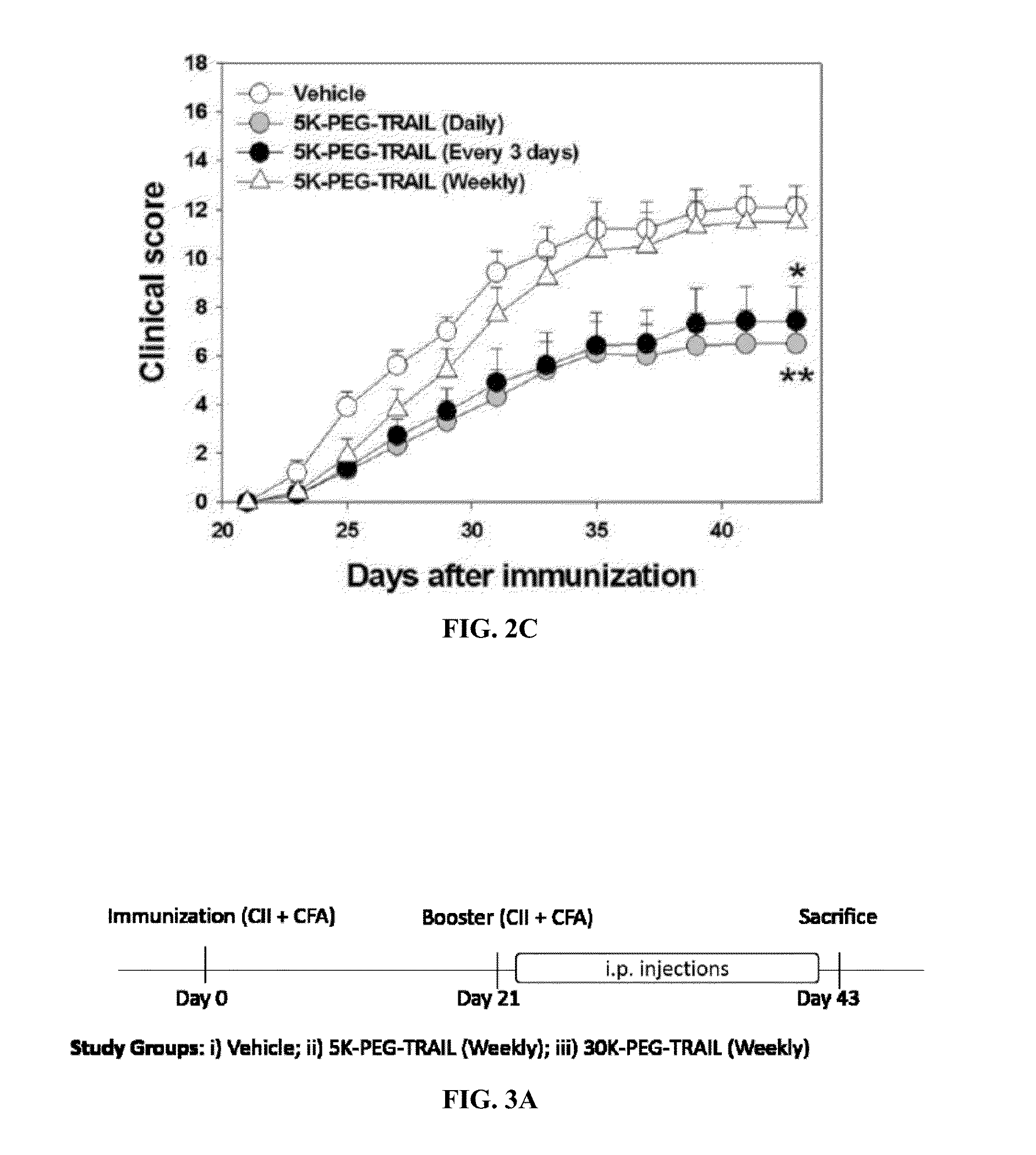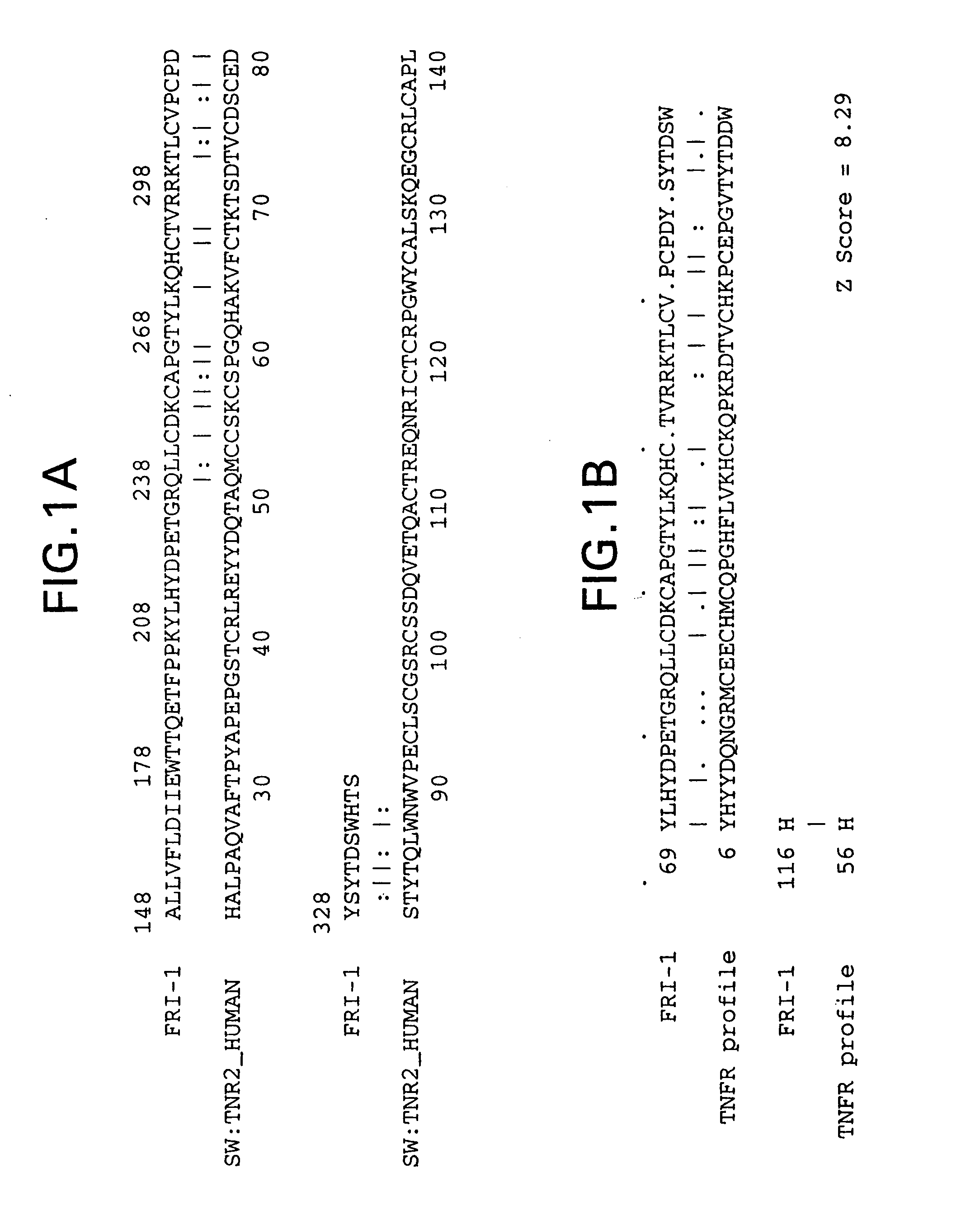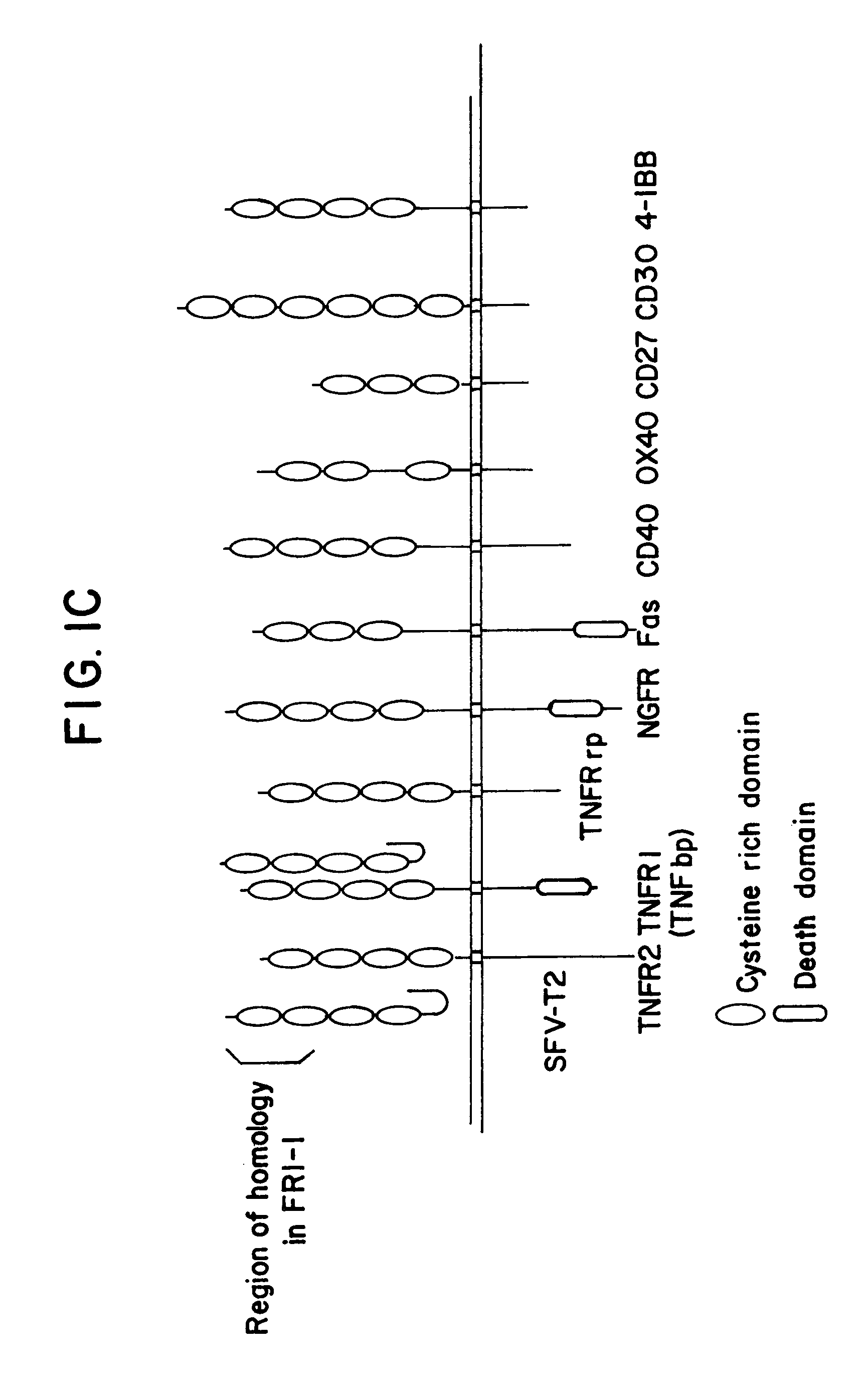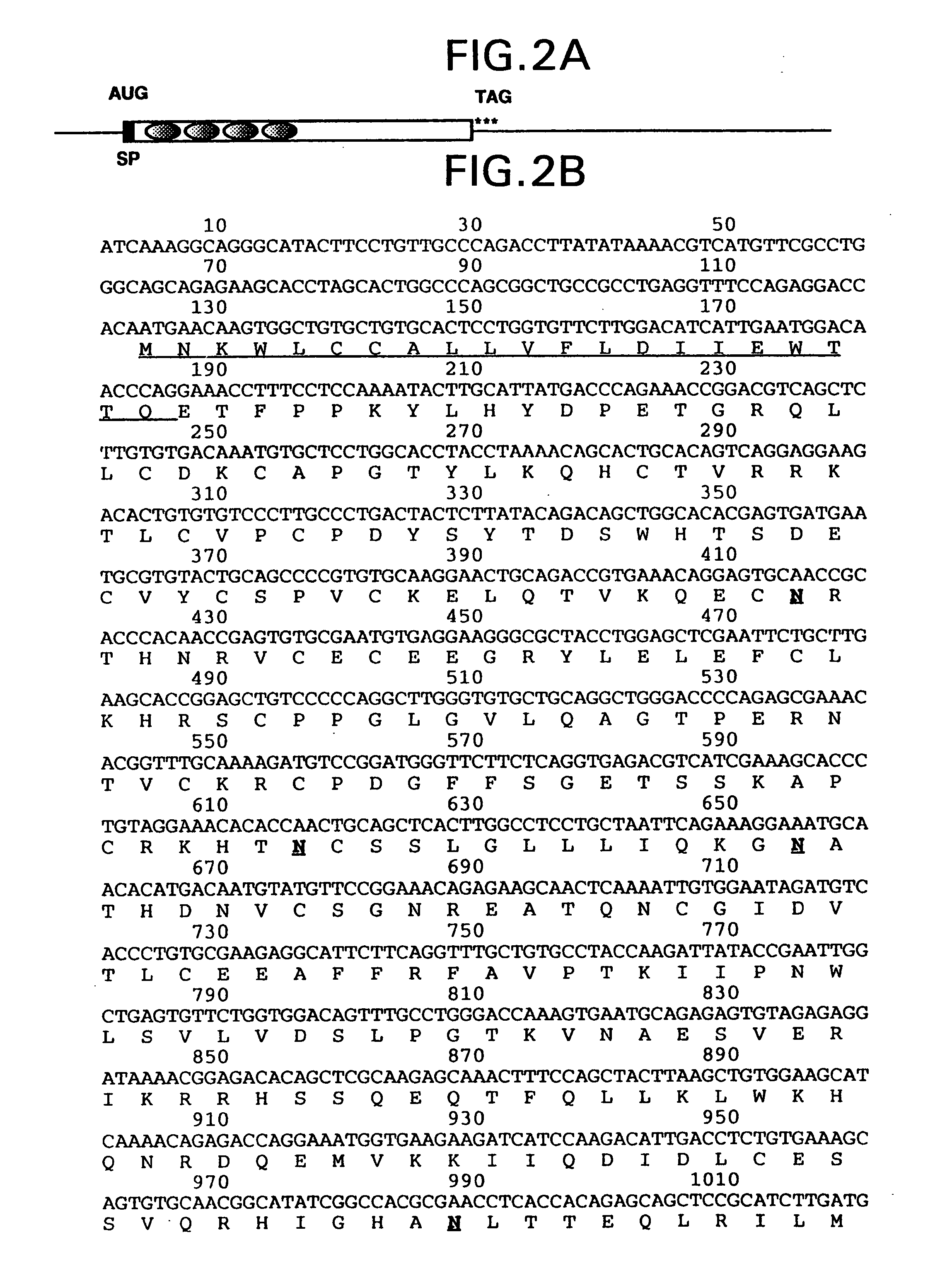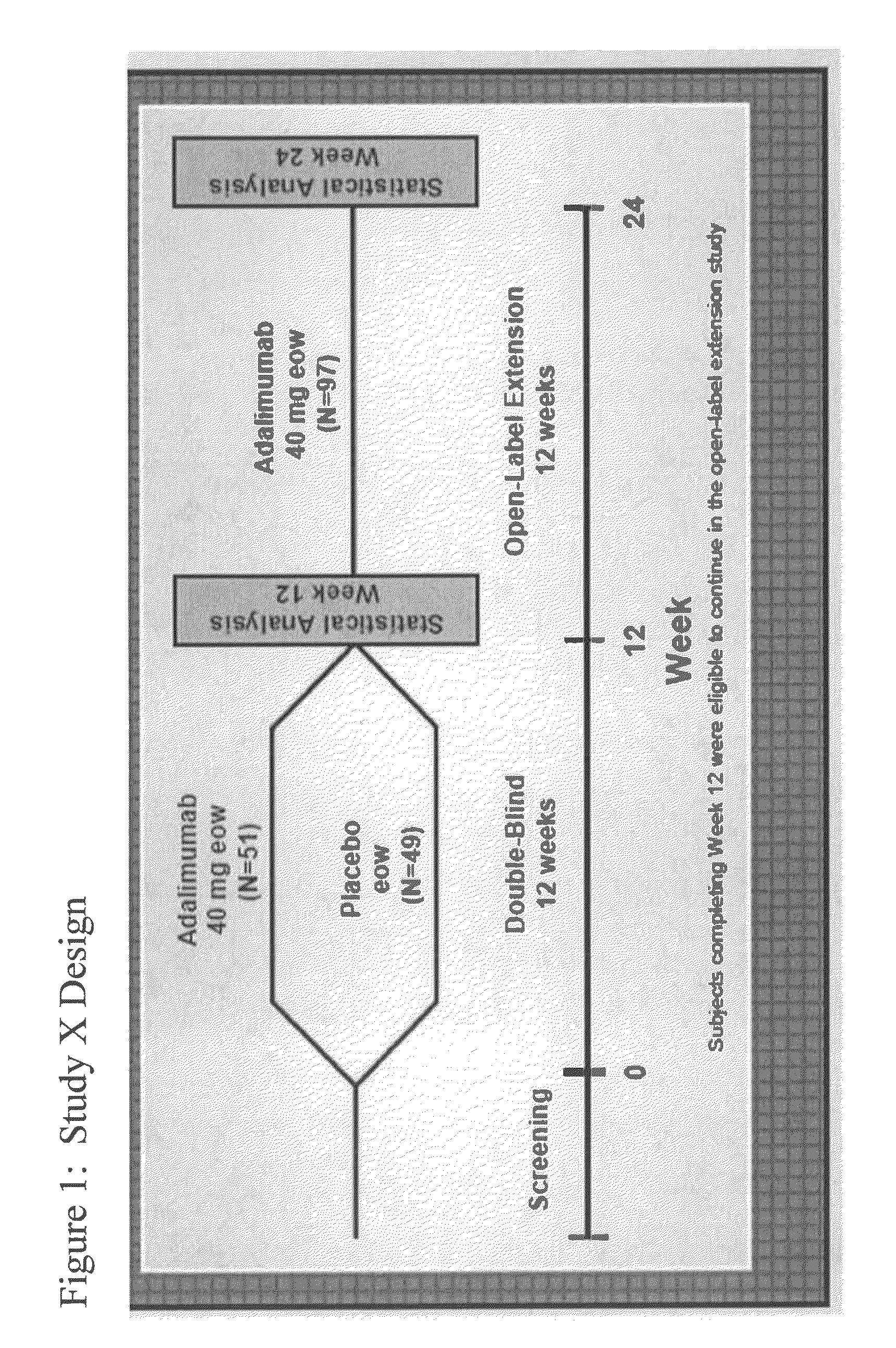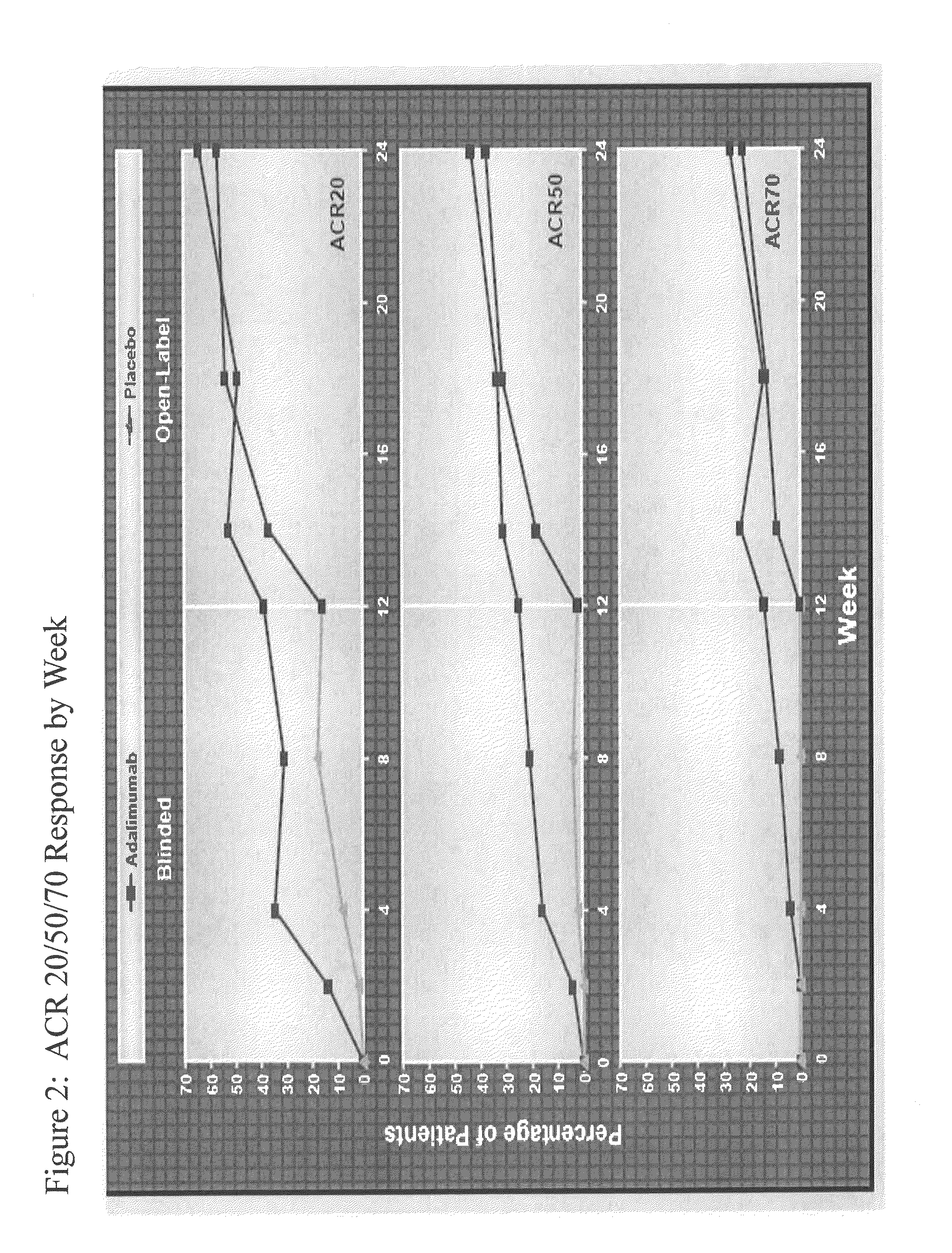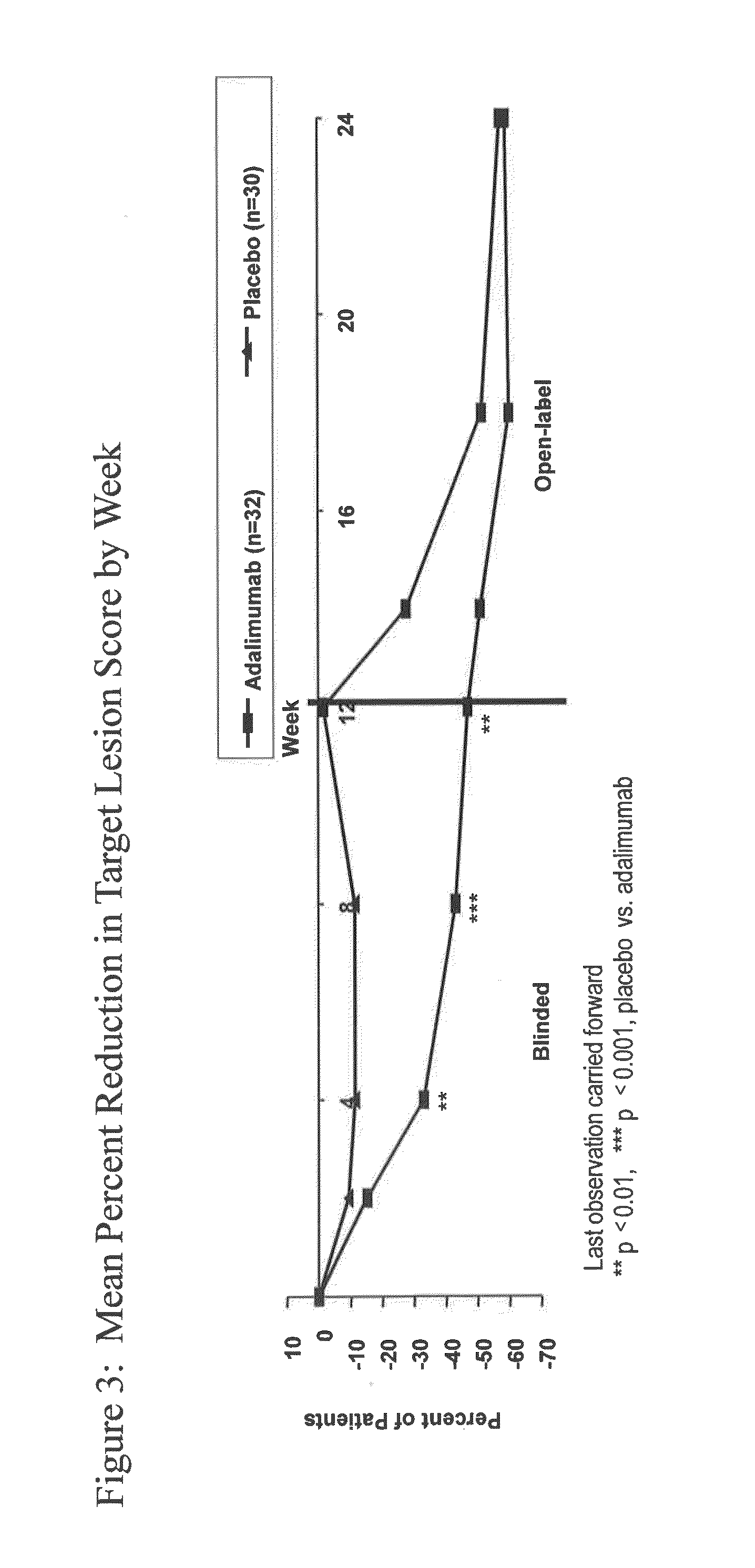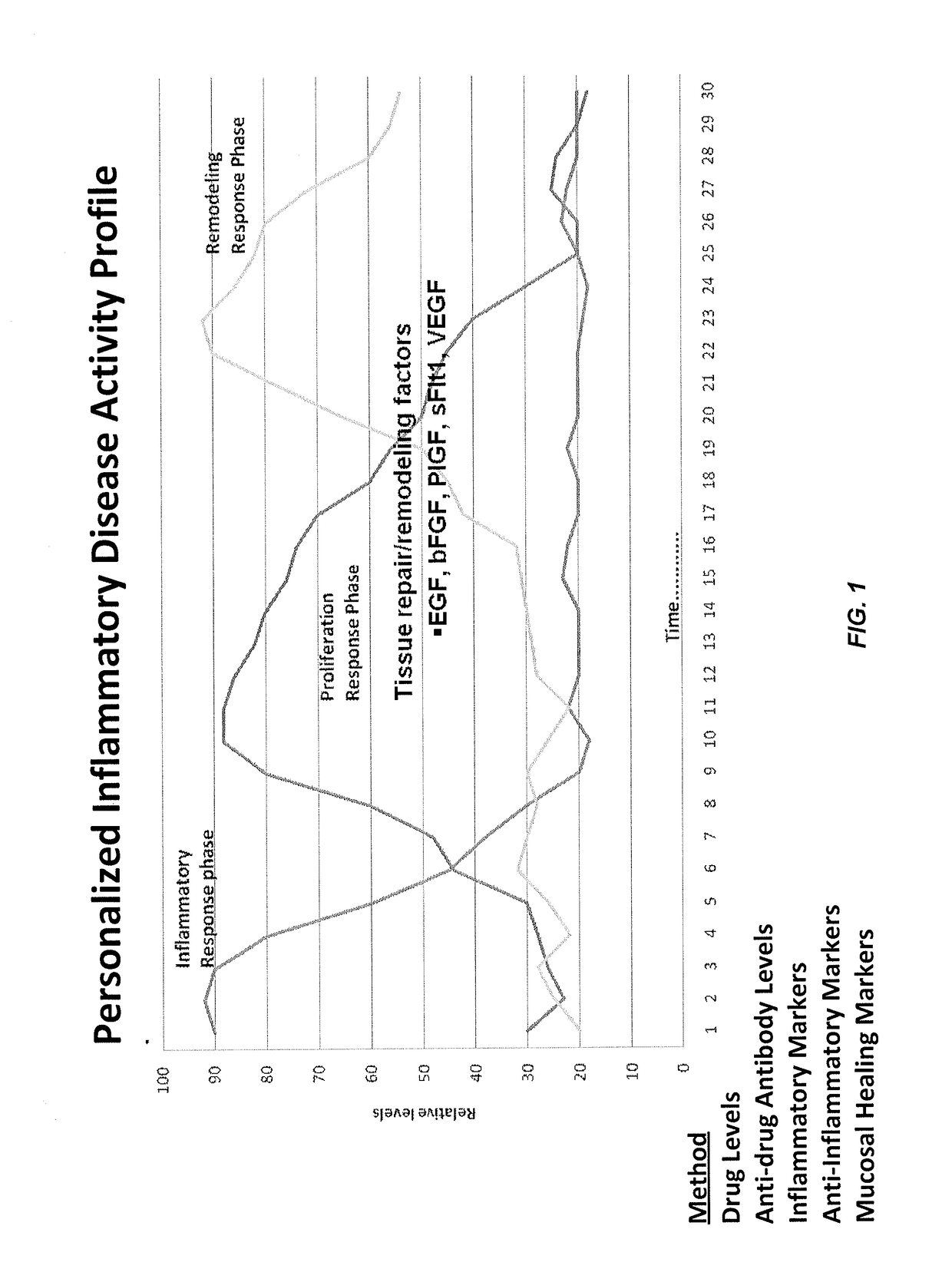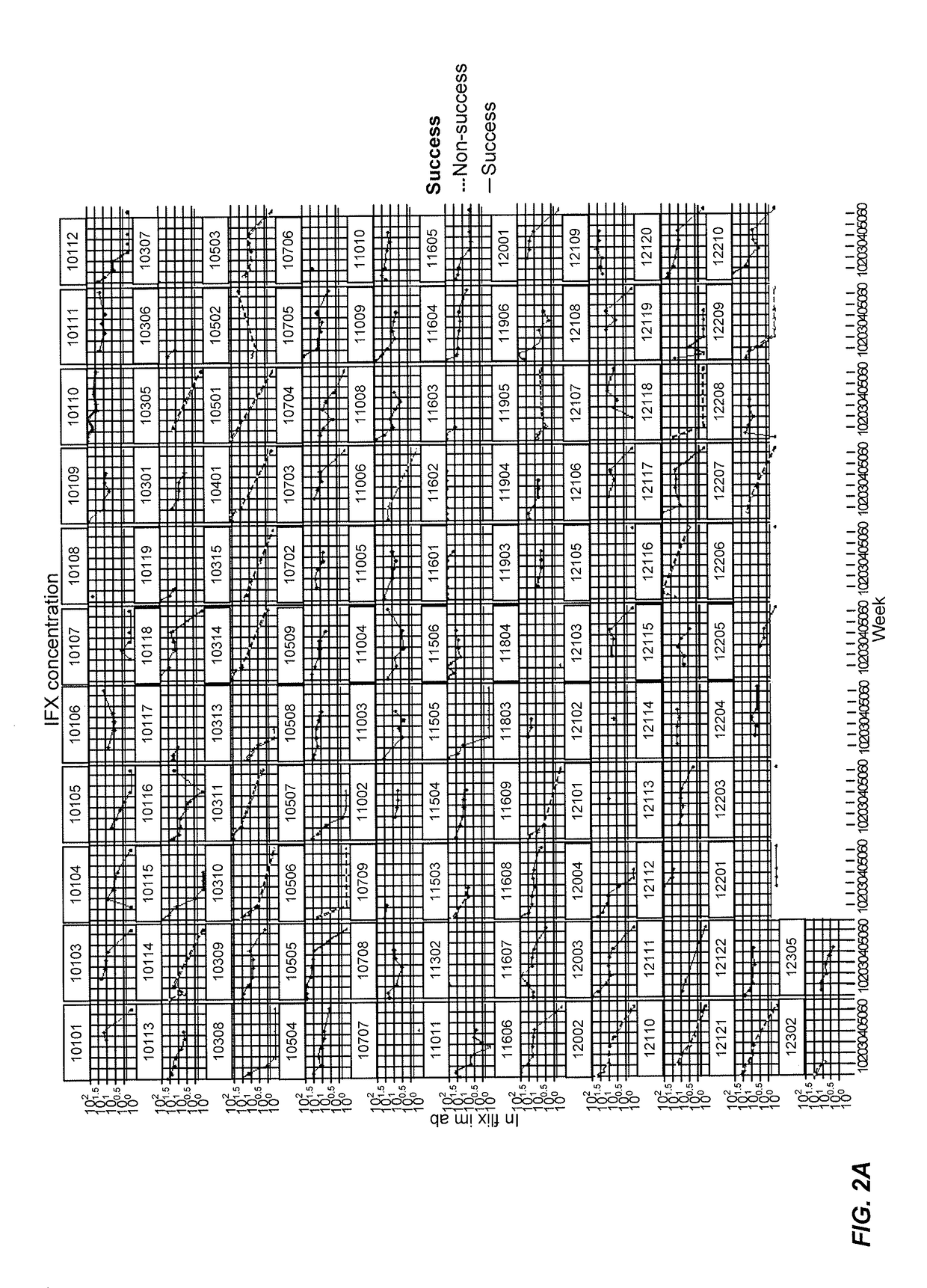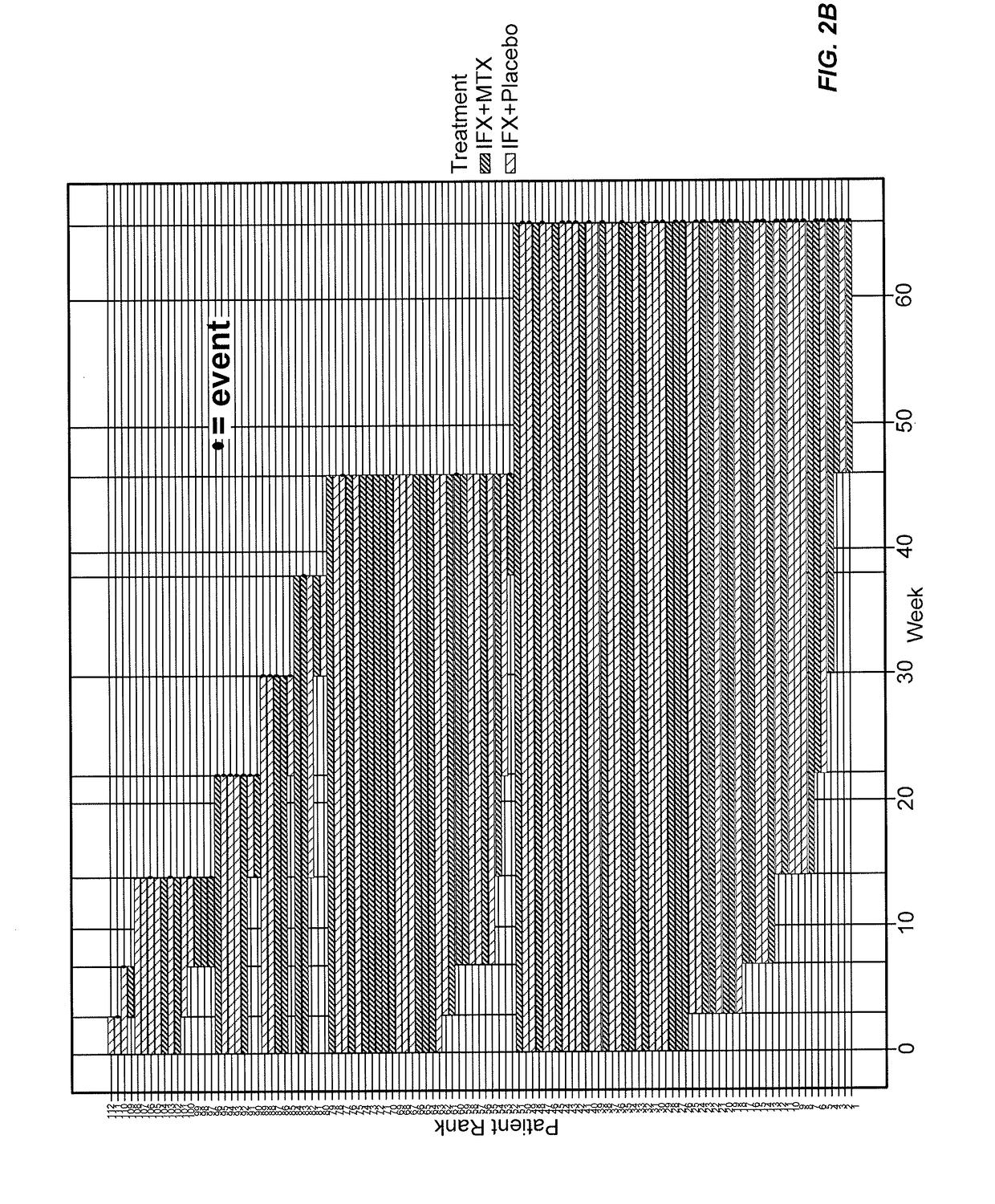Patents
Literature
62 results about "Tnfα inhibitors" patented technology
Efficacy Topic
Property
Owner
Technical Advancement
Application Domain
Technology Topic
Technology Field Word
Patent Country/Region
Patent Type
Patent Status
Application Year
Inventor
Methods and compositions for pulmonary administration of a TNFa inhibitor
The invention describes methods of pulmonary delivery of a TNFα inhibitor to a subject having a disorder in which TNFα is detrimental, such that the disorder is treated. Also included is a method of achieving systemic circulation of a TNFα inhibitor in a subject comprising administering the TNFα inhibitor to the central lung region or the peripheral lung region of the subject via inhalation, such that systemic circulation of the TNFα inhibitor is achieved.
Owner:ABBVIE BIOTECHNOLOGY LTD
Multiple-variable dose regimen for treating TNFalpha-related disorders
ActiveUS20060009385A1Reduce decreaseIncrease the areaBiocideOrganic active ingredientsDosing regimenRegimen
Multiple-variable dose methods for treating TNFα-related disorders, including Crohn's disease and psoriasis, comprising administering TNFα inhibitors, including TNFα antibodies, are described. Multiple-variable dose methods include administration of a TNF-inhibitor in an induction or loading phase followed by administration of the agent in a maintenance or treatment phase, wherein the TNF-inhibitor is administered in a higher dosage during the induction phase.
Owner:ABBVIE BIOTECHNOLOGY LTD
Uses and compositions for treatment of rheumatoid arthritis
ActiveUS20080166348A1Relieve symptomsInhibit progressSsRNA viruses negative-senseBiocideAntigen bindingRheumatoid arthritis
The invention provides methods, uses and compositions for the treatment of rheumatoid arthritis. The invention describes methods and uses for treating rheumatoid arthritis wherein a TNFα inhibitor, such as a human TNFα antibody, or antigen-binding portion thereof. Also described are methods for determining the efficacy of a TNFα inhibitor for treatment of rheumatoid arthritis in a subject.
Owner:ABBVIE BIOTECHNOLOGY LTD
Uses and compositions for treatment of rheumatoid arthritis
InactiveUS20080131374A1Improve the quality of lifeBiocideAntipyreticAntigen bindingEarly rheumatoid arthritis
The invention provides methods, uses and compositions for the treatment of rheumatoid arthritis. The invention describes methods and uses for treating rheumatoid arthritis wherein a TNFα inhibitor, such as a human TNFα antibody, or antigen-binding portion thereof. Also described are methods for determining the efficacy of a TNFα inhibitor for treatment of rheumatoid arthritis in a subject.
Owner:MEDICH JOHN R +7
Uses and compositions for treatment of juvenile rheumatoid arthritis
InactiveUS20080118496A1Prevent outbreakTreatment safetyLarge containersAntibody ingredientsMedicineAntigen binding
The invention provides methods, uses and compositions for the treatment of juvenile rheumatoid arthritis (JRA). The invention describes methods and uses for treating JRA, wherein a TNFα inhibitor, such as a human TNFα antibody, or antigen-binding portion thereof, is used to prevent flare-ups associated with JRA. Also described are methods for determining the efficacy of a TNFα inhibitor for treatment of JRA in a subject.
Owner:MEDICH JOHN R +4
Uses and compositions for treatment of ankylosing spondylitis
ActiveUS20090123378A1Treatment safetyImprove fatigueCompounds screening/testingAntibody ingredientsMedicineAnkylosing spondylitis
The invention provides methods, uses and compositions for the treatment of ankylosing spondylitis (AS). The invention describes methods and uses for treating ankylosing spondylitis, wherein a TNFα inhibitor, such as a human TNFα antibody, or antigen-binding portion thereof, is used to reduce signs and symptoms of ankylosing spondylitis in a subject. Also described are methods for determining the efficacy of a TNFα inhibitor for treatment of ankylosing spondylitis in a subject.
Owner:ABBVIE BIOTECHNOLOGY LTD
Methods and compositions for determining the efficacy of a treatment for ankylosing spondylitis using biomarkers
ActiveUS7919264B2Better assess improvements in the patient's disease statusUseful in treatingBioreactor/fermenter combinationsBiological substance pretreatmentsAnkylosing spondylitisAntigen binding
The invention provides a method for determining the efficacy of a TNFα inhibitor, such as a TNFα antibody, or an antigen-binding portion thereof, for treating ankylosing spondylitis (AS), using a collagen degradation biomarker and / or a synovitis biomarker.
Owner:AMERICAN TELEPHONE & TELEGRAPH CO +1
BIOMARKERS PREDICTIVE OF THE RESPONSIVENESS TO TNFalpha INHIBITORS IN AUTOIMMUNE DISORDERS
ActiveUS20090017472A1Prediction of responsivenessAntipyreticMicrobiological testing/measurementDiseaseAutoimmune responses
The invention provides methods for predicting responsiveness to TNFα inhibitors in a subject suffering from an autoimmune disorder, such as rheumatoid arthritis. The methods involve assaying for expression of one or more biomarkers in the subject that are predictive of responsiveness to TNFα inhibitors. A preferred biomarker of the invention is CD11c. The methods can further comprise selecting a treatment regimen with a TNFα inhibitor in an autoimmune disorder subject based upon expression of the biomarker(s) in the subject. The methods can further comprise administering a TNFα inhibitor to the subject according to the selected treatment regimen. Kits that include means for measuring expression of one or more biomarkers that are predictive of responsiveness to TNFα inhibitors for an autoimmune disorder are also provided. Methods of preparing and using databases, and computer program products therefore, for selecting an autoimmune disorder subject for treatment with a TNFα inhibitor are also provided.
Owner:ABBVIE INC
Methods for treating juvenile idiopathic arthritis
ActiveUS20090258018A1Raise countIncrease the number ofOrganic active ingredientsPharmaceutical delivery mechanismDosing regimenMedicine
The invention provides methods and compositions for the treatment of juvenile idiopathic arthritis (JIA) where a TNFα inhibitor, such as a human TNFα antibody, or antigen-binding portion thereof, is used to treat JIA. In particular, the invention is directed to methods and compositions relating to a fixed dosing regimen for treating JIA with a TNFα inhibitor.
Owner:ABBVIE BIOTECHNOLOGY LTD
Uses and compositions for treatment of psoriatic arthritis
InactiveUS20080311043A1Improve the quality of lifeTreatment safetyCompounds screening/testingPeptide/protein ingredientsAntigen bindingPsoriasis arthropathy
The invention provides methods, uses and compositions for the treatment of psoriatic arthritis. The invention describes methods and uses for treating psoriatic arthritis, wherein a TNFα inhibitor, such as a human TNFα antibody, or antigen-binding portion thereof, is used to psoriatic arthritis in a subject. Also described are methods for determining the efficacy of a TNFα inhibitor for treatment of psoriatic arthritis in a subject.
Owner:HOFFMAN REBECCA S +7
Uses and compositions for treatment of ankylosing spondylitis
InactiveUS20100021451A1Treatment safetyImprove fatigueNervous disorderAntipyreticMedicineAnkylosing spondylitis
The invention provides methods, uses and compositions for the treatment of ankylosing spondylitis (AS). The invention describes methods and uses for treating ankylosing spondylitis, wherein a TNFα inhibitor, such as a human TNFα antibody, or antigen-binding portion thereof, is used to reduce signs and symptoms of ankylosing spondylitis in a subject. Also described are methods for determining the efficacy of a TNFα inhibitor for treatment of ankylosing spondylitis in a subject.
Owner:WONG ROBERT L
Methods and compositions for diagnosing ankylosing spondylitis using biomarkers
ActiveUS20070172897A1Low costBetter assess improvements in the patient's disease statusBioreactor/fermenter combinationsBiological substance pretreatmentsAnkylosing spondylitisAntigen binding
The invention provides a method for determining the efficacy of a TNFα inhibitor, such as a TNFα antibody, or an antigen-binding portion thereof, for treating ankylosing spondylitis (AS), using a collagen degradation biomarker and / or a synovitis biomarker.
Owner:AMERICAN TELEPHONE & TELEGRAPH CO +1
Multiple-variable dose regimen for treating TNFa-related disorders
InactiveUS20090304682A1Reducing remissionReducing signOrganic active ingredientsPeptide/protein ingredientsDosing regimenRegimen
Owner:ABBVIE BIOTECHNOLOGY LTD
Methods and compositions for treating bone loss
The invention provides methods and compositions for treating, e.g., reducing, bone loss, e.g., cortical bone loss, comprising administering a TNFα inhibitor, such as a human TNFα antibody, or antigen-binding portion thereof.
Owner:ABBVIE BIOTECHNOLOGY LTD
Methods and compositions for predicting responsiveness to treatment with tnf-alpha inhibitor
The invention provides methods of determining or predicting the responsiveness of a subject to treatment with a TNFα inhibitor, such as a TNFα antibody by determining genetic factors.
Owner:ABBVIE BIOTECHNOLOGY LTD
Uses and compositions for treatment of rheumatoid arthritis
InactiveUS20120171123A1Improve the quality of lifeOrganic active ingredientsAntipyreticAntigen bindingEarly rheumatoid arthritis
The invention provides methods, uses and compositions for the treatment of rheumatoid arthritis. The invention describes methods and uses for treating rheumatoid arthritis wherein a TNFα inhibitor, such as a human TNFα antibody, or antigen-binding portion thereof. Also described are methods for determining the efficacy of a TNFα inhibitor for treatment of rheumatoid arthritis in a subject.
Owner:MEDICH JOHN R +7
Uses and compositions for treatment of hidradenitis suppurativa (HS)
ActiveUS20110300151A1Treatment safetyStrong specificityAntipyreticAutomatic syringesAntigen bindingHidradenitis suppurativa
The invention provides methods, uses and compositions for the treatment of hidradenitis suppurativa. The invention describes methods and uses for treating hidradenitis suppurativa, wherein a TNFα inhibitor, such as a human TNFα antibody, or antigen-binding portion thereof, is used to treat hidradenitis suppurativa in a subject. Also described are methods for determining the efficacy of a TNFα inhibitor for treating hidradenitis suppurativa in a subject.
Owner:ABBVIE BIOTECHNOLOGY LTD
Uses and compositions for treatment of psoriasis and crohn's disease
InactiveUS20120282262A1Maintaining remission of Crohn's diseaseDigestive systemAntibody ingredientsCrohn's diseaseAntigen binding
The invention provides methods, uses and compositions for the treatment of psoriasis or Crohn's disease. The invention describes methods and uses for treating psoriasis or Crohn's disease, wherein a TNFα inhibitor, such as a human TNFα antibody, or antigen-binding portion thereof, is used to treat psoriasis in a subject. The invention includes methods of improving patient reported outcomes using a human human TNFα antibody, or antigen-binding portion thereof, for the treatment of Crohn's or psoriasis. The invention also provides methods of improving fatigue or depression in patients having Crohns'.
Owner:OKUN MARTIN M +5
Antiangiogenesis therapy of autoimmune disease in patients who have failed prior therapy
InactiveUS20060134111A1Reduce riskAntipyreticAnalgesicsAngiogenesis AntagonistsAntiangiogenesis Therapy
The present application describes therapy with angiogenesis antagonists such as anti-VEGF antibodies. In particular, the application describes the use of such antagonists to treat autoimmune disease in a patient who has failed prior treatment such as treatment with DMARDs or TNFα-inhibitors.
Owner:GENENTECH INC
Therapy of autoimmune disease in a patient with an inadequate response to a tnf-alpha inhibitor
The present application describes therapy with antagonists which bind to B cell surface markers, such as CD20. In particular, the application describes the use of such antagonists to treat autoimmune disease in a mammal who experiences an inadequate response to a TNFα-inhibitor.
Owner:GENENTECH INC
Methods of treating moderate to severe hidradenitis suppurativa with anti-TNF-alpha antibodies
ActiveUS8747854B2Treatment safetyStrong specificityAntipyreticAutomatic syringesAntigen bindingHidradenitis suppurativa
The invention provides methods, uses and compositions for the treatment of hidradenitis suppurativa. The invention describes methods and uses for treating hidradenitis suppurativa, wherein a TNFα inhibitor, such as a human TNFα antibody, or antigen-binding portion thereof, is used to treat hidradenitis suppurativa in a subject. Also described are methods for determining the efficacy of a TNFα inhibitor for treating hidradenitis suppurativa in a subject.
Owner:ABBVIE BIOTECHNOLOGY LTD
Methods for determining Anti-drug antibody isotypes
ActiveUS20130344621A1Convenient treatmentLow toxicityComponent separationBiological testingAntiendomysial antibodiesAssay
The present invention provides assay methods for the determination of one or more anti-drug antibody (ADA) isotypes in a sample. As a non-limiting example, the assays of the present invention are particularly useful for determining different ADA isotypes in samples from ADA-positive patients receiving an anti-TNFα drug such as REMICADE™ (infliximab) or HUMIRA™ (adalimumab). The present invention also provides methods for optimizing therapy and / or reducing toxicity in subjects receiving TNFα inhibitors for the treatment of TNFα-mediated disease or disorders.
Owner:PROMETHEUS LAB
Methods of disease activity profiling for personalized therapy management
ActiveUS20140141983A1Prediction of responsivenessImprove therapeutic managementMicrobiological testing/measurementLibrary screeningTreatment effectDisease activity
The present invention provides methods for personalized therapeutic management of a disease in order to optimize therapy and / or monitor therapeutic efficacy. In particular, the present invention comprises measuring an array of one or a plurality of biomarkers at a plurality of time points over the course of therapy with a therapeutic agent to determine a mucosal healing index for selecting therapy, optimizing therapy, reducing toxicity, and / or monitoring the efficacy of therapeutic treatment. In certain instances, the therapeutic agent is a TNFα inhibitor for the treatment of a TNFα-mediated disease or disorder.
Owner:PROMETHEUS LAB
Combination therapy for conditions leading to bone loss
InactiveUS7005413B1Increase bone densityPromoting bone accumulationPeptide/protein ingredientsAntibody mimetics/scaffoldsCombined Modality TherapyTumor necrosis factor receptor
The present invention discloses a novel secreted polypeptide, termed osteoprotegerin, which is a member of the tumor necrosis factor receptor superfamily and is involved in the regulation of bone metabolism. Also disclosed are nucleic acids encoding osteoprotegerin, polypeptides, recombinant vectors and host cells for expression, antibodies which bind OPG, and pharmaceutical compositions. The polypeptides are used to treat bone diseases characterized by increased resorption such as osteoporosis. Methods of treatment are described using the polypeptides in conjunction with various agents, including IL-1 inhibitors, TNF-α inhibitors, and serine protease inhibitors.
Owner:AMGEN INC
Therapy of autoimmune disease in a patient with an inadequate response to a TNF-alpha inhibitor
The present application describes therapy with antagonists which bind to B cell surface markers, such as CD20. In particular, the application describes the use of such antagonists to treat autoimmune disease in a mammal who experiences an inadequate response to a TNFα-inhibitor.
Owner:GENENTECH INC
Low dose methods for treating disorders in which TNFα activity is detrimental
A method of treating TNFα disorders is described, wherein the method comprises administering a low dose amount of a TNFα inhibitor.
Owner:ABBVIE BIOTECHNOLOGY LTD
Long acting trial receptor agonists for treatment of autoimmune diseases
ActiveUS20150259397A1Increasing apoptosis of pro-inflammatory immune cellsShorten the progressPeptide/protein ingredientsAntipyreticDiseaseRegulatory T cell
Methods of treating an autoimmune disease such as rheumatoid arthritis, methods of increasing apoptosis of pro-inflammatory immune cells or synoviocytes, methods of increasing the quantity of the anti-inflammatory regulatory T cells, and methods of slowing the progression of inflammation in a subject include systemically administering to the subject a pharmaceutical composition including an effective amount of a TRAIL-conjugate. Preferably, the TRAIL-conjugate is effective for at least 3 days, more preferably at least 7 days, without being part of a nanocomplex that modulates the circulation half-life or release kinetics of the TRAIL-conjugate. Combination therapies including administering a second active agent, most preferably a TNF-α inhibitor, as well as pharmaceutical composition dosage units including a TRAIL-conjugate and a TNF-α inhibitor in an effective amount for a single once weekly dose for treatment of rheumatoid arthritis are also provided.
Owner:D&D PHARMATECH INC
Combination therapy for conditions leading to bone loss
InactiveUS20050147611A1Peptide/protein ingredientsAntibody mimetics/scaffoldsCombined Modality TherapyTumor necrosis factor receptor
The present invention discloses a novel secreted polypeptide, termed osteoprotegerin, which is a member of the tumor necrosis factor receptor superfamily and is involved in the regulation of bone metabolism. Also disclosed are nucleic acids encoding osteoprotegerin, polypeptides, recombinant vectors and host cells for expression, antibodies which bind OPG, and pharmaceutical compositions. The polypeptides are used to treat bone diseases characterized by increased resorption such as osteoporosis. Methods of treatment are described using the polypeptides in conjunction with various agents, including IL-1 inhibitors, TNF-α inhibitors, and serine protease inhibitors.
Owner:AMGEN INC
Uses and compositions for treatment of psoriatic arthritis
InactiveUS20140248215A1Improve the quality of lifeTreatment safetyCompounds screening/testingImmunoglobulins against cytokines/lymphokines/interferonsAntigen bindingPsoriasis arthropathy
The invention provides methods, uses and compositions for the treatment of psoriatic arthritis. The invention describes methods and uses for treating psoriatic arthritis, wherein a TNFα inhibitor, such as a human TNFα antibody, or antigen-binding portion thereof, is used to psoriatic arthritis in a subject. Also described are methods for determining the efficacy of a TNFα inhibitor for treatment of psoriatic arthritis in a subject.
Owner:HOFFMAN REBECCA S +7
Methods of disease activity profiling for personalized therapy management
ActiveUS10086072B2Improve therapeutic managementReducing and minimizing riskMicrobiological testing/measurementAntibody ingredientsPersonalizationTherapeutic effect
The present invention provides methods for personalized therapeutic management of a disease in order to optimize therapy and / or monitor therapeutic efficacy. In particular, the present invention comprises measuring an array of one or a plurality of biomarkers at a plurality of time points over the course of therapy with a therapeutic agent to determine a mucosal healing index for selecting therapy, optimizing therapy, reducing toxicity, and / or monitoring the efficacy of therapeutic treatment. In certain instances, the therapeutic agent is a TNFα inhibitor for the treatment of a TNFα-mediated disease or disorder.
Owner:PROMETHEUS LAB
Features
- R&D
- Intellectual Property
- Life Sciences
- Materials
- Tech Scout
Why Patsnap Eureka
- Unparalleled Data Quality
- Higher Quality Content
- 60% Fewer Hallucinations
Social media
Patsnap Eureka Blog
Learn More Browse by: Latest US Patents, China's latest patents, Technical Efficacy Thesaurus, Application Domain, Technology Topic, Popular Technical Reports.
© 2025 PatSnap. All rights reserved.Legal|Privacy policy|Modern Slavery Act Transparency Statement|Sitemap|About US| Contact US: help@patsnap.com
